Sites: news | india | latam | brasil | indonesia
Feeds: news | india | latam | brasil | indonesia
topic: Education
Social media activity version | Lean version
Hong Kong as a reef fish haven? These scientists want to get the word out
- For the past 10 years, marine biologist and conservationist Stan Shea has been leading a citizen-science program called the 114°E Hong Kong Reef Fish Survey to compile data on local reef fish species and raise awareness about the marine environment.
- The program relies on a core network of around 50 volunteer divers, who assist Shea with his mission to raise awareness about Hong Kong’s aquatic life.
- There are likely about 500 reef fish species in Hong Kong, but only about 460 have been identified so far; Shea and his team aim to find and document as many of the other overlooked as possible.
- Shea is also working on a photographic book about Hong Kong’s reef fish, which will be published in 2026.
Postponement of century-old Indian Science Congress sparks controversy
- Almost every year since 1914, the Indian Science Congress has brought together a wide range of scientists, academics, students and even Nobel laureates in an event that has been central to the development of science throughout India.
- This year, the Indian Science Congress was postponed amid reports of controversy between the organizing body and the Indian government.
- Meanwhile, the Indian Science Congress Association has been accused of politicizing the event in recent years and providing a platform for pseudoscience, sparking protests among many in the scientific community.
Guyana Amerindian communities fear Venezuela’s move to annex oil-rich region
- In Decemer, Venezuela’s president announced a series of measures and legislation to formalize the country’s possession of the oil-rich Essequibo region in Guyana, which he argues was stolen from Venezuela when the border was drawn more than a century ago.
- Venezuela has instructed the state’s oil and gas agencies to immediately grant operating licenses to explore and exploit oil, gas and mines in the Essequibo region, giving companies already operating in the area three months to leave.
- Amerindian communities in Guyana have raised concerns that Venezuela’s takeover may threaten decades-long battles for recognition of their customary lands and, in the process, endanger the region’s rich biodiversity.
Where do illegal lion parts come from? A new tool offers answers
- To trace wildlife parts to their source populations, researchers at the University of Illinois Urbana-Champaign developed a web tool, the Lion Localizer, which uses DNA testing to pinpoint the geographic source of contraband lion parts.
- Its creators say the DNA-based tool is a “valuable resource for combating lion poaching, by rapidly identifying populations that are newly targeted, or that are being targeted most aggressively by poachers.”
- Most of the illicit trade feeds demand from outside the continent; demand for lion parts is high in China and Southeast Asian countries like Laos and Vietnam.
- Despite being user-friendly, the Lion Localizer can sometimes fail to generate useful information in some cases, for example where there are multiple potential source populations or because the database used to generate matches is incomplete.
Conservationists look to defy gloomy outlook for Borneo’s sun bears
- Sun bears are keystone species, helping sustain healthy tropical forests. Yet they’re facing relentless challenges to their survival from deforestation, habitat degradation, poaching and indiscriminate snaring; fewer than 10,000 are thought to remain across the species’ entire global range.
- A bear rehabilitation program in Malaysian Borneo cares for 44 sun bears rescued from captivity and the pet trade and has been releasing bears back into the wild since 2015. But with threats in the wild continuing unabated, success has been mixed.
- A recent study indicates that as few as half of the released bears are still alive, demonstrating that rehabilitation alone will never be enough to tackle the enormous threats and conservation issues facing the bears in the wild.
- Preventing bears from being poached from the wild in the first place should be the top priority, experts say, calling for a holistic approach centered on livelihood support for local communities through ecotourism to encourage lifestyles that don’t involve setting snares that can kill bears.
Agroecology schools help communities restore degraded land in Guatemala
- The transformation of ancestral lands into intensive monoculture plantations has led to the destruction of Guatemala’s native forests and traditional practices, as well as loss of livelihoods and damage to local health and the environment.
- A network of more than 40 Indigenous and local communities and farmer associations are developing agroecology schools across the country to promote the recovery of ancestral practices, educate communities on agroecology and teach them how to build their own local economies.
- Based on the traditional “campesino a campesino” (from farmer to farmer) method, the organizations says it has improved the livelihoods of 33,000 families who use only organic farming techniques and collectively protect 74,000 hectares (182,858 acres) of forest across Guatemala.
One seed at a time: Lebanese project promotes agroecology for farmer autonomy
- Lebanese organic seed farm Buzuruna Juzuruna is on a mission, part of a growing network of agroecological efforts in the country, to change conventional farming through seed sharing and communal education.
- Despite its location in the Fertile Crescent, Lebanon today relies heavily on imports to feed its population due to economic collapse, conflicts and political upheaval.
- Buzuruna Juzuruna is using multiple efforts, including free classes, festivals and even circus performances to expose local farmers to older, more ecological methods of farming.
- In its work, Buzuruna Juzuruna emulates the ecosystems it treasures, by being open-source and horizontal in design.
Social media can be a bat’s best friend (commentary)
- Bats provide many ecosystem services, yet their populations are declining due to habitat loss, climate change, hunting, and disease.
- Social media allows conservationists to collect large amounts of data, study human-nature interactions, understand conservation debates and discussions, and increase the public’s knowledge of their conservation.
- Public engagement with bat-friendly social media posts may boost appreciation of these species, and can be an influential part of conservationists’ efforts to inform and inspire the public to participate in their conservation.
- This post is a commentary. The views expressed are those of the author, not necessarily of Mongabay.
From scarcity to abundance: The secret of the ‘peace farmers’ of Colombia
- During the 1990s, in Colombia’s Meta region, paramilitaries and guerrilla groups fought a bloody civil war. A main driver of conflict was the struggle for land. Wealthy elites, resisting popular demands for land reform, took violent control of large areas to breed cattle and grow cash crops for export.
- Meanwhile, a peasant university in Meta, established against the backdrop of the civil war, taught the rural population a different way of farming: offering up skills for living in peace with each other and in harmony with nature. Farmer and agronomist Roberto Rodríguez led the way.
- More than 7,000 students from all over Colombia have taken classes at La Cosmopolitana Foundation and spread its philosophy of sustainable, diversified agriculture, even influencing Amazon Indigenous groups. Nearly 200,000 people globally have witnessed La Cosmopolitana’s work in person.
- Several foundation graduates now live in the town of Lejanías, in a rural community they’ve transformed into Colombia’s “capital of abundance.” Here, farmers grow sustainably, sell locally made goods at a weekly organic market, and offer popular ecotours and accommodations at their farms.
PNG youths’ loss of tradition is bad news for hunting — but also for conservation
- For millennia, hunting has been a prestigious and traditional activity in many Papua New Guinean cultures.
- With an increase in Western education and economic opportunities, there’s been a decline in young Papua New Guineans’ skills in hunting and traditional ecological knowledge, a recent study suggests.
- This decline in hunting skills and loss of generational ecological knowledge may impact conservation efforts in the country, with researchers highlighting the need to maintain this knowledge.
‘Locals want their resources to last’: Q&A with marine ecologist Vilma Machava-António
- Ocean Revolution Mozambique (ORM), a recipient of the UNDP’s Equator Prize for 2022, promotes marine conservation in the East African nation by supporting Mozambican researchers in their quest for knowledge.
- “You cannot talk about ecosystem conservation without talking about people,” says Vilma Machava-António, a researcher who benefited from an ORM scholarship.
- The marine ecologist spoke to Mongabay about what attracted her to mangroves, the role these unique coastal systems play in climate adaptation, and what explains the success of some community-led efforts to preserve them.
- Mangroves stash carbon efficiently and are critical to adapting to climate impacts, especially in Mozambique, which is hit by cyclones with distressing frequency.
Indigenous Kogi worldview aims to change face of conservation for good
- The Indigenous Kogi of the Sierra Nevada of Santa Marta in northern Colombia have been saying for decades that non-Indigenous populations are destroying the Earth, but now they want to share their knowledge about how to save it.
- Today, they are part of the very first UNESCO BRIDGES project, which focuses on finding solutions coming from communities, rather than experts bringing their idea of solutions into communities, which has long been problematic.
- The new project, called Reviving Water: Munekan Masha (“let emerge or be born”), will be led by the Kogi, teaching scientists and education experts from various universities about their conservation methods.
- Both the Kogi and non-Indigenous experts will also help develop Indigenous conservation methods for school curricula, to help Western science broaden its outlook, experts say.
To get young Filipinos into farming, initiatives reach them via TikTok, school
- With the average farmer in the Philippines aged 53, and many discouraging their children from following in their footsteps, there are concerns that the country could soon face a critical shortage of people willing and able to produce the country’s food.
- Youth-led initiatives, such as Kids Who Farm and TikTok channel UrbanFarmerTV, are working to raise young people’s interest in sustainable farming techniques.
- Some lawmakers are also pushing to include agriculture studies in the high school curriculum.
Fires in the world’s largest wetland turns Brazilian farmers into firefighters
- Fires in 2020 ravaged an area larger than Belgium in the Brazilian Pantanal, the world’s largest tropical wetland, killing at least 17 million animals and leaving locals without water.
- Several initiatives by local nonprofits are taking on the challenge of protecting this unique region by educating residents about fire hazards and training Pantanal cattle ranchers as volunteer firefighters.
- Most of the 2020 fires in the Pantanal started on private farms, according to a study, underscoring the importance of training farmers to suppress flames before they surge into wildfires.
- Experts say fire alerts in the Pantanal are down by 91% so far this year compared to the same period in 2020, thanks to increased efforts by the state government and volunteer programs, as well as wetter weather.
In Indonesian Papua, a one-time gun trafficker now preaches permaculture
- The son of a soldier, Mbah Gimbal was once an illegal gun runner operating in various parts of Indonesia.
- After a year in jail, he embarked on a seven-year journey of spiritual enlightenment across Java on foot.
- Mbah Gimbal then migrated to Papua to start a new life, where, along with his wife and like-minded associates, he established a community education center and permaculture farm.
- Since then, he has taught hundreds of students and their parents the principles of permaculture and environmental conservation.
Farmer-to-farmer agroecology: Q&A with Chukki Nanjundaswamy of Amrita Bhoomi Learning Centre
- The Amrita Bhoomi Learning Centre in southern India is one of dozens of education hubs around the world providing a space for farmer-to-farmer training in agroecology.
- In a wide-ranging interview with Mongabay, the center’s Chukki Nanjundaswamy discusses their model of agriculture, its Gandhian roots, and how it grew out of the rejection of Green Revolution farming techniques that rely on chemical inputs and expensive hybrid seeds.
- Nanjundaswamy shares some of their innovative approaches to growing food without inputs, plus clever techniques to thwart notorious pests like fall armyworm, which is also prevalent in Africa.
Sri Lankan wins Linnean Medal, the ‘Nobel Prize for naturalists’ (commentary)
- Today the Linnean Medal was awarded at a London ceremony to the first Sri Lankan in its history: since 1888, the medal has been given annually to a botanist or a zoologist, or to one of each, in the same year.
- The list of winning scientists–from Alfred Wallace to Stephen Jay Gould–is long, yet the 2022 honoree in the zoology section is not a scientist in the formal sense, but rather a Sri Lankan author, educator and taxonomist, Rohan Pethiyagoda, who formerly served as deputy chair of the IUCN’s Species Survival Commission.
- “His impact on biodiversity research in Sri Lanka and beyond through his output and catalytic influence cannot be overestimated,” the award committee wrote, and the author of this commentary explains why this is so.
- This article is a commentary. The views expressed are those of the author, not necessarily Mongabay.
Teaching climate issues through gameplay gains a following in Brazil
- The Climate Fresk workshop, known in Brazil as the Climate Mural, is a teaching model created in France and replicated in more than 50 countries to disseminate science-based climate knowledge in an interactive setting.
- Its main teaching tool is a card game that allows participants to understand the cause-and-effect dynamics involved in climate change.
- The workshop is usually held at universities, high schools and government facilities, but a growing number of companies have asked to host workshops to train their employees on climate issues.
- In just three years, the global Climate Fresk initiative has trained 10,000 workshop facilitators and reached more than 300,000 participants around the world.
Field school teaches young Indigenous Indonesians how to care for their forests
- The Marena Indigenous group on the Indonesian island of Sulawesi are among a handful of communities who have obtained title to their ancestral forest following a landmark 2013 ruling by the nation’s Constitutional Court.
- For years the forest was managed by outside companies, but now Indigenous advocacy groups are training the community’s youths about the traditional ways of sustainably exploiting the forest and its resources.
- Organizers say the main goal of this field school program is to train the community’s young generation to be able to understand the forest and its potential.
- The community has used its power to terminate a contract with a sap production company that was originally brought in by the central government, striking a new deal with the company on more favorable terms.
Indonesian research center for medicinal plants displaces incense harvesters
- Incense harvesters in Indonesia’s North Sumatra province say the construction of a new center for research into medicinal plants threatens their livelihoods.
- The government says the center will boost Indonesia’s food and drug security, and maximizing the economic potential of Indonesia’s wealth of medicinal plants.
Guyanese project to bolster Indigenous land rights draws funding — and flak
- The Amerindian People’s Association (APA) in Guyana has received 252,500 euros ($285,300) in funding from the French government for a project to strengthen Indigenous councils and leaders in upholding the rights of Guyana’s Amerindian people.
- Land rights, and how titles should be awarded, remain a highly contested issue in the South American country, with one court case dragging on for 23 years without an end in sight.
- The funding hasn’t been universally welcomed, however, with some saying that NGOs like the APA “own no land and have no say in what happens in Amerindian communities.”
- The APA says its ultimate goal is pushing for a revision of Guyana’s 2006 Amerindian Peoples Act and calling for recognition of Indigenous traditional customary land rights.
Between land and sea: Agrobiodiversity holds key to health for Melanesian tribes
- Residents of Baniata village on the Solomon Islands’ Western province practice an ancient agroforestry system that intercrops 20 edible species and features the ngali nut, a delicacy sold in domestic and international markets.
- The community’s traditionally self-sufficient and biodiverse diet features 132 species, notably the fe’i banana, a Melanesian specialty that contains 100 times the vitamin A of a typical banana.
- The resilient food system and diet is increasingly affected by climate change, imported crops, processed foods, and the loss of traditional knowledge in younger generations.
- This article is one of an eight-part series showcasing Indigenous food systems covered in the most comprehensive FAO report on the topic to date.
You can move an elephant to the jungle, but it won’t stay there, study says
- Despite evidence that translocating “problem elephants” into protected forests to avoid conflict with humans can in fact exacerbate problems, it is still commonly practiced.
- A study published earlier this year revealed that elephants in Peninsular Malaysia prefer open, human-dominated landscapes over primary forests, casting further doubt over translocations, since relocated elephants will tend to gravitate back toward these “prime” habitats where conflict recurs.
- The study sparked renewed discussion among researchers on effective, long-term solutions to human-elephant conflict, the leading threat to Asian elephants, that avoid translocations.
- Experts say that people’s willingness to co-exist with elephants will be the most influential factor in the long-term survival of the species.
New checklist aims to tackle racism in conservation science in higher ed
- A new perspective piece published in Nature Ecology and Evolution outlines the history of racism in ecology, evolution and conservation biology (EECB) while also providing an actionable checklist for departments to create an anti-racist environment.
- Written by faculty, staff and students, the checklist is a comprehensive guide to help scientists if they don’t know where to start when creating a more inclusive space.
- It outlines changes that can be made in the classroom, research labs and departments to boost the representation of non-white students in EECB, which is lower than in other scientific fields.
- More departments in ecology, evolution and conservation are thinking and talking about how to create an anti-racist space.
Not just sea life: Migratory fish, birds and mammals also fall foul of plastic
- A new report from the U.N. Environment Programme and the Convention on the Conservation of Migratory Species of Wild Animals confirms that plastic pollution poses a major threat to land and freshwater migratory species.
- Mammals, birds and fish are affected through various means, including entanglement, ingestion of plastics, accumulation of microplastics in the food chain, and using plastics in nesting material.
- The report highlights that global capacity to manage plastic pollution is not keeping pace with projected growth in the plastics market.
- The authors call for measures that will ultimately drive change upstream to reduce the volume of plastics entering the marketplace.
It’s time to scrutinize who’s in the room when conservation decisions are made, says Laly Lichtenfeld
- Worldwide concern about injustice and inequity, the impacts of the pandemic, and the worsening effects of global environmental degradation has accelerated change in the conservation sector, a field that has historically been relatively slow to evolve.
- But for the shifts underway to be more than just a passing fad, many would argue that conservation requires fundamental structural changes that put more decision-making power in the hands of people who’ve been traditionally sidelined or ignored and recognize the importance of contributions from a wide range of stakeholders in achieving conservation outcomes.
- African People & Wildlife, a Tanzania-based NGO, has been working on these issues since its founding in 2005 by Laly Lichtenfeld and Charles Trout. Lichtenfeld says that conservation now must take “concrete action” to move forward.
- “Currently, there are big questions out there as to whether organizations and the global conservation culture will truly change or whether things will revert to the status quo,” she told Mongabay during a recent interview. “If the much-needed challenge is really taken on, well then again, we have a lot of work ahead on this—particularly in terms of scrutinizing who is in the room when conservation decisions are made, understanding and overcoming the power dynamics at play, and considering how we can better communicate with and listen to one another.”
Maleos bounce back in Sulawesi after villagers resolve to protect their eggs
- The maleo (Macrocephalon maleo), an endangered bird endemic to Sulawesi, Indonesia, lays a single gigantic egg in a hole that is then incubated solely by the geothermal heat in the sand or soil.
- Maleo eggs are prized as a high-status delicacy and are frequently dug up to be eaten or sold illegally online, consequently pushing maleo populations into rapid decline.
- Two community-led projects that protect maleo nesting grounds from poaching and ensure maleos can nest naturally have reported the first sustained increases in maleo numbers due to conservation efforts.
- The projects have quadrupled and tripled local maleo numbers over a 14-year and five-year period, respectively, and experts are calling for other maleo conservation projects across Sulawesi to adopt this community-led, low-intervention method.
‘I am Indigenous, not pardo’: Push for self-declaration in Brazil’s census
- Brazil’s 2010 census was the first to map out the presence of Indigenous people throughout the whole country, but still maintained the term pardo, for a mixed-race individual, that Indigenous activists say has long been used to render Indigenous identities “invisible.”
- The next census is due in 2022, and activists and leaders are mounting a campaign to get all Indigenous Brazilians to self-declare as Indigenous.
- Getting a more accurate picture of the number and distribution of Indigenous people, especially in urban areas, is key to informing public policies geared toward their specific needs, experts say.
- “Everything is Indigenous,” says Júlio César Pereira de Freitas Güató, one of the Indigenous leaders promoting the campaign. “All the rest is invasion.”
Podcast: Connecting kids and ourselves to nature
- On today’s episode of the Mongabay Newscast, we discuss the latest research showing how important it is to connect kids to nature and educate them about the environment.
- We’re joined by author and journalist Richard Louv, who created the ‘nature deficit disorder’ concept in 2005 to facilitate discussion of the impacts our disconnectedness from nature has on human health and wellbeing. His latest book is Our Wild Calling: How Connecting With Animals Can Transform Our Lives — and Save Theirs.
- We’re also joined by Megan Strauss, an editor with Mongabay Kids, who tells us about how the site delivers the news and inspiration from nature’s frontline for young readers and discusses the importance of environmental education.
In Rio de Janeiro, Indigenous people fight to undo centuries of erasure
- Rio de Janeiro holds a special place in Brazil’s history, but many of its residents are unaware of the city’s Indigenous heritage — from the names of iconic places like Ipanema and Maracanã, to the Indigenous slave labor that built some of its most recognizable structures.
- Nearly 7,000 Indigenous people live in Rio, the fourth-biggest population among Brazilian cities; a unique interactive map by Mongabay shows how they’re spread across the city, as well as their living conditions and ethnic groups.
- Despite their presence, and Rio’s famed diversity and laidback culture, Indigenous people in the city continue to face prejudice and a “silencing” of their traditions and culture that they attribute to centuries of efforts to erase them and make them invisible.
- But Indigenous people are pushing back, agitating to get their rights on the political agenda, and working through academia to unearth the Indigenous history of the city that has long been hidden.
In Boa Vista, Indigenous Brazilians retake their identity through education
- The city of Boa Vista near Brazil’s borders with Venezuela and Guyana is home to Indigenous groups whose ancestral range don’t recognize national boundaries, and who still continue to flow into Brazil from crisis-stricken Venezuela.
- The colonization of Boa Vista by Europeans forced the Indigenous inhabitants off their lands on the banks of the Rio Branco, and resentments simmer today over the return of some of those lands to the original owners.
- The land conflicts also killed off the use of the many ethnic languages spoken in the region, but community-led movements are seeking to bring them back, including in learning materials published by the local university.
- Higher education is seen as a life-changing opportunity for Indigenous students, not just for their personal growth but also for the avenues it opens up to advocate for and empower the wider Indigenous community.
Reckoning with elitism and racism in conservation: Q&A with Colleen Begg
- Long-running concerns about discrimination, colonial legacy, privilege, and power dynamics in conservation have come to the forefront with the recent resurgence of the social justice movement. But will this movement lead to lasting change in the sector?
- South African conservationist Colleen Begg says that meaningful transformation will require dedicated and sustained efforts to drive real change in conservation.
- Begg, who co-founded both the Niassa Carnivore Project in Mozambique and Women for the Environment, Africa, says that conservationists in positions of power need to open themselves to criticism and change, while creating pathways for new leaders and ideas to come forward.
- Begg spoke about these issues and more in a recent conversation with Mongabay founder Rhett A. Butler.
Researchers look to locals to fill knowledge gap on Philippine tarsier
- Philippine tarsiers (Carlito syrichta) are the poster child of the country’s burgeoning ecotourism industry, but little is known about their taxonomy, population size and conservation status.
- The findings of a new study suggest that tarsiers are being captured from the wild to supply tourism venues and the local pet trade, presenting a major threat to the species’ survival.
- Researchers say they hope educational programs that focus on changing local people’s perceptions of tarsiers and encouraging ecotourism in tarsiers’ natural habitat could help protect them.
A new environmental education site for kids
- Mongabay has released a beta version of a new education site to inspire and inform kids on ecology, wildlife, and conservation. The new site is located at kids.mongabay.com.
- Mongabay Kids includes environmental news articles, lessons, and activities geared toward specific age groups, from elementary to middle school. The site leverages content from Mongabay’s main news site and extensive library of nature photos.
- The site’s creators, biologists Megan Strauss and David Brown, spoke with Mongabay about the project.
Teachers create lasting change for people and primates via clean cookstoves (commentary)
- Kibale National Park has the highest diversity of primates in the world and 300+ species of birds, but wildlife are threatened by habitat degradation from activities like firewood collection.
- Fuel-efficient cookstoves can be used to reduce wood consumption, improve cook times, and mitigate smoke inhalation associated with cooking on open fires.
- Many such projects fail over time, but a new project involves the multiplicative effect of involving teachers in educating the community about their usefulness, since a single teacher can influence many students.
- This article is a commentary and the views expressed are those of the author, not necessarily Mongabay.
Honoring children and protecting the planet: An interview with musician Raffi
- If you were born in the 1970s, 1980s, or 1990s in the United States or Canada, there’s a good chance you are familiar with the song “Baby Beluga.” The song, which is about a young whale swimming in the ocean with its mother, was written by Raffi Cavoukian.
- That was a big hit, but Raffi turned down lucrative opportunities to commercialize the song and convert it into a franchise. Decisions like that reflect Raffi’s deeper concern about the well-being of children, which extends to the environment upon which they depend.
- In the 40 years since “Baby Beluga” was released, Raffi has developed a comprehensive philosophy on how to create a “humane and sustainable world by addressing the universal needs of children.”
- Raffi discussed these issues and more during a November 2020 interview with Mongabay Founder Rhett A. Butler.
In the Horn of Africa, conflict and illegal trade create a ‘cheetah hell’
- Wild cheetahs are under intense pressure in the Horn of Africa due to human-wildlife conflicts and illegal trade, which takes about 300 cubs from the region each year, conservationists say.
- In Somaliland, a country ravaged by climate change-induced drought, nomadic farmers will often kill or chase away cheetahs threatening their livestock, and either keep their cubs as pets or attempt to sell them to traders.
- While the international trade of cheetahs is banned under CITES, animals continue to be smuggled from the Horn of Africa to the Middle East, via a well-established trade route between Somaliland and Yemen.
- In addition to rescuing and providing long-term care for wild cheetahs, the Cheetah Conservation Fund and Somaliland’s Ministry of Environment and Rural Development are working to develop an education program that promotes coexistence between farmers and cheetahs.
80 percent of conservation careers negatively affected by COVID pandemic (commentary)
- A survey of 330 conservationists and 67 conservation employers in March/April 2020 shows that nearly 80% of conservationists have been negatively impacted by COVID-19, while about nine in ten employers have been impacted.
- Despite these challenges, COVID-19 could create new opportunities to re-write our planet’s future if we heed warnings, remain optimistic, and focus our efforts as a conservation community.
- COVID-19 also shows the speed and scale of changes governments around the globe can take to tackle threats. Conservation Careers argues issues such as biodiversity loss and climate change should be taken as seriously.
- This post is a commentary. The views expressed are those of the authors, not necessarily Mongabay.
Hanging with Romi: Get to know our camera trap expert and host of Candid Animal Cam
- Romina Castagnino is the host of our new video series that features camera trap footage of wildlife behavior
- Candid Animal Cam episodes are published every Tuesday and they share a wide variety of facts and footage of fascinating animals like tapirs and spectacled bears
- Trained as a conservation biologist, Romi has used camera traps extensively in her wildlife studies and shares this knowledge in each episode
- Teachers and parents with students at home are invited to view these videos with kids, and to use the links provided to learn more about each animal, every Tuesday
For Philippines’ displaced indigenous students, COVID-19 is one of many threats
- Students from indigenous communities in Mindanao who moved to Manila to evade armed conflict that forced their schools shut now face a new threat from the lockdown imposed in response to the coronavirus pandemic.
- Access to adequate health services has always been a challenge for indigenous communities in their homelands but displacement puts them at higher risk of contracting diseases like COVID-19.
- Despite the pandemic, displaced indigent students remain focused on their education, seeing it as a way to protect their ancestral lands no matter how far they are from home.
- Land disputes have abounded amid an escalation in armed conflict between government security forces and rebel groups in Mindanao, placing local communities and indigenous schools in the crossfire and forcing them to flee from their ancestral lands.
Overworked, underpaid and lonely: Conservationists find a new community online
- Created by a 26-year-old Australian, a new online community called Lonely Conservationists is bringing together young and struggling conservationists.
- Members post about their experiences, including unpaid jobs, financial woes, mental health issues, and, of course, loneliness.
- The community has succeeded in creating a space for candid, sympathetic conversations about the difficulties of working in conservation.
Audio: Fred Swaniker on conservation as an economic growth opportunity for Africa
 On today’s episode of the Mongabay Newscast, we speak with Fred Swaniker, the founder of the African Leadership University, which recently launched a School of Wildlife Conservation to help young Africans develop the skills and knowledge necessary to “own and drive” the conservation agenda on the African continent. Listen here: Africa is facing some […]
On today’s episode of the Mongabay Newscast, we speak with Fred Swaniker, the founder of the African Leadership University, which recently launched a School of Wildlife Conservation to help young Africans develop the skills and knowledge necessary to “own and drive” the conservation agenda on the African continent. Listen here: Africa is facing some […]
Microplastics may be a macro problem for the U.S. Great Plains, too, study finds
- Though often thought of as chiefly a marine pollution issue, a new study has found microplastics in every freshwater body tested in Kansas.
- The results were published in a peer reviewed paper which was produced through an innovative collaboration between freshman students and their professor.
- As well as giving the students new insights into the issue of microplastics, writing and publishing the paper was a new perspective on the process of peer-review, one that often seems inaccessible to undergraduates.
- “When I saw my name on that fully written and polished paper, ready to get published, I was really proud to have been a part of it,” one of the undergraduate authors told Mongabay.
Can a national management plan halt Madagascar’s shark decline?
- Sharks once were plentiful in Madagascar’s waters, but a spike in demand for shark fins dating to the 1980s has led to heavy exploitation and a reduction in the fishes’ abundance and size.
- Madagascar has no national laws that specifically protect sharks. In June, though, the country released a new national plan for the sustainable management of sharks and rays.
- The plan calls for a shark trade surveillance program, a crackdown on illegal industrial fishing, more “no-take” zones, and a concerted effort to collect better data.
- Conservationists welcomed the plan as an important step — provided the country can enforce its provisions.
As birds winter in Sri Lanka, one enthusiast makes sure their memory stays
- As migratory birds of all shapes and shades start flocking to Sri Lanka for the northern hemisphere winter, prominent local environmental lawyer and naturalist Jagath Gunawardena prepares to once again go bird-watching and sketching.
- Sri Lanka is home to 439 bird species, 33 of them found nowhere else on Earth, including breeding residents and migratory species.
- The island offers varying microclimates and habitats that provide a temporary refuge for the roughly 200 visiting species, though over the years, declining forest cover has impacted the distribution pattern of both resident and migratory species.
- Gunawardena, who has been recognized by the state for his contributions to wildlife conservation and even had a new frog species named after him, has called for greater research and conservation efforts for some of the migratory birds that call Sri Lanka home.
Education, compensation, and spiritual outreach protect threatened whale sharks
- In the 1980s and 90s, whale sharks were being killed in their hundreds off the western coast of India. Demand for the shark’s fins and meat in south-east Asia meant a fisherman could earn as much as $7,000 for a large shark.
- In 2001, India declared the whale shark a protected species. In 2004, the Whale Shark Conservation Project began its effort to spread awareness of the ban among the fishermen in the state of Gujarat, where the killing was taking place, and to convert the fishermen from hunters to protectors of the fish.
- Through a combination of community outreach, participation of a popular spiritual leader, and financial compensation, the community was convinced to stop killing the sharks. Since then, 710 whale sharks have also been rescued after getting entangled in fishing nets, while scientists have been able to tag eight sharks for research purposes.
Transforming African conservation from old social cause into next-gen growth market
- Africa’s conservation challenges are daunting, and on the surface it would seem that time is running short for African wildlife.
- One Ghanian entrepreneur sees conservation as one of the great opportunities for Africa, though: Fred Swaniker, the founder and CEO of the African Leadership Group, has won accolades for his efforts to transform higher education in Africa.
- One of his latest ventures is African Leadership University’s School of Wildlife Conservation, which aims to help Africans use their knowledge, experience and big ideas to “own and drive” the conservation agenda in Africa.
- Ahead of ALU’s Business of Conservation Conference taking place Sept. 8-9 in Kigali, Rwanda, Swaniker spoke with Mongabay about equipping conservation leaders with business, managerial and leadership skills “to transform a generations-old social cause into a next-generation high-growth market.”
Virtual Reality 360-degree video: An “empathy-generating machine” for conservation outreach?
- New video technology that films in 360 degrees brings viewers into the middle of the action and is set to become a powerful outreach tool to build understanding and empathy for wildlife and wild places.
- Small off-the-shelf cameras rugged enough to film in the wild are relatively inexpensive, easy enough for field researchers and other filming novices to use, and sufficiently sophisticated to collect videos of resolutions higher than 5 megapixels.
- At a recent presentation at National Geographic, four VR-360 filmmakers strongly endorsed the technology as a tool to inspire and nurture empathy in viewers for a range of conservation issues.
Virtual reality tool gives viewers the vision of a nocturnal primate
- Researchers teamed up with a student-based tech lab to develop an interactive virtual reality tool that gives users entry into the vision of another species–a tiny nocturnal primate with huge eyes that must catch prey in the dark.
- Tarsier Goggles can simulate human and tarsier vision under varying ambient lighting conditions.
- By simulating the tarsier’s superior night vision relative to humans, the interactive educational tool integrates anatomy with natural selection, an important connection, given how visual properties affect the ways animals forage.
- Participating students expressed a preference for the interactive learning features – “Instead of hearing what life is like, you [can] actually experience it.”
Reducing human-elephant encounters with calls, texts, and digital signs
- The Hassan district of Karnataka, India has been a hotbed of human-elephant encounters for years and a challenge for forest authorities, who have been translocating crop-raiding elephants for decades.
- Researchers have replicated an elephant alert system that combines signs, voice calls, and text messaging used in the elephant corridors of neighboring Tamil Nadu’s Valparai region to reduce negative interactions between people and elephants in Hassan.
- Using familiar technologies, the new system has reduced annual human fatalities in the region from several to nearly zero.
Guyana: The school where indigenous youth learn about their land
- The Bina Hill Institute’s Youth Learning Centre is the only tertiary educational institution in Guyana’s hinterland.
- Started in 2002, the center was set up to be an incubator for future indigenous leaders who can return to and help develop their communities.
- Studies at the center focus on areas relevant to life in Guyana’s interior: agriculture, natural resource management, forestry, tourism, traditional crafts, and one of the local indigenous languages, Makushi.
- Despite challenges such as sparse funding and its remote location, the center has made a name for itself in Guyana’s conservation field and surrounding communities.
Start them young: Uganda targets children for conservation awareness
- Uganda is home to a wide variety of primates, including chimpanzees and mountain gorillas. Deforestation, hunting and rapid population growth are among the threats facing the country’s wildlife.
- Aiming to inspire future generations to protect the country’s wildlife, Uganda has made conservation education part of its national curriculum.
- Conservation education centers, which give children first-hand introductions to chimpanzees and other wildlife, are a key part of the education effort.
- The Uganda Wildlife Conservation Education Center in Entebbe is the country’s busiest, receiving more than 260,000 guests each year.
Māori community reconnects youth with their ancestral forests
- Māori have urbanized rapidly over the last century, undergoing a general disconnection from the environment.
- To buck that trend, members of the Tūhoe tribe in the community of Ruatāhuna, New Zealand, have been teaching their young people about their traditional culture and forest knowledge.
- They’re changing the format of their local schools to reflect a Tūhoe worldview, and have set up a “forest academy” for teenagers.
- This is the third part of Mongabay’s three-part profile of the Ruatāhuna community’s effort to restore their ancestral forest.
Hackathon enlightens coders and conservationists alike
- In late October, 125 computer science students from across the United States gathered at JPMorgan Chase’s Jersey City office for the Code for Good hackathon.
- At this competition, a panel of environmental non-profits presented issues, such as promoting sustainable behavior and tracking park visitor patterns, as prompts for teams of students to construct digital prototypes.
- Creating software to address resource use and conservation challenges can both inspire computer engineers to engage in social and environmental activism and provide instrumental products for conservation.
The iNaturalist species data sharing platform reaches one million users
- The iNaturalist species data-sharing platform reached a milestone earlier this month with its one millionth observer.
- The 10-year-old platform and mobile app use several smartphone technologies, crowd-sourced data, and artificial intelligence to help observers identify the species of plants and animals they see.
- Co-founder Scott Loarie highlighted the rapid progress in computer vision technology as a surprisingly helpful technology that complements crowdsourcing to speed the image identification process for a large number of photos, though it has also introduced other concerns, including how to maintain high data quality.
For an Amazon tribe, phone cameras shine a light on their wildlife
- Armed with smartphone cameras, teams of indigenous Matsés people have partnered with North American herpetologists to inventory the reptiles and amphibians of their territory along the remote divide between Peru and Brazil.
- The easy-to-use cameras are robust, small enough to carry while climbing a tree or crossing a stream, store thousands of images, and can be recharged with low-cost solar panels.
- The teams have built a database of more than 2,000 photos, including several new species, and they have expanded the known distributions of other species.
- The long-term project complements rapid ecological assessments of a poorly studied region and empowers Matsés elders to pass on their knowledge of the region’s forests to both their families and the outside world.
Managing the data deluge: Twitter as a tool for ecological research
- Access to constant streams of observational data from 60 or 70 million Twitter users is a potential trove for scientists, but extracting the target data is a challenge.
- A big advantage of social media data mining is the ability to turn data into usable information on a short timetable. The question is, how does quick, retrospective data compare to data from painstakingly prepared collection processes?
- A recent study compared the results from three published citizen science studies to data sets mined retrospectively from Twitter for the same time periods. It confirmed that mining Twitter could yield reliable baseline data (when, where). As for testing causal relationships or hypotheses involving dependent variables, the jury is still out.
- Twitter shows promise for ecological study, particularly studies around seasonal phenomena such as the annual emergence of flying ants. But filtering out the noise of random human observation is a still-evolving science.
Latam Eco Review: Harlequin frogs, sustainable ranching, and miracle coral
 These were the most read stories published by our Spanish-language service, Mongabay-Latam, last week: Scientists in Colombia strive to understand what is happening with the Athelopus frog genus in order to save them from extinction, while a cattle ranch in Bolivia opts for an ambitious sustainable tourism project, and more. Keep up to date with […]
These were the most read stories published by our Spanish-language service, Mongabay-Latam, last week: Scientists in Colombia strive to understand what is happening with the Athelopus frog genus in order to save them from extinction, while a cattle ranch in Bolivia opts for an ambitious sustainable tourism project, and more. Keep up to date with […]
Innovative ideas sought for new conservation tech prize
- The non-profit Conservation X Labs has launched a competition aimed at encouraging teams with diverse skillsets to propose novel technology solutions to conservation challenges.
- The competition offers prizes of $3,500 to 20 finalists — who will compete for a grand prize of $20,000 — based on the proposed solutions’ novelty, sustainability, and feasibility.
- Applicants must submit their proposals by June 30, 2018, and winners will be announced in July.
Scientists tackling conservation problems turn to artificial intelligence
- Grantees of Microsoft’s AI for Earth, a program aimed at helping groups address complex environmental problems, met at Microsoft headquarters recently to learn new ways to apply artificial intelligence and cloud computing to their respective projects.
- The program awards grants of access to and training in the company’s cloud-based data storage, management, and analysis to address challenges in four thematic areas: addressing climate change, protecting biodiversity, improving agricultural yields, and lessening water scarcity.
- Grant recipients include teams working on game theory to predict poaching patterns; mining social media photos to determine distributions of particular species; and using machine learning and animals’ acoustic activity to determine effectiveness of conservation interventions.
Cities worldwide use photo app technology to compete in nature observation challenge
- The third-annual City Nature Challenge takes place this weekend, April 27-30, 2018, giving nature lovers in cities around the globe a chance to compete against other cities to see who can make the most observations and find the most species of local plants and animals.
- Residents and visitors from nearly 70 cities will use their smartphones and the iNaturalist app to share photos of their findings over the 4-day period; experts will verify the identifications in early May.
- Organizers hope the event will connect more people to their local urban biodiversity and uncover threatened and invasive species in new locations, to assist local resource managers.
‘Adaptation Bangladesh: Sea Level Rise’ film shows how farmers are fighting climate change
- A recent documentary looks at how Bangladeshi farmers are adapting to rising sea levels.
- The film documents how Bangladeshi farmers are keeping their farms from flooding by building floating gardens made of water hyacinth and bamboo.
- The film won the Best Short Film at the New York WILD Film Festival, which begins on Feb. 22.
- Mongabay interviewed cultural anthropologist Alizé Carrère to learn more about why she chose to focus on Bangladesh and why this story is important.
Why we can’t lose hope: Dr. David Suzuki speaks out
- Suzuki on hope: “I can certainly see that people in the environmental movement are being disheartened… [but] we’ve all got to do our little bit… Actually doing something invigorates you.”
- On politics: “In many ways, the election of Trump was dismaying, but it has galvanized Americans to oppose him and to get on with reducing carbon emissions.”
- The big problem: “[T]he values and beliefs we cling to are driving our destructive path… You can’t change the rules of Nature. Our chemistry and biology dictate the way we have to live.”
- The solutions: “We need to enshrine environmental protection in our Constitution… [A]s consumers, we’ve got a big role to play, [and] we’ve also got to be… much more active in the political process.”
Animated animals: can games engage an audience with a conservation message?
- Video games that incorporate new data visualization technologies offer an alternative channel to communicate the ecology and the plight of wildlife to an otherwise untapped audience.
- An online game called Safari Central will combine real tracking data from animals in the wild with augmented reality, creating virtual avatars of these namesakes.
- Though still unproven, games also offer an unconventional business model to support wildlife conservation programs through small in-game purchases by a potentially huge audience.
On poaching in South Africa, education “has saved more wildlife than any guard with a gun”
- Kruger National Park in South Africa is one of the largest and best-known parks for seeing large animals in the world.
- However, as many as three rhinos a day are poached for their horns in and around Kruger despite massive anti-poaching efforts.
- Anti-poaching advocates near Kruger say hope lies in basic education and jobs in tourism, which they aim to provide.
Audio: DJ remixes the sounds of birds, lemurs, and more to inspire conservation
- Our first guest is Ben Mirin, aka DJ Ecotone, an explorer, wildlife DJ, educator, and television presenter who creates music from the sounds of nature to help inspire conservation efforts.
- In this very special Field Notes segment, Mirin discusses his craft and some of the challenges of capturing wildlife sounds in the field — including why it can be so difficult to record dolphins when all they want to do is take a bow ride on your boat.
- We also speak with Cleve Hicks, author of a children’s book called A Rhino to the Rescue: A Tale of Conservation and Adventure, not only to express his love of nature but to help raise awareness of the poaching crisis decimating Africa’s rhino population.
- All that plus the top news on this episode of the Mongabay Newscast!
Conservation comics to the rescue
- Comics are great for sharing conservation science with people of all ages in new ways.
- Kids and teachers can print these comics out and fold them into a mini comic book.
- The researchers and topics shown in these comics are real.
Loving apes celebrated this Valentine’s Day
- The IUCN estimates that as few as 15,000 bonobos remain in the rainforests of the Democratic Republic of Congo.
- Bonobos, unlike chimpanzees and humans, live in matriarchal societies and have never been observed killing a member of their own species.
- The California Senate passed a resolution stating that Valentine’s Day (Feb. 14) would also be known as World Bonobo Day beginning in 2017.
- Bushmeat hunting, habitat destruction and the wildlife trade are the greatest threats to the survival of bonobos.
Conservation’s best kept secret (database)
- The ZIMS database manages millions of medical and genetic records on 21,000 species cared for in captivity.
- Long-used by zoos and aquariums, ZIMS could be useful for managing small populations of endangered species in the wild.
- Data from ZIMS is now being used to improve wildlife recovery efforts and to better understand wildlife trade patterns.
Enforcement, development and education define efforts to save Vietnam’s rare primates
- An expert warns that a “wave of extinctions” among these populations could be imminent.
- According to official and independent assessments, forest conservation enforcement is not enough to meet government-issued standards.
- Educating local communities about forest conservation and its impact on protecting rare primates is widely seen as a key measure for preservation and species recovery.
How one conservationist is sparking a ‘young revolution’ in Indonesia
- Pungky Nanda Pratama and his team at the NGO Animals Indonesia teach environmental education to five elementary schools in the surrounding villages.
- The aim is to counter some of the destructive practices that threaten the health of Kerinci Seblat National Park — the largest park on the island of Sumatra, with the highest population of tigers.
- To the children, ‘older brother Pungky’ is the fun teacher who shows them the pointy-nosed turtles on the riverbank and the flying dragons in the trees. To Pungky, these children hold the future of the forest in their hands.
- This post is a commentary. The views expressed are those of the author, not necessarily Mongabay.
Hectare by hectare, an indigenous man reforested a jungle in Indonesia’s burned-out heartland
- In 1998, a Dayak Ngaju man named Januminro started buying up and reforesting degraded land not far from Palangkaraya, the capital of Indonesia’s Central Kalimantan province.
- Today the forest spans 18 hectares and is home to orangutans, sun bears and other endangered species.
- Januminro uses funds from an adopt-a-tree program to operate a volunteer firefighting team. He has big plans to expand the forest.
Solving Global Grand Challenges, One MOOC at a Time
- The newly launched Innovation and Design for Global Grand Challenges MOOC explores current global challenges in conservation and development.
- The course is free and covers topics from wildlife trafficking to global health, 3D printing and synthetic biology.
- Launched in July 2016, the course has registered 1,500 students from 75 countries.
Solving Global Grand Challenges, One MOOC at a Time
- The newly launched Innovation and Design for Global Grand Challenges MOOC explores current global challenges in conservation and development.
- The course is free and covers topics from wildlife trafficking to global health, 3D printing and synthetic biology.
- Launched in July 2016, the course has registered 1,500 students from 75 countries.
A World of Tings
- Created in 2012, Latest Sightings is a mobile app and social network with a community between 450,000 and 500,000 people.
- Latest Sightings allows app users to report real-time sightings within South African parks and promotes conservation and education through online platforms.
- Wildlife sighting apps have faced recent criticism, but Latest Sightings CEO and Founder Nadav Ossendryver explains that these apps are saving wildlife and globally educating millions of wildlife enthusiasts.
The key to tropical conservation: scrap big projects, invest in people
- Dr. Andy Mack speaks out: “BIG rarely works. Big international conservation organizations have Big budgets supporting Big offices and staff with Big salaries in the US and Europe. Per dollar, such organizations accomplish much less than smaller national organizations in rainforest countries.”
- “Dedicated, well-trained and competent people are pretty much the lowest common denominator to all our conservation successes; the opposite is a common denominator for many conservation failures.”
- “How much of the global conservation budget is invested in people?… How large is the slice of the pie going for training people in tropical rainforest countries?“
- “Sadly, the answer to these questions shows why I think conservation is failing. Anyone in the business knows how common it is for conservation donors to stipulate ‘no salaries.’ We undervalue conservationists in the tropical nations.”
Empowering smartphone users to bear witness to illegal wildlife trade
- The Wildlife Witness app allows travelers and locals to anonymously and securely report wildlife trafficking they observe in Southeast Asia.
- As the first app for global community action against illegal wildlife trade, it allows tourists and regional residents to assist wildlife law enforcement and endangered species conservation.
- The app encourages people to use the internet and other avenues to speak up against and learn more about wildlife trafficking and their own role in countering it.
Want to identify that bug or beetle in your photo? Ask the crowd.
- The iSpot web application allows users to post photos of plants and animals and receive crowdsourced help in identifying the species they’ve captured in photos
- The network connects novices with experts and allows users to gain and improve their reputation for familiarity with a group of species.
- The project aims to increase biodiversity knowledge through informal learning and community input while expanding information on species distributions.
Could conservation education in virtual reality help change the real world?
- New virtual reality (VR) apps can immerse the public in lifelike environments and experiences that raise ecological awareness and promote environmentally friendly behavior in real life.
- Cutting-edge VR could have myriad applications for conserving dwindling natural habitats, species and resources.
- Future improvements and ubiquity with more releases of competing consumer VR devices will make the technology a prominent environmental education tool.
As education grows so does the awareness of conserving biodiversity
- Madagascar is home to more than 250,000 species, yet despite its wealth in natural resources, it’s one of the poorest countries in the world.
- Poverty levels in Madagascar prevent many families from completing their education, a problem that is contributing to the country’s diminishing biodiversity.
- Madaworks, a new non-profit, is focused on providing education scholarships for girls from rural Malagasy families and creating environmentally sustainable opportunities for them to make a living.
First-of-its-kind mapping platform could help protect land held by Indigenous communities
- Beta version of the unique online platform, LandMark, was launched on November 10.
- LandMark makes global data on land held and used by communities and indigenous peoples accessible on a single platform.
- Platform aims to “make clear that community lands are not vacant, idle or available to outsiders,” according to statement.
To collect or not to collect? Experts debate the need for specimens
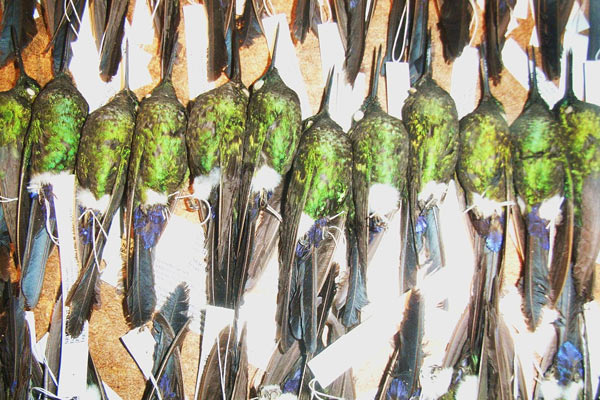 Modern day expeditions face a collection dilemma as scientists consider ethics and endangerment A tray of Eriocnemis (a genus of hummingbird) specimens, Swedish Museum of Natural History – Naturhistoriska Riksmuseet,Stockholm, CC BY-SA 3,0 License, Wikimedia. In 1912, a group of intrepid explorers led by Rollo and Ida Beck, widely acknowledged to be the foremost marine […]
Modern day expeditions face a collection dilemma as scientists consider ethics and endangerment A tray of Eriocnemis (a genus of hummingbird) specimens, Swedish Museum of Natural History – Naturhistoriska Riksmuseet,Stockholm, CC BY-SA 3,0 License, Wikimedia. In 1912, a group of intrepid explorers led by Rollo and Ida Beck, widely acknowledged to be the foremost marine […]
Jane Goodall: 5 reasons to have hope for the planet
 su Dr. Jane Goodall with Freud, a chimpanzee from Gombe. Photograph © Michael Neugebauer Jane Goodall is not only arguably the most famous conservationist who ever lived, but also the most well-known and respected female scientist on the planet today. Her path to reach that stature is as unlikely as it is inspiring. Told to […]
su Dr. Jane Goodall with Freud, a chimpanzee from Gombe. Photograph © Michael Neugebauer Jane Goodall is not only arguably the most famous conservationist who ever lived, but also the most well-known and respected female scientist on the planet today. Her path to reach that stature is as unlikely as it is inspiring. Told to […]
Using games to teach kids the value of nature and philanthropy
 Courtesy of Junior Explorers Kids are spending more time using tablets and smart phones for learning and entertainment. But hours spent gaming, Tweeting, and playing on Instagram and Facebook, may mean less engagement with nature, potentially making it more difficult for conservation organizations to inspire and influence the next generation of donors and decision makers. […]
Courtesy of Junior Explorers Kids are spending more time using tablets and smart phones for learning and entertainment. But hours spent gaming, Tweeting, and playing on Instagram and Facebook, may mean less engagement with nature, potentially making it more difficult for conservation organizations to inspire and influence the next generation of donors and decision makers. […]
Chief Curiosity Correspondent tackles sexism, aids conservation
 An interview with Emily Graslie – host of the video blog The Brain Scoop and Chief Curiosity Correspondent at Chicago’s Field Museum of Natural History Have you ever been offered the job of your dreams without knowing you were being interviewed? Have you ever communicated with a 5-year-old about the wonders of Salmonella? Have you […]
An interview with Emily Graslie – host of the video blog The Brain Scoop and Chief Curiosity Correspondent at Chicago’s Field Museum of Natural History Have you ever been offered the job of your dreams without knowing you were being interviewed? Have you ever communicated with a 5-year-old about the wonders of Salmonella? Have you […]
Indigenous uprising earned tribe territories, but greatest challenges lie ahead
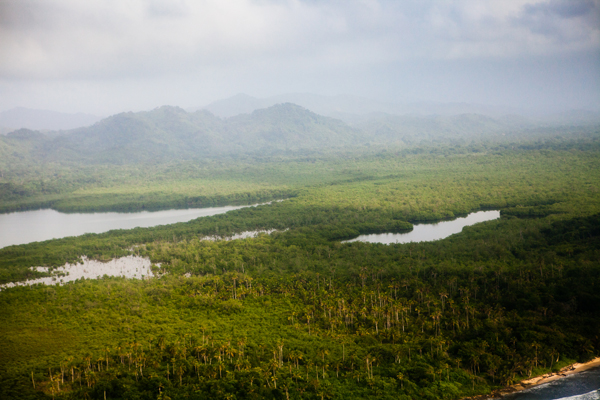 Between the Forest and the Sea: Passing Down Traditions Part I of this series: Life & Climate Change in Guna Yala Part II of this series: The Yarsuisuit Collective In 1925, Nele Kantule led a revolution that would make Guna Yala an independent and sovereign indigenous territory within Panama. Since then, the Guna have maintained […]
Between the Forest and the Sea: Passing Down Traditions Part I of this series: Life & Climate Change in Guna Yala Part II of this series: The Yarsuisuit Collective In 1925, Nele Kantule led a revolution that would make Guna Yala an independent and sovereign indigenous territory within Panama. Since then, the Guna have maintained […]
Why conservationists need a little hope: saving themselves from becoming the most depressing scientists on the planet
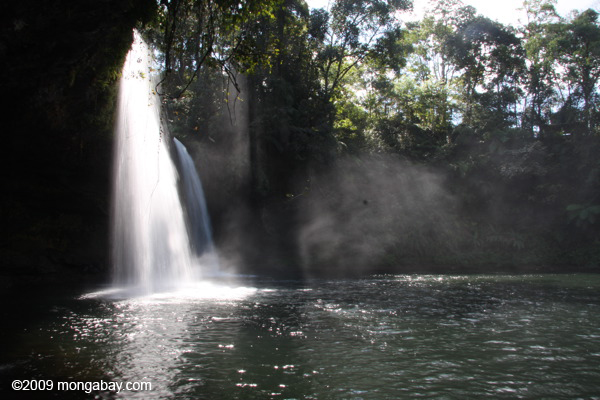 Have conservationists become too pessimistic for their own good—and the good of their cause? Tad Lo waterfalls in Laos. Photo by: Rhett A. Butler. Here’s a challenge: take a conservationist out for a drink and ask them about their work. Nine times out of ten—or possibly more—you’ll walk away feeling frustrated, despondent, and utterly hopeless. […]
Have conservationists become too pessimistic for their own good—and the good of their cause? Tad Lo waterfalls in Laos. Photo by: Rhett A. Butler. Here’s a challenge: take a conservationist out for a drink and ask them about their work. Nine times out of ten—or possibly more—you’ll walk away feeling frustrated, despondent, and utterly hopeless. […]
On babies and motherhood: how giant armadillos are surprising scientists (photos)
.600.jpg) Uncovering the reproductive mysteries of the little-known giant armadillo. Arguably the most important moment in any animal’s life— whether it be a whale, a human, or a mosquito— is the act of giving birth, of bringing a new member of the species into the world. It’s no wonder that biologists treat reproduction— from conception to […]
Uncovering the reproductive mysteries of the little-known giant armadillo. Arguably the most important moment in any animal’s life— whether it be a whale, a human, or a mosquito— is the act of giving birth, of bringing a new member of the species into the world. It’s no wonder that biologists treat reproduction— from conception to […]
Unrelenting population growth driving global warming, mass extinction
 Scientists need to start speaking out on overpopulation Suburb development in Colorado Springs, Colorado U.S. The population of the U.S. is currently growing at around 0.7 percent annually. Photo by: David Shankbone. It took humans around 200,000 years to reach a global population of one billion. But, in two hundred years we’ve septupled that. In […]
Scientists need to start speaking out on overpopulation Suburb development in Colorado Springs, Colorado U.S. The population of the U.S. is currently growing at around 0.7 percent annually. Photo by: David Shankbone. It took humans around 200,000 years to reach a global population of one billion. But, in two hundred years we’ve septupled that. In […]
Using stories to connect people to biodiversity: an interview with Tara Waters Lumpkin, PhD
 In a world where extinctions are almost commonplace and global warming barely raises an eyebrow, very few of us can return to find the places we grew up in unsullied by development. Sometimes, all that is left of a favorite grove of trees or strip of forest are memories. Through Izilwane: Voices for Biodiversity Project, […]
In a world where extinctions are almost commonplace and global warming barely raises an eyebrow, very few of us can return to find the places we grew up in unsullied by development. Sometimes, all that is left of a favorite grove of trees or strip of forest are memories. Through Izilwane: Voices for Biodiversity Project, […]
America’s growing inequality helped scuttle the global climate change initiative
 The link between good economic policy and climate change mitigation is instigated by policies such as the triple-bottom line, carbon limitations, and pro-environmental legislation. However, economic inequality is a little explored piece of the successful fight against climate change. For climate change mitigation and good economic policy to work, economic growth must be broad-based. Indeed, […]
The link between good economic policy and climate change mitigation is instigated by policies such as the triple-bottom line, carbon limitations, and pro-environmental legislation. However, economic inequality is a little explored piece of the successful fight against climate change. For climate change mitigation and good economic policy to work, economic growth must be broad-based. Indeed, […]
Art, education, and health: holistic conservation group embarks on new chapter
- It’s unlikely conservation organizations can survive if they are unwilling to embrace change: as an endeavor, conservation requires not just longterm planning, but also an ability to move proactively and fluidly to protect species and safeguard ecosystems.
- Environmental and education NGO, the Art of Conservation, is currently embarking on its biggest change since its foundation in 2006: moving away from its base in Rwanda, while leaving a legacy behind.
Unlikely success: how Zimbabwe has become a global leader in rhino conservation
 Raoul du Toit will be speaking at the Wildlife Conservation Network Expo in San Francisco on October 12th, 2013. With its collapsed economy, entrenched poverty, and political tremors, one would not expect that a country like Zimbabwe would have the capacity to safeguard its rhinos against determined and well-funded poachers, especially as just across the […]
Raoul du Toit will be speaking at the Wildlife Conservation Network Expo in San Francisco on October 12th, 2013. With its collapsed economy, entrenched poverty, and political tremors, one would not expect that a country like Zimbabwe would have the capacity to safeguard its rhinos against determined and well-funded poachers, especially as just across the […]
Lions rising: community conservation making a difference for Africa’s kings in Mozambique
 Colleen Begg will be speaking at the Wildlife Conservation Network Expo in San Francisco on October 12th, 2013. Everyone knows that tigers, pandas, and blue whales are threatened with extinction—but lions!? Researchers were shocked to recently discover that lion populations have fallen precipitously: down to around 30,000 animals across the African continent. While 30,000 may […]
Colleen Begg will be speaking at the Wildlife Conservation Network Expo in San Francisco on October 12th, 2013. Everyone knows that tigers, pandas, and blue whales are threatened with extinction—but lions!? Researchers were shocked to recently discover that lion populations have fallen precipitously: down to around 30,000 animals across the African continent. While 30,000 may […]
Little NGO takes on goliath task: conserving the vanishing ecosystems of Paraguay
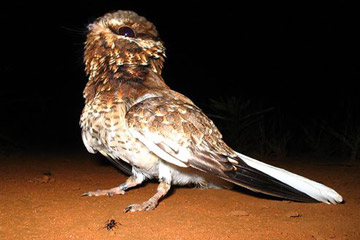 Landlocked in the navel of South America, the forests, wetlands and savannahs of Paraguay boast rich biodiversity and endemic species, yet the unique landscapes of Paraguay also face increasing threats, primarily from agricultural expansion. Controlled burns and clear cutting have become common practice as wildlands are converted for soy and cattle production. In some areas […]
Landlocked in the navel of South America, the forests, wetlands and savannahs of Paraguay boast rich biodiversity and endemic species, yet the unique landscapes of Paraguay also face increasing threats, primarily from agricultural expansion. Controlled burns and clear cutting have become common practice as wildlands are converted for soy and cattle production. In some areas […]
Engaging the public on green issues via environmental cartoons
 Engaging the general public on issues like extinction, climate change, habitat destruction, and pollution can be a challenge due to the generally downbeat nature of environmental problems. But an illustrator in Nagpur, India is taking a different approach: cartoons. Rohan Chakravarty, a designer, artist, and ardent wildlife enthusiast, has been posting environmental-themed cartoons on his […]
Engaging the general public on issues like extinction, climate change, habitat destruction, and pollution can be a challenge due to the generally downbeat nature of environmental problems. But an illustrator in Nagpur, India is taking a different approach: cartoons. Rohan Chakravarty, a designer, artist, and ardent wildlife enthusiast, has been posting environmental-themed cartoons on his […]
Making movies to save Uganda’s great apes
 The 2013 Zoos and Aquariums: Committing to Conservation (ZACC) conference runs from July 8th—July 12th in Des Moines, Iowa, hosted by the Blank Park Zoo. Ahead of the event, Mongabay.com is running a series of Q&As with presenters. For more interviews, please see our ZACC feed. Ajani and his friends are caught trespassing in the […]
The 2013 Zoos and Aquariums: Committing to Conservation (ZACC) conference runs from July 8th—July 12th in Des Moines, Iowa, hosted by the Blank Park Zoo. Ahead of the event, Mongabay.com is running a series of Q&As with presenters. For more interviews, please see our ZACC feed. Ajani and his friends are caught trespassing in the […]
Building a new generation of local conservationists: how improving education in Uganda may save one of the world’s great forests
 The 2013 Zoos and Aquariums: Committing to Conservation (ZACC) conference runs from July 8th—July 12th in Des Moines, Iowa, hosted by the Blank Park Zoo. Ahead of the event, Mongabay.com is running a series of Q&As with presenters. For more interviews, please see our ZACC feed. Students learn about sustainable farming. Photo courtesy of Elizabeth […]
The 2013 Zoos and Aquariums: Committing to Conservation (ZACC) conference runs from July 8th—July 12th in Des Moines, Iowa, hosted by the Blank Park Zoo. Ahead of the event, Mongabay.com is running a series of Q&As with presenters. For more interviews, please see our ZACC feed. Students learn about sustainable farming. Photo courtesy of Elizabeth […]
Should zoos educate the public about climate change?
 The 2013 Zoos and Aquariums: Committing to Conservation (ZACC) conference runs from July 8th—July 12th in Des Moines, Iowa, hosted by the Blank Park Zoo. Ahead of the event, Mongabay.com is running a series of Q&As with presenters. For more interviews, please see our ZACC feed. Captive polar bear. Given the rising threat of climate […]
The 2013 Zoos and Aquariums: Committing to Conservation (ZACC) conference runs from July 8th—July 12th in Des Moines, Iowa, hosted by the Blank Park Zoo. Ahead of the event, Mongabay.com is running a series of Q&As with presenters. For more interviews, please see our ZACC feed. Captive polar bear. Given the rising threat of climate […]
New global network bridges gap for primate conservation educators
- Drawing from her personal experience as a primate educator and the challenges she saw others facing, Amy Clanin envisioned a network that would advance the field of primate conservation education by addressing three needs of educators: connections, resources, and services.
- It was this vision that led her to create the Primate Education Network (PEN).
- PEN is at the forefront of primate conservation education, providing a community and collaboration platform for primate educators.
Improving the rigor of measuring emissions from deforestation, agriculture
 While much has been written about the potential of reducing greenhouse gas emissions by protecting tropical forests, a proposed program to do just that has been challenged by a number of factors, including concerns about the accuracy of measuring for carbon reductions. Failure to properly account for carbon could undermine the effectiveness of the Reducing […]
While much has been written about the potential of reducing greenhouse gas emissions by protecting tropical forests, a proposed program to do just that has been challenged by a number of factors, including concerns about the accuracy of measuring for carbon reductions. Failure to properly account for carbon could undermine the effectiveness of the Reducing […]
Extinction warning: racing to save the little dodo from its cousin’s fate
 Illustration of the little dodo likely based on stuffed specimens. By: John Gould. Sometime in the late 1600s the world’s last dodo perished on the island of Mauritius. No one knows how it spent its final moments—rather in the grip of some invasive predator or simply fading away from loneliness—but with its passing came an […]
Illustration of the little dodo likely based on stuffed specimens. By: John Gould. Sometime in the late 1600s the world’s last dodo perished on the island of Mauritius. No one knows how it spent its final moments—rather in the grip of some invasive predator or simply fading away from loneliness—but with its passing came an […]
New video game turns kids into conservationists
 Screenshot from new game Team WILD. Count coral in the Chagos Archipelago, save amphibians from the deadly chytrid fungus, replant trees in the Atlantic Forest, and count predators and prey in the African Savannah—a new free online game by Wildscreen, dubbed Team WILD, allows young players to learn about science and conservation while moving fast-paced […]
Screenshot from new game Team WILD. Count coral in the Chagos Archipelago, save amphibians from the deadly chytrid fungus, replant trees in the Atlantic Forest, and count predators and prey in the African Savannah—a new free online game by Wildscreen, dubbed Team WILD, allows young players to learn about science and conservation while moving fast-paced […]
The challenge of putting Brazil’s forests in good hands
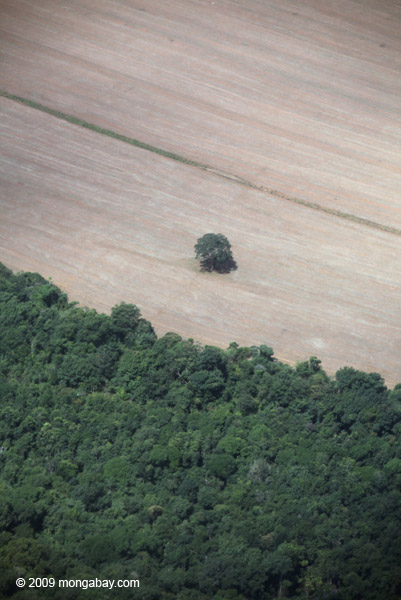 Mongabay.com is partnering with the Skoll Foundation ahead of the Skoll World Forum on Social Entrepreneurship to bring a series of perspectives that aim to answer the question: how do we feed the world and still address the drivers of deforestation? HOW DO WE FEED THE WORLD AND STILL ADDRESS THE DRIVERS OF DEFORESTATION? Soy, […]
Mongabay.com is partnering with the Skoll Foundation ahead of the Skoll World Forum on Social Entrepreneurship to bring a series of perspectives that aim to answer the question: how do we feed the world and still address the drivers of deforestation? HOW DO WE FEED THE WORLD AND STILL ADDRESS THE DRIVERS OF DEFORESTATION? Soy, […]
Vatican condemns elephant poaching, pledges steps
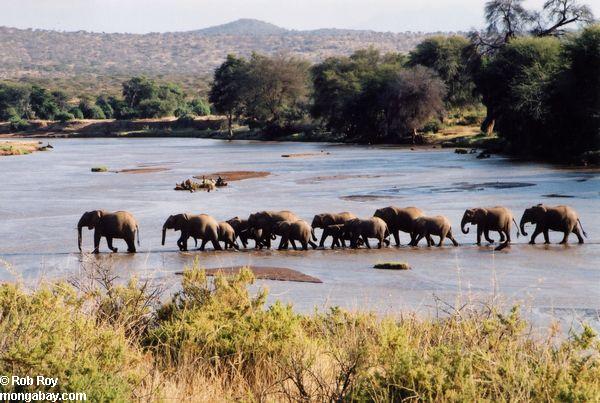 Elephant herd in Kenya. It’s estimated that around 25,000 elephants were killed by poachers in 2011, though the number could be even higher. Photo by: Rob Roy. Responding to an investigative report by National Geographic, the Vatican has condemned elephant poaching for ivory and pledged three steps to help in the battle to save the […]
Elephant herd in Kenya. It’s estimated that around 25,000 elephants were killed by poachers in 2011, though the number could be even higher. Photo by: Rob Roy. Responding to an investigative report by National Geographic, the Vatican has condemned elephant poaching for ivory and pledged three steps to help in the battle to save the […]
First REDD Textbook – Forest and Climate Change: The Social Dimensions of REDD in Latin America – Book Review
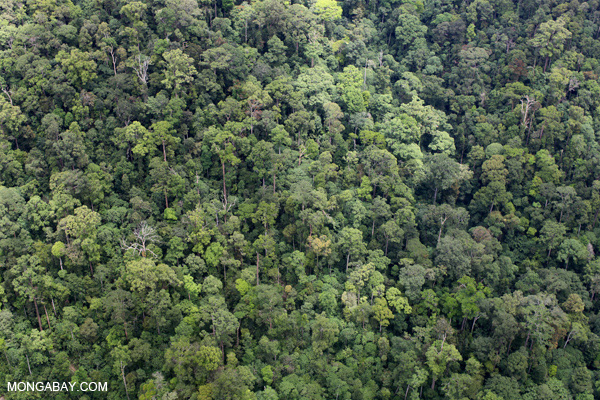 Rainforest in Borneo. Photo by: Rhett A. Butler. Thank you Professor Anthony Hall. After many years, we finally have a REDD textbook that can be used in the undergraduate and graduate classroom. Professor Hall has produced an excellent contribution to the growing Reduced Emissions from Deforestation and Forest Degradation (REDD) literature. He has written both […]
Rainforest in Borneo. Photo by: Rhett A. Butler. Thank you Professor Anthony Hall. After many years, we finally have a REDD textbook that can be used in the undergraduate and graduate classroom. Professor Hall has produced an excellent contribution to the growing Reduced Emissions from Deforestation and Forest Degradation (REDD) literature. He has written both […]
Gaming for rainforests
 Screenshot from Rainforest Rangers. The average gamer will spend thousands of hours playing video games by the time they reach adulthood, but the most popular games among some demographics — shoot-em-up and sports games — don’t seem to offer many dividends to society or the environment. However Jan Dwire doesn’t believe that has to be […]
Screenshot from Rainforest Rangers. The average gamer will spend thousands of hours playing video games by the time they reach adulthood, but the most popular games among some demographics — shoot-em-up and sports games — don’t seem to offer many dividends to society or the environment. However Jan Dwire doesn’t believe that has to be […]
Elephant ancestors and Africa’s Bigfoot: new initiative works to preserve a continent’s wildest tales
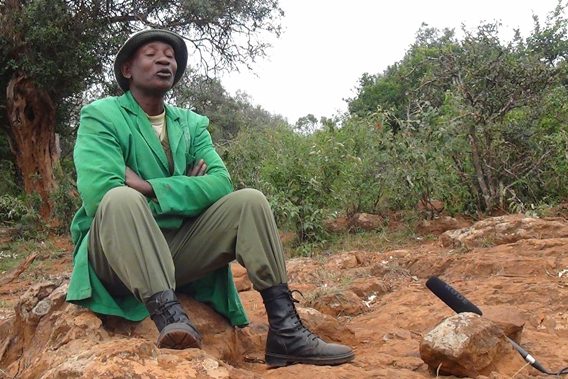 Africa’s Wildest Stories is a new initiative in Kenya to capture personal stories about the relationship of people to nature. Elephant Keeper Mishak Nzimbi (above) has been working at the David Sheldrick center since he was a teenager. It’s a job he would never give up for anything. He is an ordinary man living an […]
Africa’s Wildest Stories is a new initiative in Kenya to capture personal stories about the relationship of people to nature. Elephant Keeper Mishak Nzimbi (above) has been working at the David Sheldrick center since he was a teenager. It’s a job he would never give up for anything. He is an ordinary man living an […]
Innovative conservation: bandanas to promote new park in the Congo
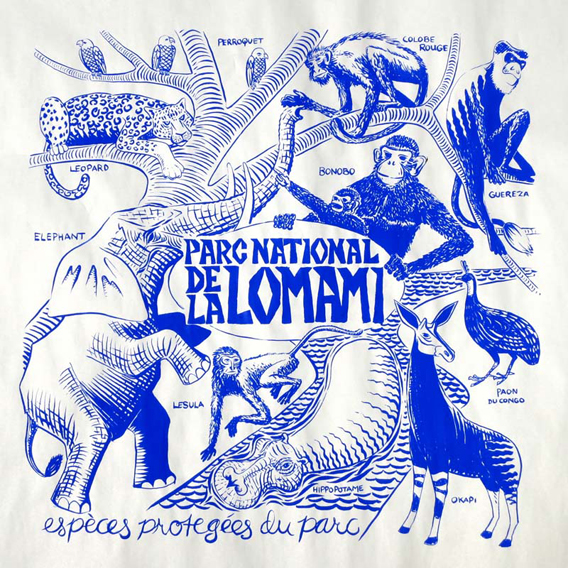 Bandana by Roger Peet to promote conservation and wildlife identification in the Democratic Republic of the Congo (DRC). Click to enlarge. American artist, Roger Peet—a member of the art cooperative, Justseeds, and known for his print images of vanishing species—is headed off to the Democratic Republic of the Congo (DRC) to help survey a new […]
Bandana by Roger Peet to promote conservation and wildlife identification in the Democratic Republic of the Congo (DRC). Click to enlarge. American artist, Roger Peet—a member of the art cooperative, Justseeds, and known for his print images of vanishing species—is headed off to the Democratic Republic of the Congo (DRC) to help survey a new […]
Congolese experts needed to protect Congo Basin rainforests
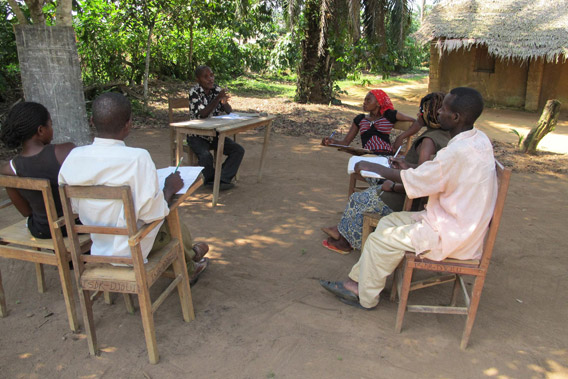 Professor Baboko teaching a geography class at the Djolu Technical College of Rural Development. Photo courtesy of: Ingrid Schulze. This summer, the Democratic Republic of Congo (DRC) is expected to approve a new higher education strategy which the country has developed with the World Bank and other international donors. The shape of this educational reform […]
Professor Baboko teaching a geography class at the Djolu Technical College of Rural Development. Photo courtesy of: Ingrid Schulze. This summer, the Democratic Republic of Congo (DRC) is expected to approve a new higher education strategy which the country has developed with the World Bank and other international donors. The shape of this educational reform […]
Educating the next generation of conservation leaders in Colombia
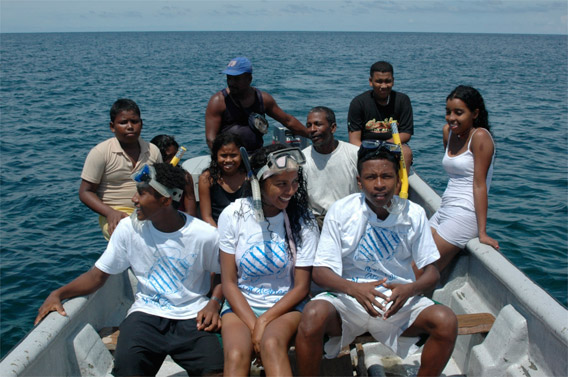 Guardians of Nature students take a field trip to snorkel in coral reefs. Photo courtesy of: Miguel Hernandez. Colombia’s northern departments of Cordoba and Bolivar are home to an abundance of coral reefs, estuaries, mangroves forests, and forests. Rich in both marine and terrestrial wildlife, local communities depend on the sea and land for survival, […]
Guardians of Nature students take a field trip to snorkel in coral reefs. Photo courtesy of: Miguel Hernandez. Colombia’s northern departments of Cordoba and Bolivar are home to an abundance of coral reefs, estuaries, mangroves forests, and forests. Rich in both marine and terrestrial wildlife, local communities depend on the sea and land for survival, […]
Doing good and staying sane amidst the global environmental crisis
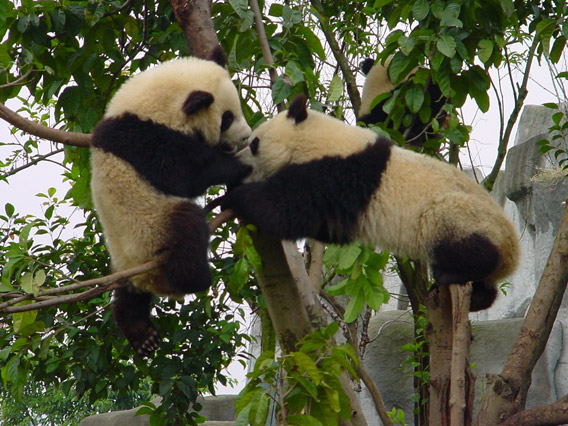 An interview with Dr. Sarah Bexell. The vanishing giant panda (Ailuropoda melanoleuca) is just one victim of the global environmental crisis. Photo by: Sarah Bexell. Several years ago while teaching a course in environmental science a student raised her hand during our discussion of the circumstances of modern ecological collapse and posed the question, “what […]
An interview with Dr. Sarah Bexell. The vanishing giant panda (Ailuropoda melanoleuca) is just one victim of the global environmental crisis. Photo by: Sarah Bexell. Several years ago while teaching a course in environmental science a student raised her hand during our discussion of the circumstances of modern ecological collapse and posed the question, “what […]
Turkey’s rich biodiversity at risk
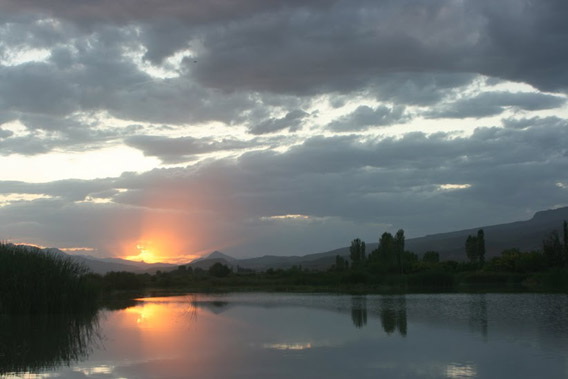 Turkey’s stunning landscapes and wildlife are under threat due to government ambivalence. Here, the sun sets outside Igdir, Turkey. Photo by: Cagan Sekercioglu. Turkey: the splendor of the Hagia Sophia, the ruins of Ephesus, and the bizarre caves of the Cappadocia. For foreign travelers, Turkey is a nation of cultural, religious, and historic wonders: a […]
Turkey’s stunning landscapes and wildlife are under threat due to government ambivalence. Here, the sun sets outside Igdir, Turkey. Photo by: Cagan Sekercioglu. Turkey: the splendor of the Hagia Sophia, the ruins of Ephesus, and the bizarre caves of the Cappadocia. For foreign travelers, Turkey is a nation of cultural, religious, and historic wonders: a […]
Teaching Sustainability/Teaching Sustainably: Book Review
In Teaching Sustainability/Teaching Sustainably, Danielle Lake writes the best sentence I have ever read summarizing sustainability: “Understanding sustainability as a wicked problem, and recognizing how an egoist ethic otherizes the environment and is thus in large part responsible for the abuses that have led to a number of current environmental and social problems, are central […]
Fungus from the Amazon devours plastic
 A landfill in Panama that was once mangroves. Photo by: Rhett A. Butler. Students from Yale University have made the amazing discovery of a species of fungus that devours one of the world’s most durable, and therefore environmentally troublesome, plastics: polyurethane, reports Fast Company’s Co-Exist. The new species of fungus, Pestalotiopsis microspora, is even able […]
A landfill in Panama that was once mangroves. Photo by: Rhett A. Butler. Students from Yale University have made the amazing discovery of a species of fungus that devours one of the world’s most durable, and therefore environmentally troublesome, plastics: polyurethane, reports Fast Company’s Co-Exist. The new species of fungus, Pestalotiopsis microspora, is even able […]
Saving the world’s biggest river otter
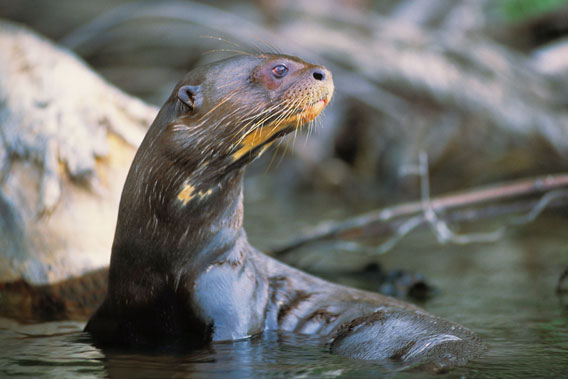 The giant river otter. Photo by: Frank Hajek. Behavior and conservation of the Amazon’s giant river otter. Charismatic, vocal, unpredictable, domestic, and playful are all adjectives that aptly describe the giant river otter (Pteronura brasiliensis), one of the Amazon’s most spectacular big mammals. As its name suggest, this otter is the longest member of the […]
The giant river otter. Photo by: Frank Hajek. Behavior and conservation of the Amazon’s giant river otter. Charismatic, vocal, unpredictable, domestic, and playful are all adjectives that aptly describe the giant river otter (Pteronura brasiliensis), one of the Amazon’s most spectacular big mammals. As its name suggest, this otter is the longest member of the […]
New book series hopes to inspire research in world’s ‘hottest biodiversity hotspot’
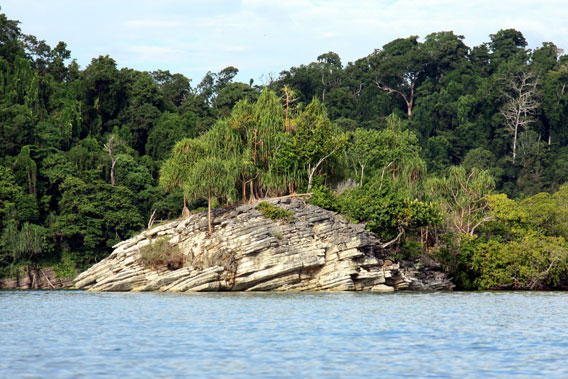 Pristine coastal vegetation: Misool island, Raja Ampat. Photo by: Dimtry Telnov, 2009. Entomologist Dmitry Telnov hopes his new pet project will inspire and disseminate research about one of the world’s last unexplored biogeographical regions: Wallacea and New Guinea. Incredibly rich in biodiversity and still full of unknown species, the region, also known as the Indo-Australian […]
Pristine coastal vegetation: Misool island, Raja Ampat. Photo by: Dimtry Telnov, 2009. Entomologist Dmitry Telnov hopes his new pet project will inspire and disseminate research about one of the world’s last unexplored biogeographical regions: Wallacea and New Guinea. Incredibly rich in biodiversity and still full of unknown species, the region, also known as the Indo-Australian […]
New app works to raise awareness of endangered species
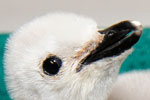 Want to learn more about gorillas, whales, elephants, sharks, and penguins? A new mobile app hopes to raise awareness and conservation efforts for the world’s endangered species. Dubbed Survival, the new app is a game that also raises knowledge about endangered species. Created by wildlife and media NGO, Wildscreen, the app is available free on […]
Want to learn more about gorillas, whales, elephants, sharks, and penguins? A new mobile app hopes to raise awareness and conservation efforts for the world’s endangered species. Dubbed Survival, the new app is a game that also raises knowledge about endangered species. Created by wildlife and media NGO, Wildscreen, the app is available free on […]
11 challenges facing 7 billion super-consumers
 The Turkana tribe of northern Kenya are buffeted by constant drought and food insecurity, which recent research says may be worsening due to climate change. Photo by: Rhett A. Butler. Perhaps the most disconcerting thing about Halloween this year is not the ghouls and goblins taking to the streets, but a baby born somewhere in […]
The Turkana tribe of northern Kenya are buffeted by constant drought and food insecurity, which recent research says may be worsening due to climate change. Photo by: Rhett A. Butler. Perhaps the most disconcerting thing about Halloween this year is not the ghouls and goblins taking to the streets, but a baby born somewhere in […]
Saving (and studying) one of Nigeria’s last montane forests
.568.jpg) The Nigerian Montane Forest Project’s field station set in the Ngel Nyaki Forest. Photo by: Pierre-Michel Forget. Between 2000 and 2010, Nigeria lost nearly a third (31 percent) of its forest cover, while its primary forests suffered even worse: in just five years (2000 to 2005) over half of the nation’s primary forests were destroyed, […]
The Nigerian Montane Forest Project’s field station set in the Ngel Nyaki Forest. Photo by: Pierre-Michel Forget. Between 2000 and 2010, Nigeria lost nearly a third (31 percent) of its forest cover, while its primary forests suffered even worse: in just five years (2000 to 2005) over half of the nation’s primary forests were destroyed, […]
Belief and butchery: how lies and organized crime are pushing rhinos to extinction
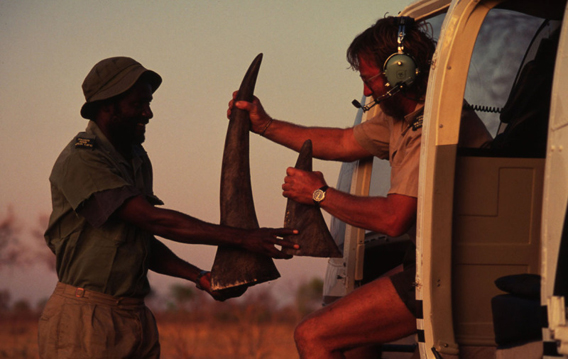 WARNING: Graphic photos below. Recently cut white rhino horns in Zimbabwe. Photos: © Michel Gunther / WWF-Canon. Few animals face as violent, as well organized, and as determined an enemy as the world’s rhinos. Across the globe rhinos are being slaughtered in record numbers; on average more than one rhino is killed by poachers everyday. […]
WARNING: Graphic photos below. Recently cut white rhino horns in Zimbabwe. Photos: © Michel Gunther / WWF-Canon. Few animals face as violent, as well organized, and as determined an enemy as the world’s rhinos. Across the globe rhinos are being slaughtered in record numbers; on average more than one rhino is killed by poachers everyday. […]
Rainforest information in Thai
 Hornbill in Thailand’s Khao Yai National Park. Photo by Rhett A. Butler 2009 Mongabay.com, a leading forest conservation and environmental science news web site, today announced the availability of its rainforest site for children in Thai. The site is available at world.mongabay.com/thai. The new site was made possible through the effort of Toangpos Srichanwoang, who […]
Hornbill in Thailand’s Khao Yai National Park. Photo by Rhett A. Butler 2009 Mongabay.com, a leading forest conservation and environmental science news web site, today announced the availability of its rainforest site for children in Thai. The site is available at world.mongabay.com/thai. The new site was made possible through the effort of Toangpos Srichanwoang, who […]
Pet trade, palm oil, and poaching: the challenges of saving the ‘forgotten bear’
 This interview is an excerpt from The WildLife with Laurel Neme, a program that explores the mysteries of the animal world through interviews with scientists and other wildlife investigators. “The WildLife” airs every Monday from 1-2 pm EST on WOMM-LP, 105.9 FM in Burlington, Vermont. You can livestream it at theradiator.org or download the podcast […]
This interview is an excerpt from The WildLife with Laurel Neme, a program that explores the mysteries of the animal world through interviews with scientists and other wildlife investigators. “The WildLife” airs every Monday from 1-2 pm EST on WOMM-LP, 105.9 FM in Burlington, Vermont. You can livestream it at theradiator.org or download the podcast […]
Reaching kids with a conservation message via animation
 Producer Shane DeRolf conveys the concept of extinction through his Yesterday’s Zoo project. During the Wildlife Conservation Network’s October 2010 Wildlife Expo, mongabay.com encountered an animation that powerfully illustrates the concept of biodiversity loss in less than two-and-a-half minutes. Yesterday’s Zoo recounts species that have disappeared and warns that a similar fate could befall many […]
Producer Shane DeRolf conveys the concept of extinction through his Yesterday’s Zoo project. During the Wildlife Conservation Network’s October 2010 Wildlife Expo, mongabay.com encountered an animation that powerfully illustrates the concept of biodiversity loss in less than two-and-a-half minutes. Yesterday’s Zoo recounts species that have disappeared and warns that a similar fate could befall many […]
Paradise & Paradox: a semester in Ecuador
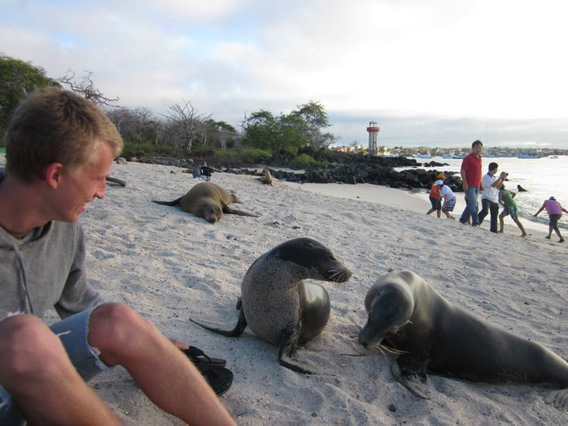 The author being approached by sealions on Playa Mann. Photo by: Rachel Lynch. A semester abroad is an opportunity to live a sort of compacted life. In a few short months you seem to gain the experience of a much longer time and make enough memories to fill years. I recall a weeklong trip to […]
The author being approached by sealions on Playa Mann. Photo by: Rachel Lynch. A semester abroad is an opportunity to live a sort of compacted life. In a few short months you seem to gain the experience of a much longer time and make enough memories to fill years. I recall a weeklong trip to […]
Rainforest information in Romanian
Mongabay.com, a leading forest conservation and environmental science news web site, today announced the availability of its rainforest site for children in Romanian. The site is available at world.mongabay.com/romanian. The new site was made possible through the effort of Alina-Crenguţa Dumitru, who translated the text from English to her native Romanian. Rhett Butler, mongabay.com’s founder, […]
Major conservation biology textbook now free online
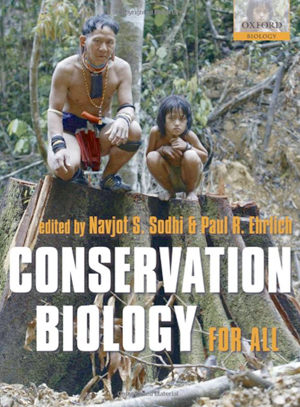 A highly regarded conservation textbook is now available online for free. Conservation Biology for All, a book edited by Navjot S. Sodhi of the National University of Singapore and Paul R. Ehrlich of Stanford University, has been posted on mongabay.com, an environmental science and conservation news site, as a free download. Conservation Biology for All […]
A highly regarded conservation textbook is now available online for free. Conservation Biology for All, a book edited by Navjot S. Sodhi of the National University of Singapore and Paul R. Ehrlich of Stanford University, has been posted on mongabay.com, an environmental science and conservation news site, as a free download. Conservation Biology for All […]
Rainforest information for kids in Finnish
With the help of Juha Honkala, Mongabay.com’s rainforest information site for children is now available in Finnish: world.mongabay.com/finnish/. The rainforest information site for children — which describes rainforests, their importance, and the threats they face — has now been translated into 35 languages. All the translation has been done by native speakers. Mongabay’s sister site, […]
Lack of schools, trade drive exodus from remote parts of the Amazon
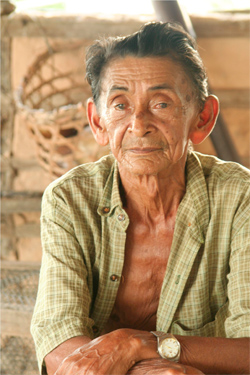 Lack of school access and higher costs of trade are driving an exodus from remote areas in the Amazon, a new study published in Population & Environment reveals. The research sheds light on to why people are leaving remote forest areas. It follows an earlier publication indicating that migration away from remote rural areas may […]
Lack of school access and higher costs of trade are driving an exodus from remote areas in the Amazon, a new study published in Population & Environment reveals. The research sheds light on to why people are leaving remote forest areas. It follows an earlier publication indicating that migration away from remote rural areas may […]
Amazon tribe establishes first indigenous forest carbon fund
 This article was originally posted on Ecosystem Marketplace as Brazil’s Suruí Establish First Indigenous Carbon Fund. A half-century ago, Brazil’s Suruí people knew little of the world beyond their cluster of villages – and nothing of the European settlers who dominated their continent. By 2006, that world beyond had engulfed them – a fact their […]
This article was originally posted on Ecosystem Marketplace as Brazil’s Suruí Establish First Indigenous Carbon Fund. A half-century ago, Brazil’s Suruí people knew little of the world beyond their cluster of villages – and nothing of the European settlers who dominated their continent. By 2006, that world beyond had engulfed them – a fact their […]
Flight of the Monarchs Reveals Environmental Connections across a Continent
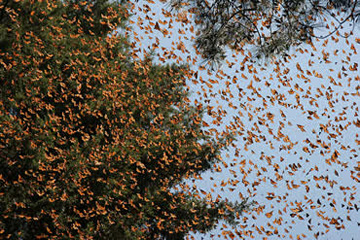 As autumn settles across North America, one hallmark of the season is the gentle southward flight of the Monarch Butterflies as they migrate towards the forests that shelter their species during the winter months. Unfortunately, as with other forests across the planet, the Monarch’s “over- wintering grounds” in Mexico are suffering from increased human pressures. […]
As autumn settles across North America, one hallmark of the season is the gentle southward flight of the Monarch Butterflies as they migrate towards the forests that shelter their species during the winter months. Unfortunately, as with other forests across the planet, the Monarch’s “over- wintering grounds” in Mexico are suffering from increased human pressures. […]
Undergrads in the Amazon: American students witness beauty and crisis in Yasuni National Park, Ecuador
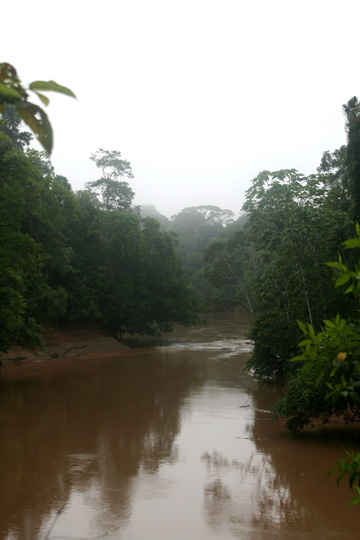 Although most Americans have likely seen photos and videos of the world’s largest rainforest, the Amazon, they will probably never see it face-to-face. For many, the Amazon seems incredibly remote: it is a dim, mysterious place, a jungle surfeit in adventure and beauty—but not a place to take a family vacation or spend a honeymoon. […]
Although most Americans have likely seen photos and videos of the world’s largest rainforest, the Amazon, they will probably never see it face-to-face. For many, the Amazon seems incredibly remote: it is a dim, mysterious place, a jungle surfeit in adventure and beauty—but not a place to take a family vacation or spend a honeymoon. […]
Majority of Americans confused on climate change basics
 Most Americans don’t understand the basics of climate change, according to a new poll by researchers with Yale. The poll found that over half of Americans deserve an ‘F’ on basic understanding of climate science and climate change, while only 1% would receive an ‘A’. While 63% of Americans say that the globe is warming, […]
Most Americans don’t understand the basics of climate change, according to a new poll by researchers with Yale. The poll found that over half of Americans deserve an ‘F’ on basic understanding of climate science and climate change, while only 1% would receive an ‘A’. While 63% of Americans say that the globe is warming, […]
Rainforest information in Vietnamese
Mongabay.com, a leading forest conservation and environmental science news web site, today announced the availability of its rainforest site for children in Vietnamese. The site is available at world.mongabay.com/vietnamese. The new site was made possible through the effort of Khanh Nguyen, who translated the text from English to his native Vietnamese. Rhett Butler, mongabay.com’s founder, […]
Berantas Pemburu, Lakukan Penyamaran, Selamatkan Hewan Liar: Semua dalam Satu Hari Kerja Arief Rubianto
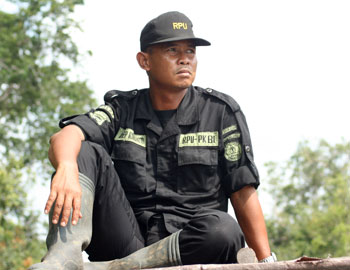 Arief Rubianto akan berbicara di Wildlife Conservation Network Expo di San Francisco, 3 Oktober 2010. Arief Rubianto, kepala satuan anti-perburuan di Pulau Sumatera, Indonesia, mendeskripsikan kehidupan sehari-harinya dengan ini: “seperti Mission Impossible”. Tidak percaya pada saya? Rubianto telah bertarung melawan penebang liar, baku tembak dengan pemburu, berhasil bertahan selama 4 hari di hutan tanpa makanan, […]
Arief Rubianto akan berbicara di Wildlife Conservation Network Expo di San Francisco, 3 Oktober 2010. Arief Rubianto, kepala satuan anti-perburuan di Pulau Sumatera, Indonesia, mendeskripsikan kehidupan sehari-harinya dengan ini: “seperti Mission Impossible”. Tidak percaya pada saya? Rubianto telah bertarung melawan penebang liar, baku tembak dengan pemburu, berhasil bertahan selama 4 hari di hutan tanpa makanan, […]
Fighting poachers, going undercover, saving wildlife: all in a day’s work for Arief Rubianto
 Arief Rubianto will be speaking at the Wildlife Conservation Network Expo in San Francisco on October 3rd, 2010. Arief Rubianto, the head of an anti-poaching squad on the Indonesian island of Sumatra best describes his daily life in this way: “like mission impossible”. Don’t believe me? Rubianto has fought with illegal loggers, exchanged gunfire with […]
Arief Rubianto will be speaking at the Wildlife Conservation Network Expo in San Francisco on October 3rd, 2010. Arief Rubianto, the head of an anti-poaching squad on the Indonesian island of Sumatra best describes his daily life in this way: “like mission impossible”. Don’t believe me? Rubianto has fought with illegal loggers, exchanged gunfire with […]
Into the Congo: saving bonobos means aiding left-behind communities, an interview with Gay Reinartz
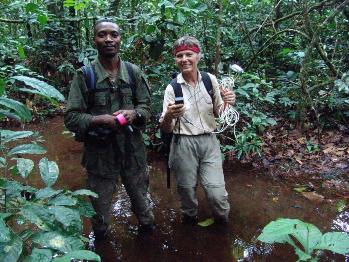 Gay Reinartz will be speaking at the Wildlife Conservation Network Expo in San Francisco on October 3rd, 2010. Unlike every other of the world’s great apes—the gorilla, chimpanzee, and orangutan—saving the bonobo means focusing conservation efforts on a single nation, the Democratic Republic of the Congo. While such a fact would seem to simplify conservation, […]
Gay Reinartz will be speaking at the Wildlife Conservation Network Expo in San Francisco on October 3rd, 2010. Unlike every other of the world’s great apes—the gorilla, chimpanzee, and orangutan—saving the bonobo means focusing conservation efforts on a single nation, the Democratic Republic of the Congo. While such a fact would seem to simplify conservation, […]
Dapatkah Perangkap Kamera Selamatkan Kehidupan Rimba di Seluruh Dunia?
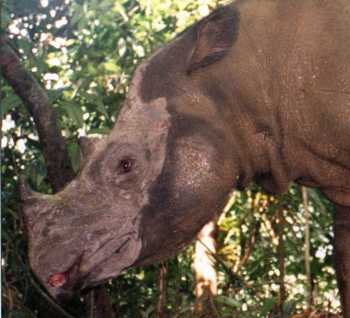 Aman untuk dikatakan bahwa perangkap kamera yang sederhana telah merevolusi konservasi kehidupan rimba. Alat unik yang sederhana ini – kamera digital otomatis yang mengambil foto dengan flash setiap seekor hewan memicu sensor infra merah – memungkinkan para ilmuwan, dengan sedikit biaya dan usaha yang relatif – paling tidak jika dibandingkan dengan menjelajahi hutan tropis dan […]
Aman untuk dikatakan bahwa perangkap kamera yang sederhana telah merevolusi konservasi kehidupan rimba. Alat unik yang sederhana ini – kamera digital otomatis yang mengambil foto dengan flash setiap seekor hewan memicu sensor infra merah – memungkinkan para ilmuwan, dengan sedikit biaya dan usaha yang relatif – paling tidak jika dibandingkan dengan menjelajahi hutan tropis dan […]
Could camera traps save wildlife worldwide?
 It’s safe to say that the humble camera trap has revolutionized wildlife conservation. This simple contraption—an automated digital camera that takes a flash photo whenever an animal triggers an infrared sensor—has allowed scientists to collect photographic evidence of rarely seen, and often globally endangered species, with little expense and relative ease—at least compared to tromping […]
It’s safe to say that the humble camera trap has revolutionized wildlife conservation. This simple contraption—an automated digital camera that takes a flash photo whenever an animal triggers an infrared sensor—has allowed scientists to collect photographic evidence of rarely seen, and often globally endangered species, with little expense and relative ease—at least compared to tromping […]
Camp merges technology and conservation for local students
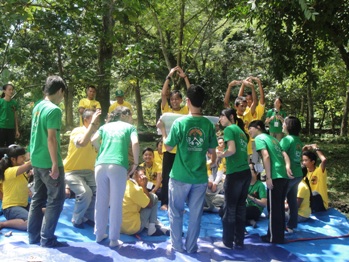 From July 23-25, Taiwanese undergraduates held a camp in Bukit Lawang, Sumatra, that taught local high school students to use technology as a conservation tool. The Taiwanese volunteers aimed to help local people in this popular rainforest tourism destination to use the Internet to research and promote sustainable tourism practices. The high school students, who […]
From July 23-25, Taiwanese undergraduates held a camp in Bukit Lawang, Sumatra, that taught local high school students to use technology as a conservation tool. The Taiwanese volunteers aimed to help local people in this popular rainforest tourism destination to use the Internet to research and promote sustainable tourism practices. The high school students, who […]
Endangered Animals: 10 Reasons for Hope
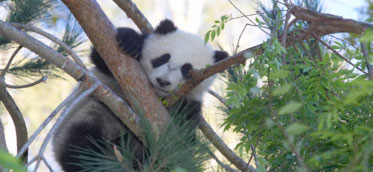 The San Diego Zoo Offers 10 Reasons for Hope and Steps Out with the Global Action Team Earlier last month the Zoological Society of San Diego launched two far reaching media and development projects which showcase the Zoo’s extensive global field conservation programs. Mongabay had the opportunity to attend the launch ceremony of the Zoo’s […]
The San Diego Zoo Offers 10 Reasons for Hope and Steps Out with the Global Action Team Earlier last month the Zoological Society of San Diego launched two far reaching media and development projects which showcase the Zoo’s extensive global field conservation programs. Mongabay had the opportunity to attend the launch ceremony of the Zoo’s […]
Conservation photography: on shooting and saving the world’s largest temperate rainforest, an interview with Amy Gulick
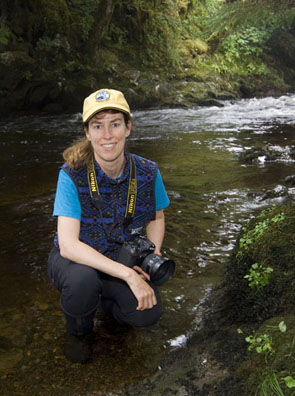 Most of the US’s large ecosystems are but shadows of their former selves. The old-growth deciduous forests that once covered nearly all of the east and mid-west continental US are gone, reduced to a few fragmented patches that are still being lost. The tall grassy plains that once stretched further than any eye could see […]
Most of the US’s large ecosystems are but shadows of their former selves. The old-growth deciduous forests that once covered nearly all of the east and mid-west continental US are gone, reduced to a few fragmented patches that are still being lost. The tall grassy plains that once stretched further than any eye could see […]
Wawancara dengan Rhett Butler
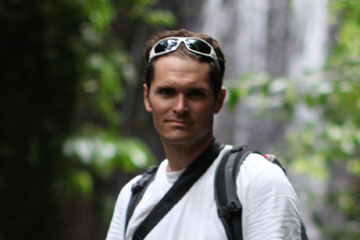 Rhett Butler, pendiri mongabay.com, berbicara dengan Laurel Neme di siaran radio dan podcast “The WildLife” tentang apa yang membisiki dia untuk membangun situs web lingkungan hidupnya dan juga mengenai beberapa kisah menarik dan aneh yang dia kejar di Madagaskar, Amazon, dan di sekeliling dunia. Wawancara ini dilakukan di akhir Maret dan aslinya disiarkan 10 Mei […]
Rhett Butler, pendiri mongabay.com, berbicara dengan Laurel Neme di siaran radio dan podcast “The WildLife” tentang apa yang membisiki dia untuk membangun situs web lingkungan hidupnya dan juga mengenai beberapa kisah menarik dan aneh yang dia kejar di Madagaskar, Amazon, dan di sekeliling dunia. Wawancara ini dilakukan di akhir Maret dan aslinya disiarkan 10 Mei […]
An interview with Rhett Butler
 Rhett Butler, founder of mongabay.com, spoke with Laurel Neme on her “The WildLife” radio show and podcast about what prompted him to develop his environmental website and also about some of the more interesting and bizarre stories he’s pursued in Madagascar, the Amazon and around the world. This interview was conducted in late March and […]
Rhett Butler, founder of mongabay.com, spoke with Laurel Neme on her “The WildLife” radio show and podcast about what prompted him to develop his environmental website and also about some of the more interesting and bizarre stories he’s pursued in Madagascar, the Amazon and around the world. This interview was conducted in late March and […]
Children prioritize TV, video games over saving the environment
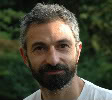 When asked to rank what was most important to them children across the world chose watching TV and playing video games ahead of saving the environment, according to an Airbus survey of 10,000 children from ten countries. Forty percent of children ranked watching TV and playing video games as most important to them, while 4 […]
When asked to rank what was most important to them children across the world chose watching TV and playing video games ahead of saving the environment, according to an Airbus survey of 10,000 children from ten countries. Forty percent of children ranked watching TV and playing video games as most important to them, while 4 […]
One man’s mission to save Cambodia’s elephants
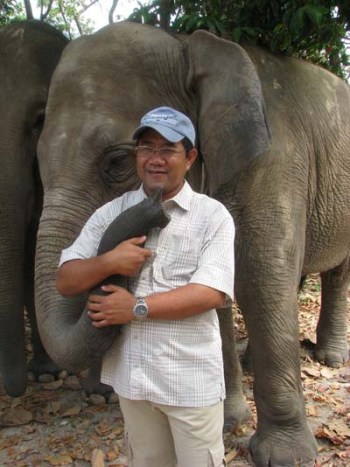 Since winning the prestigious 2010 Goldman Environmental Prize in Asia, Tuy Sereivathana has visited the US and Britain, even shaking hands with US President Barack Obama, yet in his home country of Cambodia he remains simply ‘Uncle Elephant’. A lifelong advocate for elephants in the Southeast Asian country, Sereivathana’s work has allowed villagers and elephants […]
Since winning the prestigious 2010 Goldman Environmental Prize in Asia, Tuy Sereivathana has visited the US and Britain, even shaking hands with US President Barack Obama, yet in his home country of Cambodia he remains simply ‘Uncle Elephant’. A lifelong advocate for elephants in the Southeast Asian country, Sereivathana’s work has allowed villagers and elephants […]
A nation of tragedies: the unseen elephant wars of Chad
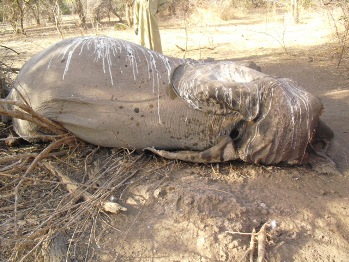 Chad’s few remaining elephants are “survivors of a ‘holocaust'”. [warning: graphic images of killed elephants] Stephanie Vergniault, head of SOS Elephants in Chad, says she has seen more beheaded corpses of elephants in her life than living animals. In the central African nation, against the backdrop of a vast human tragedy—poverty, hunger, violence, and hundreds […]
Chad’s few remaining elephants are “survivors of a ‘holocaust'”. [warning: graphic images of killed elephants] Stephanie Vergniault, head of SOS Elephants in Chad, says she has seen more beheaded corpses of elephants in her life than living animals. In the central African nation, against the backdrop of a vast human tragedy—poverty, hunger, violence, and hundreds […]
Japan suggests a ‘Biodiversity Decade’
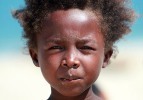 Japan, the host nation for the Nagoya Biodiversity Summit in October, has suggested adding a few more years to the UN’s awareness-raising efforts on the biodiversity crisis. Instead of having the International Year of Biodiversity conclude after this December, Japan says it will propose making 2010-2019 the International Decade of Biodiversity. The announcement comes after […]
Japan, the host nation for the Nagoya Biodiversity Summit in October, has suggested adding a few more years to the UN’s awareness-raising efforts on the biodiversity crisis. Instead of having the International Year of Biodiversity conclude after this December, Japan says it will propose making 2010-2019 the International Decade of Biodiversity. The announcement comes after […]
Website seeking ‘most wanted’ photos and videos of vanishing species
 Many of the world’s most endangered species have never been photographed or caught on film. The not-for-profit website ARKive is hoping to change that. ARKive provides a collection of some of the best photos and video clips of the world’s species. Now the organization is pushing its mission—to make photos and film of the Earth’s […]
Many of the world’s most endangered species have never been photographed or caught on film. The not-for-profit website ARKive is hoping to change that. ARKive provides a collection of some of the best photos and video clips of the world’s species. Now the organization is pushing its mission—to make photos and film of the Earth’s […]
Face-to-face with what may be the last of the world’s smallest rhino, the Bornean rhinoceros
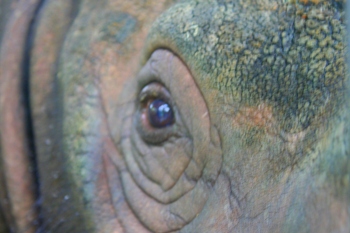 Meeting Tam in Borneo: our last chance to save Asia’s two horned rhino Nothing can really prepare a person for coming face-to-face with what may be the last of a species. I had known for a week that I would be fortunate enough to meet Tam. I’d heard stories of his gentle demeanor, discussed his […]
Meeting Tam in Borneo: our last chance to save Asia’s two horned rhino Nothing can really prepare a person for coming face-to-face with what may be the last of a species. I had known for a week that I would be fortunate enough to meet Tam. I’d heard stories of his gentle demeanor, discussed his […]
The faster, fiercer, and always surprising sloth, an interview with Bryson Voirin
 A doctoral student with the Max Planck Institute, Bryson Voirin studies sloths and other species at the Smithsonian Tropical Research Institute. Mongabay.com’s sixth in a series of interviews with ‘Young Scientists’. Sloths sleep all day; they are always slow; and they are gentle as lambs. These are just some of the popular misconceptions that sloth-scientist […]
A doctoral student with the Max Planck Institute, Bryson Voirin studies sloths and other species at the Smithsonian Tropical Research Institute. Mongabay.com’s sixth in a series of interviews with ‘Young Scientists’. Sloths sleep all day; they are always slow; and they are gentle as lambs. These are just some of the popular misconceptions that sloth-scientist […]
TV worthless when it comes to knowledge about global warming
Is TV your top media choice? Then its likely, according to new research, that climate change is largely off your radar. A new study appearing in Communication Research shows that watching television has no significant impact on the viewer’s knowledge about climate change. Comparing television to other media sources, the study found that newspapers and […]
Working to save the ‘living dead’ in the Atlantic Forest, an interview with Antonio Rossano Mendes Pontes
 Fourth in a series of interviews with participants at the 2009 Association of Tropical Biology and Conservation (ATBC) conference. The Atlantic Forest may very well be the most imperiled tropical ecosystem in the world: it is estimated that seven percent (or less) of the original forest remains. Lining the coast of Brazil, what is left […]
Fourth in a series of interviews with participants at the 2009 Association of Tropical Biology and Conservation (ATBC) conference. The Atlantic Forest may very well be the most imperiled tropical ecosystem in the world: it is estimated that seven percent (or less) of the original forest remains. Lining the coast of Brazil, what is left […]
After declining 95% in 15 years, Saiga antelope begins to rebound with help from conservationists
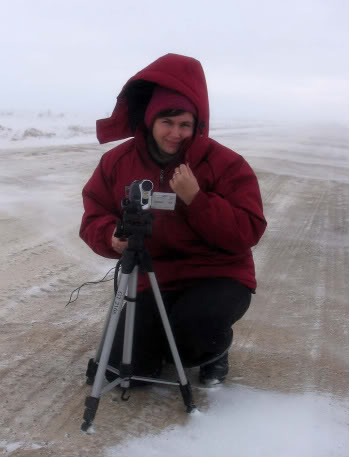 An interview with Elena Bykova, founder of the Saiga Conservation Alliance In a decline on par with that suffered by the American bison in the Nineteenth Century, in the 1990s the saiga antelope of the Central Asian steppe plummeted from over one million individuals to 50,000, dropping a staggering 95 percent in a decade and […]
An interview with Elena Bykova, founder of the Saiga Conservation Alliance In a decline on par with that suffered by the American bison in the Nineteenth Century, in the 1990s the saiga antelope of the Central Asian steppe plummeted from over one million individuals to 50,000, dropping a staggering 95 percent in a decade and […]
Saving gorillas by bringing healthcare to local people in Uganda, an interview with Dr. Gladys Kalema-Zikusoka
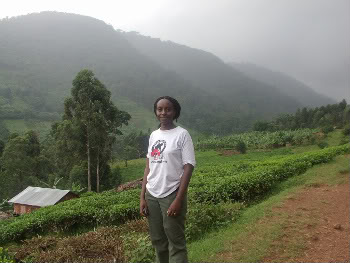 How can bringing healthcare to local villagers in Uganda help save the Critically Endangered mountain gorilla? The answer lies in our genetics, says Dr. Gladys Kalema-Zikusoka, wildlife veterinarian and director of Conservation through Public Health (CTPH). “Because we share 98.4% genetic material with gorillas we can easily transmit diseases to each other.” Therefore, explains Kalema-Zikusoka […]
How can bringing healthcare to local villagers in Uganda help save the Critically Endangered mountain gorilla? The answer lies in our genetics, says Dr. Gladys Kalema-Zikusoka, wildlife veterinarian and director of Conservation through Public Health (CTPH). “Because we share 98.4% genetic material with gorillas we can easily transmit diseases to each other.” Therefore, explains Kalema-Zikusoka […]
Discovering nature’s wonder in order to save it, an interview with Jaboury Ghazoul
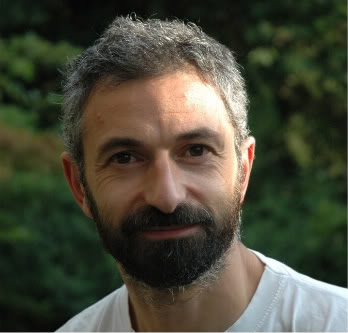 First in a series of interviews with participants at the 2009 Association of Tropical Biology and Conservation (ATBC) conference. Sometimes we lose sight of the forest by staring at the trees. When this happens we need something jarring and eloquent to pull us back to view the big picture again. This is what tropical ecologist […]
First in a series of interviews with participants at the 2009 Association of Tropical Biology and Conservation (ATBC) conference. Sometimes we lose sight of the forest by staring at the trees. When this happens we need something jarring and eloquent to pull us back to view the big picture again. This is what tropical ecologist […]
New center for studying temperate rainforests announced in Alaska
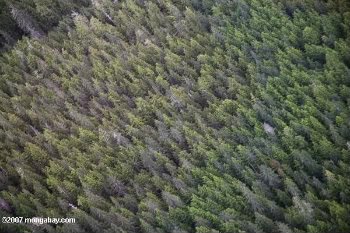 Temperate rainforests will soon have a new center in Juneau, Alaska. It is hoped that the Alaska Coastal Rainforest Center (ACRC) will instigate new research and educational opportunities. The center will be a collaboration between government agencies and local universities, including the University of Alaska Southeast, University of Alaska Fairbanks, the Forest Service’s Pacific Northwest […]
Temperate rainforests will soon have a new center in Juneau, Alaska. It is hoped that the Alaska Coastal Rainforest Center (ACRC) will instigate new research and educational opportunities. The center will be a collaboration between government agencies and local universities, including the University of Alaska Southeast, University of Alaska Fairbanks, the Forest Service’s Pacific Northwest […]
World’s rarest tree kangaroo gets help from those who once hunted it
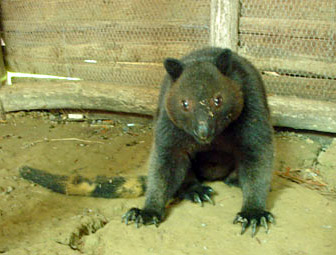 An interview with Jim and Jean Thomas of the Tenkile Conservation Alliance The world’s rarest tree kangaroo is in the midst of a comeback in a remote part of Papua New Guinea. On the brink of extinction in 2001 with a population estimated at fewer than 100 individuals, Scott’s Tree Kangaroo (Dendrolagus scottae), or the […]
An interview with Jim and Jean Thomas of the Tenkile Conservation Alliance The world’s rarest tree kangaroo is in the midst of a comeback in a remote part of Papua New Guinea. On the brink of extinction in 2001 with a population estimated at fewer than 100 individuals, Scott’s Tree Kangaroo (Dendrolagus scottae), or the […]
Saving the tsingy forests in Madagascar
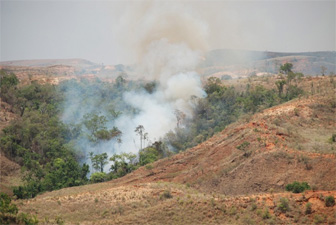 After the success of their Sahafina Forest project, Biodiversity Conservation Madagascar is now branching out to the tsingy forest of Beanka, a project set to launch in October this year. Biodiversity Conservation Madagascar (BCM) has been granted a 25-year lease on a 14,000-hectare area of dry hardwood forest, the Beanka tsingy, situated 75 km east […]
After the success of their Sahafina Forest project, Biodiversity Conservation Madagascar is now branching out to the tsingy forest of Beanka, a project set to launch in October this year. Biodiversity Conservation Madagascar (BCM) has been granted a 25-year lease on a 14,000-hectare area of dry hardwood forest, the Beanka tsingy, situated 75 km east […]
Saving one of the last tropical dry forests, an interview with Edwina von Gal
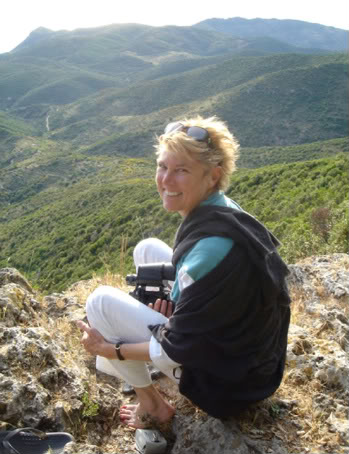
More US students tackling science and engineering
In 2007 the number of US students enrolling in graduate programs in either science or engineering rose by 3.3 percent, nearly double the increase from the previous year, according to new data collected by The National Science Foundations Division of Science Resources Statistics (SRS). Science programs, excluding engineering, saw a rise of 2.4 percent and […]
Conservation through commerce in Costa Rica
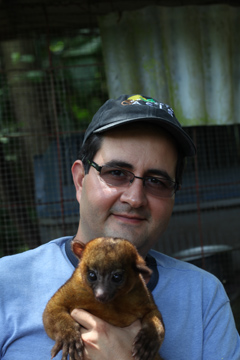 An interview with Alvaro del Castillo, director of Proyecto Asís in Costa Rica While Costa Rica is lauded for its conservation ethic, environmental concerns remain in the country. Overdevelopment is tied to many issues, including pollution, degradation of ecosystems, deforestation, and soil erosion, while unsustainable fishing plagues coastal waters. Costa Rica’s wildlife is also directly […]
An interview with Alvaro del Castillo, director of Proyecto Asís in Costa Rica While Costa Rica is lauded for its conservation ethic, environmental concerns remain in the country. Overdevelopment is tied to many issues, including pollution, degradation of ecosystems, deforestation, and soil erosion, while unsustainable fishing plagues coastal waters. Costa Rica’s wildlife is also directly […]
New rainforest reserve in Congo benefits bonobos and locals
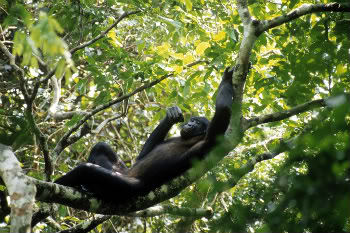 A partnership between local villages and conservation groups, headed up by the Bonobo Conservation Initiative (BCI), has led to the creation of a new 1,847 square mile (4,875 square kilometer) reserve in the Democratic Republic of Congo (DRC). The reserve will save some of the region’s last pristine forests: ensuring the survival of the embattled […]
A partnership between local villages and conservation groups, headed up by the Bonobo Conservation Initiative (BCI), has led to the creation of a new 1,847 square mile (4,875 square kilometer) reserve in the Democratic Republic of Congo (DRC). The reserve will save some of the region’s last pristine forests: ensuring the survival of the embattled […]
Plant communities changing across the globe, says scientist Sasha Wright
 An interview with Sasha Wright, a graduate student studying plant ecology at the University of Wisconsin-Milwaukee. Mongabay.com’s third in a new series of interviews with ‘Young Scientists’.
An interview with Sasha Wright, a graduate student studying plant ecology at the University of Wisconsin-Milwaukee. Mongabay.com’s third in a new series of interviews with ‘Young Scientists’.
Seeking out the world’s rarest and most endangered birds
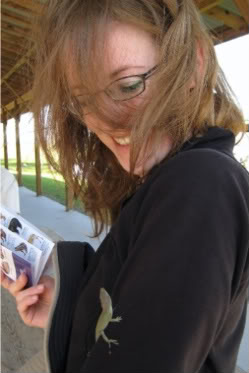 An Interview with Katrina Fellerman of the Zoological Society of London’s (ZSL) Evolutionarily Distinct & Globally Endangered Program. Mongabay.com’s second in a new series of interviews with ‘Young Scientists’.
An Interview with Katrina Fellerman of the Zoological Society of London’s (ZSL) Evolutionarily Distinct & Globally Endangered Program. Mongabay.com’s second in a new series of interviews with ‘Young Scientists’.
Manatees become conservation symbol for communities in Mexico
Manatees become conservation symbol for communities in Mexico Manatees become conservation symbol for communities in Mexico mongabay.com December 1, 2008
Review of the indoor rainforest at San Francisco’s new Academy of Sciences
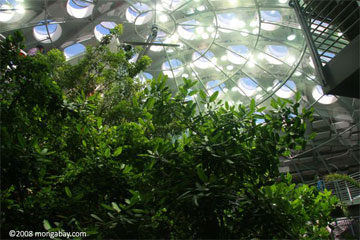 Review of the indoor rainforest at San Francisco’s new Academy of Sciences Review of the indoor rainforest at San Francisco’s new Academy of Sciences by Harry S. Pariser, special to mongabay.com November 4, 2008 Guidebook author Harry S. Pariser evaluates the rainforest dome at San Francisco’s new Academy of Sciences
Review of the indoor rainforest at San Francisco’s new Academy of Sciences Review of the indoor rainforest at San Francisco’s new Academy of Sciences by Harry S. Pariser, special to mongabay.com November 4, 2008 Guidebook author Harry S. Pariser evaluates the rainforest dome at San Francisco’s new Academy of Sciences
Zoos: Why a Revolution is Necessary to Justify Them
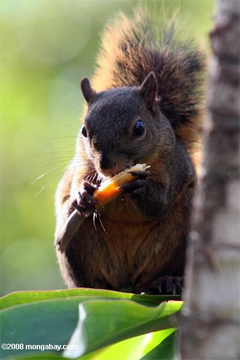 <!DOCTYPE HTML PUBLIC "-//W3C//DTD HTML 3.2//EN"> Zoos: Why a Revolution is Necessary to Justify Them Zoos: Why a Revolution is Necessary to Justify Them Jeremy Leon Hance, mongabay.com October 6, 2008 When the Grey Squirrel Met the Siberian Tiger
<!DOCTYPE HTML PUBLIC "-//W3C//DTD HTML 3.2//EN"> Zoos: Why a Revolution is Necessary to Justify Them Zoos: Why a Revolution is Necessary to Justify Them Jeremy Leon Hance, mongabay.com October 6, 2008 When the Grey Squirrel Met the Siberian Tiger
7 steps to solve the global biodiversity crisis
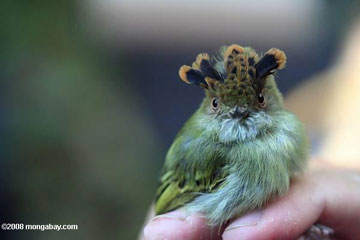 7 steps to solve the global biodiversity crisis 7 steps to solve the global biodiversity crisis mongabay.com August 11, 2008 Prominent Stanford scientists propose seven measures to end the current human-driven mass extinction event. Many biologists believe Earth is entering a sixth mass extinction event, one that has is the direct of human activities, including […]
7 steps to solve the global biodiversity crisis 7 steps to solve the global biodiversity crisis mongabay.com August 11, 2008 Prominent Stanford scientists propose seven measures to end the current human-driven mass extinction event. Many biologists believe Earth is entering a sixth mass extinction event, one that has is the direct of human activities, including […]
$100 laptop hit with production delays
 $100 laptop hit with production delays $100 laptop hit with production delays mongabay.com October 24, 2007 The “$100 laptop” — a computer designed for children in poor countries — has been hit by production delays and will likely miss an important target date for a charity program, according to reports from InformationWeek and other outlets. […]
$100 laptop hit with production delays $100 laptop hit with production delays mongabay.com October 24, 2007 The “$100 laptop” — a computer designed for children in poor countries — has been hit by production delays and will likely miss an important target date for a charity program, according to reports from InformationWeek and other outlets. […]
conservationists need to work with, not against, rural poor
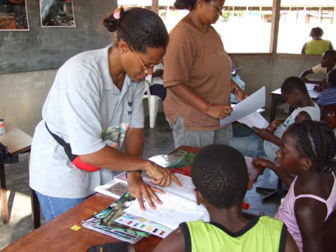 Conservationists need to work with, not against, rural poor An Interview with Marie-Louise Felix of WWF Guianas: Conservationists need to work with, not against, rural poor mongabay.com October 25, 2007 Rural populations have long been demonized by conservationists, but this is changing. Increasingly, conservation groups see that without the support of rural populations, protected areas […]
Conservationists need to work with, not against, rural poor An Interview with Marie-Louise Felix of WWF Guianas: Conservationists need to work with, not against, rural poor mongabay.com October 25, 2007 Rural populations have long been demonized by conservationists, but this is changing. Increasingly, conservation groups see that without the support of rural populations, protected areas […]
Intel may power next generation of “$100 laptop”
 Intel may power next generation of “$100 laptop” Intel may power next generation of “$100 laptop” mongabay.com September 7, 2007 Intel is in talks to speed up the processor of the “$100 laptop” for children in developing countries, reports PC World. Presently the laptop, designed and distributed by the nonprofit One Laptop Per Child (OLPC) […]
Intel may power next generation of “$100 laptop” Intel may power next generation of “$100 laptop” mongabay.com September 7, 2007 Intel is in talks to speed up the processor of the “$100 laptop” for children in developing countries, reports PC World. Presently the laptop, designed and distributed by the nonprofit One Laptop Per Child (OLPC) […]
Education key to financial support for biodiversity
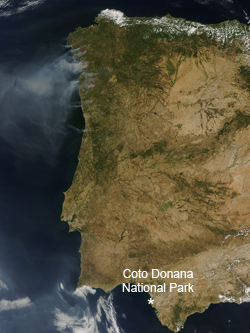 Education key to financial support for biodiversity Education key to financial support for biodiversity Jeremy Hance, mongabay.com September 6, 2007 On the coast of south-western Spain, Coto Donana National Park posses a unique wealth of wildlife; its proximity to Africa has allowed for several African species to mix with a wide variety of European: Egyptian […]
Education key to financial support for biodiversity Education key to financial support for biodiversity Jeremy Hance, mongabay.com September 6, 2007 On the coast of south-western Spain, Coto Donana National Park posses a unique wealth of wildlife; its proximity to Africa has allowed for several African species to mix with a wide variety of European: Egyptian […]
Rainforest educational resource launched in 19 languages
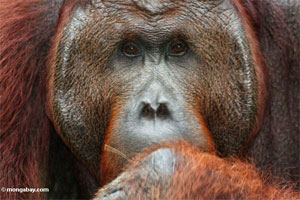 Rainforest educational resource launched in 19 languages Rainforest educational resource launched in 19 languages mongabay.com June 5, 2007 Mongabay.com, a leading tropical rainforest information web site, today announced the availability of a rainforest educational resource in 19 languages at world.mongabay.com. The site explains what constitutes a tropical rainforest, why they are important, why they are […]
Rainforest educational resource launched in 19 languages Rainforest educational resource launched in 19 languages mongabay.com June 5, 2007 Mongabay.com, a leading tropical rainforest information web site, today announced the availability of a rainforest educational resource in 19 languages at world.mongabay.com. The site explains what constitutes a tropical rainforest, why they are important, why they are […]
conservation is saving lemurs and helping people in Madagascar
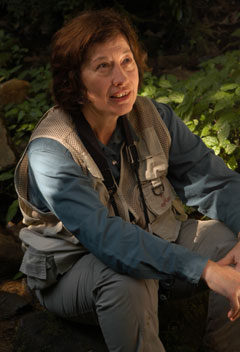 An interview with lemur expert Dr. Patricia Wright Conservation is saving lemurs and helping people in Madagascar: An interview with lemur expert Dr. Patricia Wright wildmadagascar.org May 7, 2007 Madagascar, an island nation that lies off the coast of southeastern Africa, has long been famous for its unique and diverse species of wildlife, especially lemurs—primates […]
An interview with lemur expert Dr. Patricia Wright Conservation is saving lemurs and helping people in Madagascar: An interview with lemur expert Dr. Patricia Wright wildmadagascar.org May 7, 2007 Madagascar, an island nation that lies off the coast of southeastern Africa, has long been famous for its unique and diverse species of wildlife, especially lemurs—primates […]
Summer babies do worse in school due to pesticides
 Spring babies have reduced academic performance due to pesticides in the Midwest Spring babies do worse in school due to pesticides Date of conception impacts baby’s future academic achievement mongabay.com May 6, 2007 A new study links conception date to academic achievement later in life. The reason? Summertime pesticide use in the U.S. Midwest. Analyzing […]
Spring babies have reduced academic performance due to pesticides in the Midwest Spring babies do worse in school due to pesticides Date of conception impacts baby’s future academic achievement mongabay.com May 6, 2007 A new study links conception date to academic achievement later in life. The reason? Summertime pesticide use in the U.S. Midwest. Analyzing […]
Rainforest education site recognized with community award
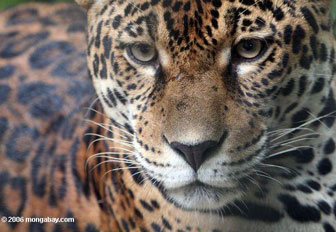 Rainforest education site recognized with community award Rainforest education site recognized with community award mongabay.com March 29, 2007 Mongabay.com, a leading environmental science web site, was awarded as this week’s Cingular Spotlight community hero.by San Francisco-based radio station Energy 92.7 FM. The $500 cash prize was donated to the Amazon Conservation Team, a group doing […]
Rainforest education site recognized with community award Rainforest education site recognized with community award mongabay.com March 29, 2007 Mongabay.com, a leading environmental science web site, was awarded as this week’s Cingular Spotlight community hero.by San Francisco-based radio station Energy 92.7 FM. The $500 cash prize was donated to the Amazon Conservation Team, a group doing […]
Biodiversity extinction crisis looms says renowned biologist
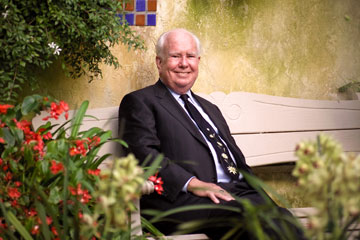 An Interview with Dr. Peter Raven, director of the Missouri Botanical Garden Jump to Interview What do tigers in India, chameleons in Madagascar, redwood trees in California, and tube worms living in deep-sea hydrothermal vents have in common? They are all components of Earth’s biological diversity, or “biodiversity” for short. Biodiversity is the sum of […]
An Interview with Dr. Peter Raven, director of the Missouri Botanical Garden Jump to Interview What do tigers in India, chameleons in Madagascar, redwood trees in California, and tube worms living in deep-sea hydrothermal vents have in common? They are all components of Earth’s biological diversity, or “biodiversity” for short. Biodiversity is the sum of […]
Microsoft wants in on $100 laptop for poor children
 Microsoft wants in on $100 laptop for poor children Microsoft wants in on $100 laptop for poor children mongabay.com December 6, 2006 Looks like Microsoft may want to be involved in the One Laptop Per Child project (OLPC) after all. Reports indicate that Microsoft wants to make its Windows CE operating system, one usually installed […]
Microsoft wants in on $100 laptop for poor children Microsoft wants in on $100 laptop for poor children mongabay.com December 6, 2006 Looks like Microsoft may want to be involved in the One Laptop Per Child project (OLPC) after all. Reports indicate that Microsoft wants to make its Windows CE operating system, one usually installed […]
Canopy research is key to understanding rainforests
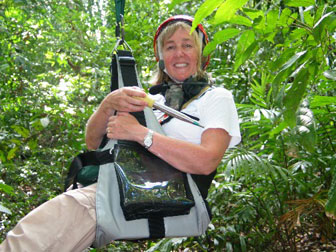 Canopy research is key to understanding rainforests An interview with canopy expert Dr. Meg Lowman: Canopy research is key to understanding rainforests Rhett A. Butler, mongabay.com November 28, 2006 Home to perhaps half the world’s terrestrial species, rainforests are the most biodiverse ecosystems on the planet. However, when one strolls through the forest, this biodiversity […]
Canopy research is key to understanding rainforests An interview with canopy expert Dr. Meg Lowman: Canopy research is key to understanding rainforests Rhett A. Butler, mongabay.com November 28, 2006 Home to perhaps half the world’s terrestrial species, rainforests are the most biodiverse ecosystems on the planet. However, when one strolls through the forest, this biodiversity […]
87% of Americans have used Internet for science research
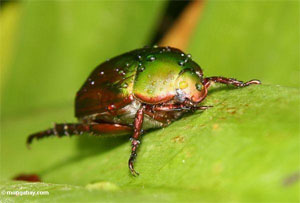 87% of Americans have used Internet for science research 87% of Americans have used Internet for science research mongabay.com November 20, 2006 40 million Americans use the Internet as their primary source of news and information about science according to a new study by the Pew Internet Project and the Exploratorium, a museum based in […]
87% of Americans have used Internet for science research 87% of Americans have used Internet for science research mongabay.com November 20, 2006 40 million Americans use the Internet as their primary source of news and information about science according to a new study by the Pew Internet Project and the Exploratorium, a museum based in […]
A look at the biodiversity extinction crisis
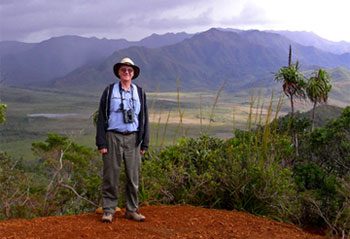 A look at the biodiversity extinction crisis A look at the biodiversity extinction crisis Education is the key says tropical biologist David L. Pearson Rhett A. Butler, mongabay.com October 6, 2006 An interview with Dr. David L. Pearson As tropical forests — the world’s biological treasure troves — continue to dwindle, biologists are racing to […]
A look at the biodiversity extinction crisis A look at the biodiversity extinction crisis Education is the key says tropical biologist David L. Pearson Rhett A. Butler, mongabay.com October 6, 2006 An interview with Dr. David L. Pearson As tropical forests — the world’s biological treasure troves — continue to dwindle, biologists are racing to […]
San Francisco aquarium throws party Thursday night
 San Francisco aquarium throws party Thursday night San Francisco aquarium throws party Thursday night mongabay.com August 15, 2006 The Steinhart Aquarium in San Francisco is throwing its monthly after-work party this coming Thursday, August 17, 2006 from 5-9 pm. The theme is “life in extreme environments” which explores the question of whether there is life […]
San Francisco aquarium throws party Thursday night San Francisco aquarium throws party Thursday night mongabay.com August 15, 2006 The Steinhart Aquarium in San Francisco is throwing its monthly after-work party this coming Thursday, August 17, 2006 from 5-9 pm. The theme is “life in extreme environments” which explores the question of whether there is life […]
Physically active kids are better students
Physically active kids are better students Physically active kids are better students mongabay.com August 3, 2006 Physically active middle school students tend to do better in school than their more sedentary classmates, according to a new study published in the August issue of Medicine & Science in Sports & Exercise by researchers from Michigan State […]
High school students compete in solar car race
 High school students compete in solar car race High school students compete in solar car race Modified news release from SCHOTT July 13, 2006 Powered by SCHOTT Solar Cells, Sundancer Makes Bid for 6th Consecutive Championship at Dell-Winston School Solar Car Challenge Beginning on July 16th, high school students from the US, Puerto Rico and […]
High school students compete in solar car race High school students compete in solar car race Modified news release from SCHOTT July 13, 2006 Powered by SCHOTT Solar Cells, Sundancer Makes Bid for 6th Consecutive Championship at Dell-Winston School Solar Car Challenge Beginning on July 16th, high school students from the US, Puerto Rico and […]
Saving the world in six “easy” steps
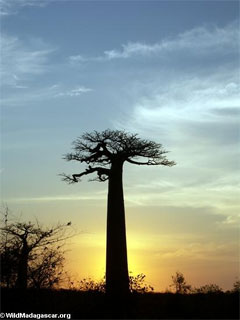 Saving the world in six “easy” steps Saving the world in six “easy” steps Rhett A. Butler, mongabay.com July 6, 2006 General ideas toward a future where I won’t have to apologize to my grandkids Lots of people more intelligent than I am have theorized ways to “save the world” in terms of the preserving […]
Saving the world in six “easy” steps Saving the world in six “easy” steps Rhett A. Butler, mongabay.com July 6, 2006 General ideas toward a future where I won’t have to apologize to my grandkids Lots of people more intelligent than I am have theorized ways to “save the world” in terms of the preserving […]
Environmental education lacking in the U.S. finds new study
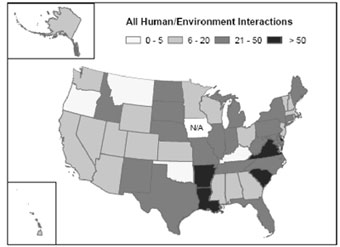 Environmental education lacking in the U.S. finds new study Environmental education lacking in the U.S. finds new study mongabay.com June 29, 2006 A new study found that there is a general lack of consensus when it comes to teaching students about human interaction with the environment. Scientists at the Lamont-Doherty Earth Observatory examined 49 state […]
Environmental education lacking in the U.S. finds new study Environmental education lacking in the U.S. finds new study mongabay.com June 29, 2006 A new study found that there is a general lack of consensus when it comes to teaching students about human interaction with the environment. Scientists at the Lamont-Doherty Earth Observatory examined 49 state […]
Buffet to give nearly $31 billion to Gates foundation
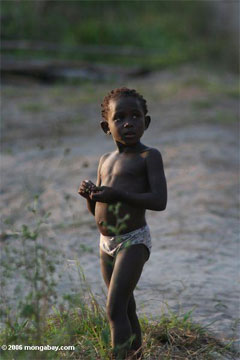 Buffet to give nearly $31 billion to Gates foundation Buffet to give nearly $31 billion to Gates foundation mongabay.com June 25, 2006 In an interview with Fortune magazine, Berkshire Hathaway Chairman Warren Buffett announced he will give nearly $31 billion — most of his wealth — to the Bill & Melinda Gates Foundation. The decision […]
Buffet to give nearly $31 billion to Gates foundation Buffet to give nearly $31 billion to Gates foundation mongabay.com June 25, 2006 In an interview with Fortune magazine, Berkshire Hathaway Chairman Warren Buffett announced he will give nearly $31 billion — most of his wealth — to the Bill & Melinda Gates Foundation. The decision […]
High School Students Compete in National Entrepreneurship Tournament
High School Students Compete in National Entrepreneurship Tournament High School Students Compete in National Entrepreneurship Tournament SAGE May 18, 2006 More than 100 high school students from six states will be traveling to New York next week to try to become the USA SAGE champion and earn an invitation to represent their country at the […]
Life expectancy below 40 for some African countries, global population growth rates slow
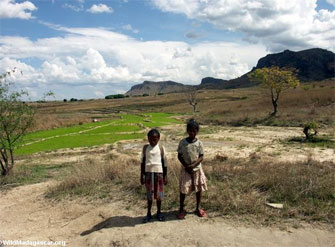 Life expectancy below 40 for some African countries, global population growth rates slow Life expectancy below 40 for some African countries, global population growth rates slow Rhett A. Butler, mongabay.com April 16, 2006 Children born in six African countries can expect to die before their 41st birthday while kids born in 16 countries can expect […]
Life expectancy below 40 for some African countries, global population growth rates slow Life expectancy below 40 for some African countries, global population growth rates slow Rhett A. Butler, mongabay.com April 16, 2006 Children born in six African countries can expect to die before their 41st birthday while kids born in 16 countries can expect […]
Rainforest education site goes online; resources for students, teachers, and journalists
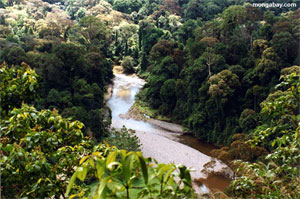 Rainforest education site goes online; resources for students, researchers, and journalists Rainforest education site goes online; resources for students, teachers, and journalists mongabay.com April 12, 2006 With Earth Day fast approaching it’s time to take another look at the world’s most biodiverse ecosystems Mongabay.com, a leading environmental-science web site, announced today a revised version of […]
Rainforest education site goes online; resources for students, researchers, and journalists Rainforest education site goes online; resources for students, teachers, and journalists mongabay.com April 12, 2006 With Earth Day fast approaching it’s time to take another look at the world’s most biodiverse ecosystems Mongabay.com, a leading environmental-science web site, announced today a revised version of […]
Environmentalism is born with exposure to nature before age 11
 A new study out of Cornell University suggests that environmentalism is born in children who are exposed to nature before the age of 11. Nancy Wells, assistant professor of design and environmental analysis in the College of Human Ecology at Cornell, and Kristi Lekies, a research associate in human development at Cornell, analyzed data from […]
A new study out of Cornell University suggests that environmentalism is born in children who are exposed to nature before the age of 11. Nancy Wells, assistant professor of design and environmental analysis in the College of Human Ecology at Cornell, and Kristi Lekies, a research associate in human development at Cornell, analyzed data from […]
New online photographic guide to coral reef fish larvae unlocks secrets of young fish
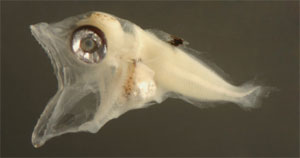 Online photographic guide to coral reef fish larvae New online photographic guide to coral reef fish larvae unlocks secrets of young fish Coralreeffish.com release December 13, 2005 Coralreeffish.com, a coral reef fish research site, today announced the availability of a photographic web-guide to the late-stage larvae of coral reef fishes. The guide is aimed at […]
Online photographic guide to coral reef fish larvae New online photographic guide to coral reef fish larvae unlocks secrets of young fish Coralreeffish.com release December 13, 2005 Coralreeffish.com, a coral reef fish research site, today announced the availability of a photographic web-guide to the late-stage larvae of coral reef fishes. The guide is aimed at […]
Africa looks to build scientific expertise at Nairobi conference
Africa looks to build scientific expertise at Nairobi conference Africa looks to build scientific expertise at Nairobi conference National Academies’ National Research Council news release November 9, 2005 Stronger African science academies can help save lives or raise the standard of living by settling questions on topics such as malaria prevention and sustainable development, said […]
Learning and memory can become toxic with neurodegenerative diseases
Learning and memory can become toxic with neurodegenerative diseases Learning and memory can become toxic with neurodegenerative diseases University of Rochester Medical Center news release November 7, 2005 Scientists at the University of Rochester Medical Center have targeted a new culprit and method of attack on neurologic functions in diseases such as HIV-1-associated dementia and […]
Madagascar educational resource launched
 Madagascar educational resource launched Madagascar educational resource launched wildmadagascar.org October 15, 2005 Madagascar chameleon WildMadagascar.org, a leading information site on Madagascar, today announced the availability of educational materials to help students learn about the island of Madagascar. “While these materials are currently a work in progress,” says Rhett A. Butler, founder of the WildMadagascar.org site, […]
Madagascar educational resource launched Madagascar educational resource launched wildmadagascar.org October 15, 2005 Madagascar chameleon WildMadagascar.org, a leading information site on Madagascar, today announced the availability of educational materials to help students learn about the island of Madagascar. “While these materials are currently a work in progress,” says Rhett A. Butler, founder of the WildMadagascar.org site, […]
After Empowering ecologists with informatics education and training
Empowering ecologists with informatics education and training Empowering ecologists with informatics education and training Ecological Society of America August 10, 2005 The following is an abstract from this week’s Ecological Society of America meeting in Montreal. Ecological research needs of the 21st century are being enabled by the development of new cyberinfrastructure for management, integration, […]
Q&A: What are the most spoken languages on earth?
Q&A: What are the most spoken languages on earth? Q&A: What are the most spoken languages on earth? mongabay.com July 25, 2005 According to figures from UNESCO, the United Nations Educational, Scientific and Cultural Organization, the most widely spoken language on earth is Mandarin which is spoken as a first language by nearly a billion […]
Program encourages entrepreneurship among Nigerian high school students
Program encourages entrepreneurship among Nigerian high school students Program encourages entrepreneurship among Nigerian high school students California State University, Chico Press release July 18, 2005 “SAGE” High School Students from Kaduna Going to USA for World Cup Competition Secondary school students from Nigeria competing against Poland? Russia versus Ghana? US versus Tajikistan? South Africa versus […]
Rainforest information site for school kids launched
Rainforest information site for school kids launched Rainforest information site for school kids launched mongabay.com July 7, 2005 Today mongabay.com launched a kids-oriented version of its popular web site on tropical rainforests. Kids.mongabay.com offers information on tropical rainforest ecology and looks at such questions as Why are rainforests important? How can we save rainforests? Why […]
Developing sustainable business models that address the needs of the world’s poor
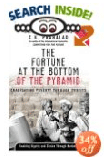 Developing sustainable business models that address the needs of the world’s poor Developing sustainable business models that address the needs of the world’s poor mongabay.com May 25, 2005 People involved with international development and poverty alleviation programs are increasingly looking toward the private sector for inspiration and assistance. Many believe that involving business in such […]
Developing sustainable business models that address the needs of the world’s poor Developing sustainable business models that address the needs of the world’s poor mongabay.com May 25, 2005 People involved with international development and poverty alleviation programs are increasingly looking toward the private sector for inspiration and assistance. Many believe that involving business in such […]
ExxonMobil asked to stay out of Arctic National Wildlife Refuge by shareholder group
ExxonMobil asked to stay out of Arctic National Wildlife Refuge by shareholder group ExxonMobil asked to stay out of Arctic National Wildlife Refuge by shareholder group Press Release May 25, 2005 Green Century Capital Management, U.S. PIRG Education Fund, and Clean Yield Asset Management will be attending the ExxonMobil shareholder meeting later this week in […]
A look at why is Madagascar so poor
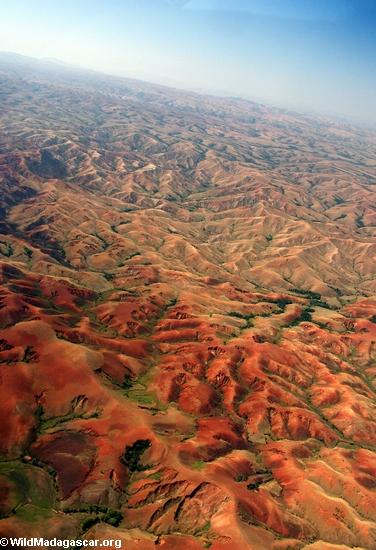 A look at why is Madagascar so poor A look at why is Madagascar so poor mongabay.com May 22, 2005 Madagascar is one of the world’s poorest countries. In the Human Development Index of 2003, an indicator created by the United Nations Development Programme which measures achievements in terms of life expectancy, educational attainment and […]
A look at why is Madagascar so poor A look at why is Madagascar so poor mongabay.com May 22, 2005 Madagascar is one of the world’s poorest countries. In the Human Development Index of 2003, an indicator created by the United Nations Development Programme which measures achievements in terms of life expectancy, educational attainment and […]
indigenous people oppose National Geographic, IBM project
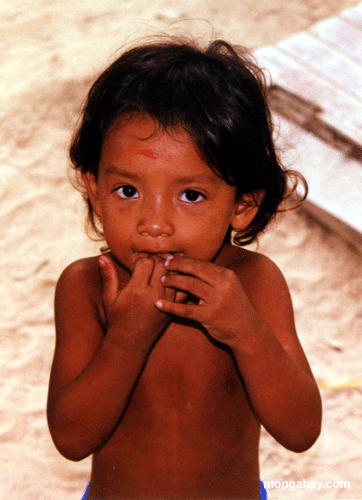 Indigenous groups oppose National Geographic, IBM project Indigenous groups oppose National Geographic, IBM project Tina Butler, mongabay.com May 9, 2005 [continued from page 1] Despite the seemingly beneficial aspects of the project to native populations, this focus on the collection of genetic materials from indigenous peoples is where the controversy behind this project resides. The […]
Indigenous groups oppose National Geographic, IBM project Indigenous groups oppose National Geographic, IBM project Tina Butler, mongabay.com May 9, 2005 [continued from page 1] Despite the seemingly beneficial aspects of the project to native populations, this focus on the collection of genetic materials from indigenous peoples is where the controversy behind this project resides. The […]
World population growth rate continues to plummet
World population growth rate continues to plummet World population growth rate continues to plummet An updated report from the U.N. finds population trends In many countries population not replacing itself mongabay.com May 2, 2005 According to figures released earlier this year by the UN, global birth rates fell to the lowest level in recorded history […]
New media resource on the wildlife of Madagscar
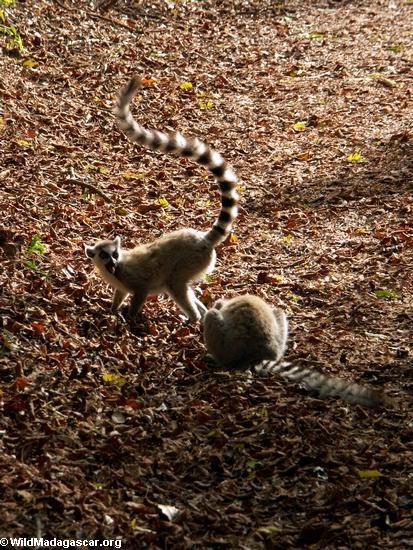 New media resource on the wildlife of Madagascar; WildMadagascar.org release New media resource on the wildlife of Madagascar WildMadagascar.org announces availability of free media documents on Madagscar Rhett Butler, mongabay.com April 25, 2005 WildMadagascar.org, a leading information site on Madagascar, today announced the availability of PDF documents on the wildlife of Madagascar. The colorful “Wildlife […]
New media resource on the wildlife of Madagascar; WildMadagascar.org release New media resource on the wildlife of Madagascar WildMadagascar.org announces availability of free media documents on Madagscar Rhett Butler, mongabay.com April 25, 2005 WildMadagascar.org, a leading information site on Madagascar, today announced the availability of PDF documents on the wildlife of Madagascar. The colorful “Wildlife […]
Is Earth Day a waste of time?
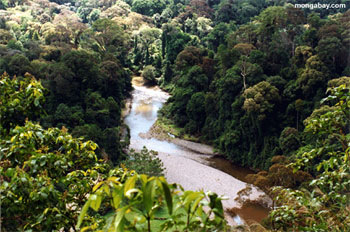 Earth Day: Another gimmick day full of false promises and empty pledges or a day of reflection? Borneo rainforest, photo by R. Butler So today is Earth Day. You may look at Earth Day as another useless “holiday” that appears on your calendar, yet does not warrant an actual vacation day, where people parade around […]
Earth Day: Another gimmick day full of false promises and empty pledges or a day of reflection? Borneo rainforest, photo by R. Butler So today is Earth Day. You may look at Earth Day as another useless “holiday” that appears on your calendar, yet does not warrant an actual vacation day, where people parade around […]
The Teacher and the Student: Innocence, Exploration, and Redefinition in the 1950s World of Fashion
The Teacher and the Student: Innocence, Exploration, and Redefinition in the 1950s World of Fashion The Counterfeit Body: Fashion Photography and the Deceptions of Femininity, Sexuality, Authenticity and Self in the 1950s, 60s and 70s The Teacher and the Student: Innocence, Exploration, and Redefinition in the 1950s World of Fashion Tina Butler, mongabay.com May 9, […]
Feeds: news | india | latam | brasil | indonesia
 On today’s episode of the Mongabay Newscast, we speak with Fred Swaniker, the founder of the African Leadership University, which recently launched a School of Wildlife Conservation to help young Africans develop the skills and knowledge necessary to “own and drive” the conservation agenda on the African continent. Listen here: Africa is facing some […]
On today’s episode of the Mongabay Newscast, we speak with Fred Swaniker, the founder of the African Leadership University, which recently launched a School of Wildlife Conservation to help young Africans develop the skills and knowledge necessary to “own and drive” the conservation agenda on the African continent. Listen here: Africa is facing some […] These were the most read stories published by our Spanish-language service, Mongabay-Latam, last week: Scientists in Colombia strive to understand what is happening with the Athelopus frog genus in order to save them from extinction, while a cattle ranch in Bolivia opts for an ambitious sustainable tourism project, and more. Keep up to date with […]
These were the most read stories published by our Spanish-language service, Mongabay-Latam, last week: Scientists in Colombia strive to understand what is happening with the Athelopus frog genus in order to save them from extinction, while a cattle ranch in Bolivia opts for an ambitious sustainable tourism project, and more. Keep up to date with […] Modern day expeditions face a collection dilemma as scientists consider ethics and endangerment A tray of Eriocnemis (a genus of hummingbird) specimens, Swedish Museum of Natural History – Naturhistoriska Riksmuseet,Stockholm, CC BY-SA 3,0 License, Wikimedia. In 1912, a group of intrepid explorers led by Rollo and Ida Beck, widely acknowledged to be the foremost marine […]
Modern day expeditions face a collection dilemma as scientists consider ethics and endangerment A tray of Eriocnemis (a genus of hummingbird) specimens, Swedish Museum of Natural History – Naturhistoriska Riksmuseet,Stockholm, CC BY-SA 3,0 License, Wikimedia. In 1912, a group of intrepid explorers led by Rollo and Ida Beck, widely acknowledged to be the foremost marine […] su Dr. Jane Goodall with Freud, a chimpanzee from Gombe. Photograph © Michael Neugebauer Jane Goodall is not only arguably the most famous conservationist who ever lived, but also the most well-known and respected female scientist on the planet today. Her path to reach that stature is as unlikely as it is inspiring. Told to […]
su Dr. Jane Goodall with Freud, a chimpanzee from Gombe. Photograph © Michael Neugebauer Jane Goodall is not only arguably the most famous conservationist who ever lived, but also the most well-known and respected female scientist on the planet today. Her path to reach that stature is as unlikely as it is inspiring. Told to […] Courtesy of Junior Explorers Kids are spending more time using tablets and smart phones for learning and entertainment. But hours spent gaming, Tweeting, and playing on Instagram and Facebook, may mean less engagement with nature, potentially making it more difficult for conservation organizations to inspire and influence the next generation of donors and decision makers. […]
Courtesy of Junior Explorers Kids are spending more time using tablets and smart phones for learning and entertainment. But hours spent gaming, Tweeting, and playing on Instagram and Facebook, may mean less engagement with nature, potentially making it more difficult for conservation organizations to inspire and influence the next generation of donors and decision makers. […] An interview with Emily Graslie – host of the video blog The Brain Scoop and Chief Curiosity Correspondent at Chicago’s Field Museum of Natural History Have you ever been offered the job of your dreams without knowing you were being interviewed? Have you ever communicated with a 5-year-old about the wonders of Salmonella? Have you […]
An interview with Emily Graslie – host of the video blog The Brain Scoop and Chief Curiosity Correspondent at Chicago’s Field Museum of Natural History Have you ever been offered the job of your dreams without knowing you were being interviewed? Have you ever communicated with a 5-year-old about the wonders of Salmonella? Have you […] Between the Forest and the Sea: Passing Down Traditions Part I of this series: Life & Climate Change in Guna Yala Part II of this series: The Yarsuisuit Collective In 1925, Nele Kantule led a revolution that would make Guna Yala an independent and sovereign indigenous territory within Panama. Since then, the Guna have maintained […]
Between the Forest and the Sea: Passing Down Traditions Part I of this series: Life & Climate Change in Guna Yala Part II of this series: The Yarsuisuit Collective In 1925, Nele Kantule led a revolution that would make Guna Yala an independent and sovereign indigenous territory within Panama. Since then, the Guna have maintained […] Have conservationists become too pessimistic for their own good—and the good of their cause? Tad Lo waterfalls in Laos. Photo by: Rhett A. Butler. Here’s a challenge: take a conservationist out for a drink and ask them about their work. Nine times out of ten—or possibly more—you’ll walk away feeling frustrated, despondent, and utterly hopeless. […]
Have conservationists become too pessimistic for their own good—and the good of their cause? Tad Lo waterfalls in Laos. Photo by: Rhett A. Butler. Here’s a challenge: take a conservationist out for a drink and ask them about their work. Nine times out of ten—or possibly more—you’ll walk away feeling frustrated, despondent, and utterly hopeless. […].600.jpg) Uncovering the reproductive mysteries of the little-known giant armadillo. Arguably the most important moment in any animal’s life— whether it be a whale, a human, or a mosquito— is the act of giving birth, of bringing a new member of the species into the world. It’s no wonder that biologists treat reproduction— from conception to […]
Uncovering the reproductive mysteries of the little-known giant armadillo. Arguably the most important moment in any animal’s life— whether it be a whale, a human, or a mosquito— is the act of giving birth, of bringing a new member of the species into the world. It’s no wonder that biologists treat reproduction— from conception to […] Scientists need to start speaking out on overpopulation Suburb development in Colorado Springs, Colorado U.S. The population of the U.S. is currently growing at around 0.7 percent annually. Photo by: David Shankbone. It took humans around 200,000 years to reach a global population of one billion. But, in two hundred years we’ve septupled that. In […]
Scientists need to start speaking out on overpopulation Suburb development in Colorado Springs, Colorado U.S. The population of the U.S. is currently growing at around 0.7 percent annually. Photo by: David Shankbone. It took humans around 200,000 years to reach a global population of one billion. But, in two hundred years we’ve septupled that. In […] In a world where extinctions are almost commonplace and global warming barely raises an eyebrow, very few of us can return to find the places we grew up in unsullied by development. Sometimes, all that is left of a favorite grove of trees or strip of forest are memories. Through Izilwane: Voices for Biodiversity Project, […]
In a world where extinctions are almost commonplace and global warming barely raises an eyebrow, very few of us can return to find the places we grew up in unsullied by development. Sometimes, all that is left of a favorite grove of trees or strip of forest are memories. Through Izilwane: Voices for Biodiversity Project, […] The link between good economic policy and climate change mitigation is instigated by policies such as the triple-bottom line, carbon limitations, and pro-environmental legislation. However, economic inequality is a little explored piece of the successful fight against climate change. For climate change mitigation and good economic policy to work, economic growth must be broad-based. Indeed, […]
The link between good economic policy and climate change mitigation is instigated by policies such as the triple-bottom line, carbon limitations, and pro-environmental legislation. However, economic inequality is a little explored piece of the successful fight against climate change. For climate change mitigation and good economic policy to work, economic growth must be broad-based. Indeed, […] Colleen Begg will be speaking at the Wildlife Conservation Network Expo in San Francisco on October 12th, 2013. Everyone knows that tigers, pandas, and blue whales are threatened with extinction—but lions!? Researchers were shocked to recently discover that lion populations have fallen precipitously: down to around 30,000 animals across the African continent. While 30,000 may […]
Colleen Begg will be speaking at the Wildlife Conservation Network Expo in San Francisco on October 12th, 2013. Everyone knows that tigers, pandas, and blue whales are threatened with extinction—but lions!? Researchers were shocked to recently discover that lion populations have fallen precipitously: down to around 30,000 animals across the African continent. While 30,000 may […] Landlocked in the navel of South America, the forests, wetlands and savannahs of Paraguay boast rich biodiversity and endemic species, yet the unique landscapes of Paraguay also face increasing threats, primarily from agricultural expansion. Controlled burns and clear cutting have become common practice as wildlands are converted for soy and cattle production. In some areas […]
Landlocked in the navel of South America, the forests, wetlands and savannahs of Paraguay boast rich biodiversity and endemic species, yet the unique landscapes of Paraguay also face increasing threats, primarily from agricultural expansion. Controlled burns and clear cutting have become common practice as wildlands are converted for soy and cattle production. In some areas […] Engaging the general public on issues like extinction, climate change, habitat destruction, and pollution can be a challenge due to the generally downbeat nature of environmental problems. But an illustrator in Nagpur, India is taking a different approach: cartoons. Rohan Chakravarty, a designer, artist, and ardent wildlife enthusiast, has been posting environmental-themed cartoons on his […]
Engaging the general public on issues like extinction, climate change, habitat destruction, and pollution can be a challenge due to the generally downbeat nature of environmental problems. But an illustrator in Nagpur, India is taking a different approach: cartoons. Rohan Chakravarty, a designer, artist, and ardent wildlife enthusiast, has been posting environmental-themed cartoons on his […] The 2013 Zoos and Aquariums: Committing to Conservation (ZACC) conference runs from July 8th—July 12th in Des Moines, Iowa, hosted by the Blank Park Zoo. Ahead of the event, Mongabay.com is running a series of Q&As with presenters. For more interviews, please see our ZACC feed. Ajani and his friends are caught trespassing in the […]
The 2013 Zoos and Aquariums: Committing to Conservation (ZACC) conference runs from July 8th—July 12th in Des Moines, Iowa, hosted by the Blank Park Zoo. Ahead of the event, Mongabay.com is running a series of Q&As with presenters. For more interviews, please see our ZACC feed. Ajani and his friends are caught trespassing in the […] The 2013 Zoos and Aquariums: Committing to Conservation (ZACC) conference runs from July 8th—July 12th in Des Moines, Iowa, hosted by the Blank Park Zoo. Ahead of the event, Mongabay.com is running a series of Q&As with presenters. For more interviews, please see our ZACC feed. Students learn about sustainable farming. Photo courtesy of Elizabeth […]
The 2013 Zoos and Aquariums: Committing to Conservation (ZACC) conference runs from July 8th—July 12th in Des Moines, Iowa, hosted by the Blank Park Zoo. Ahead of the event, Mongabay.com is running a series of Q&As with presenters. For more interviews, please see our ZACC feed. Students learn about sustainable farming. Photo courtesy of Elizabeth […] The 2013 Zoos and Aquariums: Committing to Conservation (ZACC) conference runs from July 8th—July 12th in Des Moines, Iowa, hosted by the Blank Park Zoo. Ahead of the event, Mongabay.com is running a series of Q&As with presenters. For more interviews, please see our ZACC feed. Captive polar bear. Given the rising threat of climate […]
The 2013 Zoos and Aquariums: Committing to Conservation (ZACC) conference runs from July 8th—July 12th in Des Moines, Iowa, hosted by the Blank Park Zoo. Ahead of the event, Mongabay.com is running a series of Q&As with presenters. For more interviews, please see our ZACC feed. Captive polar bear. Given the rising threat of climate […] While much has been written about the potential of reducing greenhouse gas emissions by protecting tropical forests, a proposed program to do just that has been challenged by a number of factors, including concerns about the accuracy of measuring for carbon reductions. Failure to properly account for carbon could undermine the effectiveness of the Reducing […]
While much has been written about the potential of reducing greenhouse gas emissions by protecting tropical forests, a proposed program to do just that has been challenged by a number of factors, including concerns about the accuracy of measuring for carbon reductions. Failure to properly account for carbon could undermine the effectiveness of the Reducing […] Illustration of the little dodo likely based on stuffed specimens. By: John Gould. Sometime in the late 1600s the world’s last dodo perished on the island of Mauritius. No one knows how it spent its final moments—rather in the grip of some invasive predator or simply fading away from loneliness—but with its passing came an […]
Illustration of the little dodo likely based on stuffed specimens. By: John Gould. Sometime in the late 1600s the world’s last dodo perished on the island of Mauritius. No one knows how it spent its final moments—rather in the grip of some invasive predator or simply fading away from loneliness—but with its passing came an […] Screenshot from new game Team WILD. Count coral in the Chagos Archipelago, save amphibians from the deadly chytrid fungus, replant trees in the Atlantic Forest, and count predators and prey in the African Savannah—a new free online game by Wildscreen, dubbed Team WILD, allows young players to learn about science and conservation while moving fast-paced […]
Screenshot from new game Team WILD. Count coral in the Chagos Archipelago, save amphibians from the deadly chytrid fungus, replant trees in the Atlantic Forest, and count predators and prey in the African Savannah—a new free online game by Wildscreen, dubbed Team WILD, allows young players to learn about science and conservation while moving fast-paced […] Mongabay.com is partnering with the Skoll Foundation ahead of the Skoll World Forum on Social Entrepreneurship to bring a series of perspectives that aim to answer the question: how do we feed the world and still address the drivers of deforestation? HOW DO WE FEED THE WORLD AND STILL ADDRESS THE DRIVERS OF DEFORESTATION? Soy, […]
Mongabay.com is partnering with the Skoll Foundation ahead of the Skoll World Forum on Social Entrepreneurship to bring a series of perspectives that aim to answer the question: how do we feed the world and still address the drivers of deforestation? HOW DO WE FEED THE WORLD AND STILL ADDRESS THE DRIVERS OF DEFORESTATION? Soy, […] Elephant herd in Kenya. It’s estimated that around 25,000 elephants were killed by poachers in 2011, though the number could be even higher. Photo by: Rob Roy. Responding to an investigative report by National Geographic, the Vatican has condemned elephant poaching for ivory and pledged three steps to help in the battle to save the […]
Elephant herd in Kenya. It’s estimated that around 25,000 elephants were killed by poachers in 2011, though the number could be even higher. Photo by: Rob Roy. Responding to an investigative report by National Geographic, the Vatican has condemned elephant poaching for ivory and pledged three steps to help in the battle to save the […] Rainforest in Borneo. Photo by: Rhett A. Butler. Thank you Professor Anthony Hall. After many years, we finally have a REDD textbook that can be used in the undergraduate and graduate classroom. Professor Hall has produced an excellent contribution to the growing Reduced Emissions from Deforestation and Forest Degradation (REDD) literature. He has written both […]
Rainforest in Borneo. Photo by: Rhett A. Butler. Thank you Professor Anthony Hall. After many years, we finally have a REDD textbook that can be used in the undergraduate and graduate classroom. Professor Hall has produced an excellent contribution to the growing Reduced Emissions from Deforestation and Forest Degradation (REDD) literature. He has written both […] Screenshot from Rainforest Rangers. The average gamer will spend thousands of hours playing video games by the time they reach adulthood, but the most popular games among some demographics — shoot-em-up and sports games — don’t seem to offer many dividends to society or the environment. However Jan Dwire doesn’t believe that has to be […]
Screenshot from Rainforest Rangers. The average gamer will spend thousands of hours playing video games by the time they reach adulthood, but the most popular games among some demographics — shoot-em-up and sports games — don’t seem to offer many dividends to society or the environment. However Jan Dwire doesn’t believe that has to be […] Africa’s Wildest Stories is a new initiative in Kenya to capture personal stories about the relationship of people to nature. Elephant Keeper Mishak Nzimbi (above) has been working at the David Sheldrick center since he was a teenager. It’s a job he would never give up for anything. He is an ordinary man living an […]
Africa’s Wildest Stories is a new initiative in Kenya to capture personal stories about the relationship of people to nature. Elephant Keeper Mishak Nzimbi (above) has been working at the David Sheldrick center since he was a teenager. It’s a job he would never give up for anything. He is an ordinary man living an […] Bandana by Roger Peet to promote conservation and wildlife identification in the Democratic Republic of the Congo (DRC). Click to enlarge. American artist, Roger Peet—a member of the art cooperative, Justseeds, and known for his print images of vanishing species—is headed off to the Democratic Republic of the Congo (DRC) to help survey a new […]
Bandana by Roger Peet to promote conservation and wildlife identification in the Democratic Republic of the Congo (DRC). Click to enlarge. American artist, Roger Peet—a member of the art cooperative, Justseeds, and known for his print images of vanishing species—is headed off to the Democratic Republic of the Congo (DRC) to help survey a new […] Professor Baboko teaching a geography class at the Djolu Technical College of Rural Development. Photo courtesy of: Ingrid Schulze. This summer, the Democratic Republic of Congo (DRC) is expected to approve a new higher education strategy which the country has developed with the World Bank and other international donors. The shape of this educational reform […]
Professor Baboko teaching a geography class at the Djolu Technical College of Rural Development. Photo courtesy of: Ingrid Schulze. This summer, the Democratic Republic of Congo (DRC) is expected to approve a new higher education strategy which the country has developed with the World Bank and other international donors. The shape of this educational reform […] Guardians of Nature students take a field trip to snorkel in coral reefs. Photo courtesy of: Miguel Hernandez. Colombia’s northern departments of Cordoba and Bolivar are home to an abundance of coral reefs, estuaries, mangroves forests, and forests. Rich in both marine and terrestrial wildlife, local communities depend on the sea and land for survival, […]
Guardians of Nature students take a field trip to snorkel in coral reefs. Photo courtesy of: Miguel Hernandez. Colombia’s northern departments of Cordoba and Bolivar are home to an abundance of coral reefs, estuaries, mangroves forests, and forests. Rich in both marine and terrestrial wildlife, local communities depend on the sea and land for survival, […] An interview with Dr. Sarah Bexell. The vanishing giant panda (Ailuropoda melanoleuca) is just one victim of the global environmental crisis. Photo by: Sarah Bexell. Several years ago while teaching a course in environmental science a student raised her hand during our discussion of the circumstances of modern ecological collapse and posed the question, “what […]
An interview with Dr. Sarah Bexell. The vanishing giant panda (Ailuropoda melanoleuca) is just one victim of the global environmental crisis. Photo by: Sarah Bexell. Several years ago while teaching a course in environmental science a student raised her hand during our discussion of the circumstances of modern ecological collapse and posed the question, “what […] Turkey’s stunning landscapes and wildlife are under threat due to government ambivalence. Here, the sun sets outside Igdir, Turkey. Photo by: Cagan Sekercioglu. Turkey: the splendor of the Hagia Sophia, the ruins of Ephesus, and the bizarre caves of the Cappadocia. For foreign travelers, Turkey is a nation of cultural, religious, and historic wonders: a […]
Turkey’s stunning landscapes and wildlife are under threat due to government ambivalence. Here, the sun sets outside Igdir, Turkey. Photo by: Cagan Sekercioglu. Turkey: the splendor of the Hagia Sophia, the ruins of Ephesus, and the bizarre caves of the Cappadocia. For foreign travelers, Turkey is a nation of cultural, religious, and historic wonders: a […] A landfill in Panama that was once mangroves. Photo by: Rhett A. Butler. Students from Yale University have made the amazing discovery of a species of fungus that devours one of the world’s most durable, and therefore environmentally troublesome, plastics: polyurethane, reports Fast Company’s Co-Exist. The new species of fungus, Pestalotiopsis microspora, is even able […]
A landfill in Panama that was once mangroves. Photo by: Rhett A. Butler. Students from Yale University have made the amazing discovery of a species of fungus that devours one of the world’s most durable, and therefore environmentally troublesome, plastics: polyurethane, reports Fast Company’s Co-Exist. The new species of fungus, Pestalotiopsis microspora, is even able […] The giant river otter. Photo by: Frank Hajek. Behavior and conservation of the Amazon’s giant river otter. Charismatic, vocal, unpredictable, domestic, and playful are all adjectives that aptly describe the giant river otter (Pteronura brasiliensis), one of the Amazon’s most spectacular big mammals. As its name suggest, this otter is the longest member of the […]
The giant river otter. Photo by: Frank Hajek. Behavior and conservation of the Amazon’s giant river otter. Charismatic, vocal, unpredictable, domestic, and playful are all adjectives that aptly describe the giant river otter (Pteronura brasiliensis), one of the Amazon’s most spectacular big mammals. As its name suggest, this otter is the longest member of the […] Pristine coastal vegetation: Misool island, Raja Ampat. Photo by: Dimtry Telnov, 2009. Entomologist Dmitry Telnov hopes his new pet project will inspire and disseminate research about one of the world’s last unexplored biogeographical regions: Wallacea and New Guinea. Incredibly rich in biodiversity and still full of unknown species, the region, also known as the Indo-Australian […]
Pristine coastal vegetation: Misool island, Raja Ampat. Photo by: Dimtry Telnov, 2009. Entomologist Dmitry Telnov hopes his new pet project will inspire and disseminate research about one of the world’s last unexplored biogeographical regions: Wallacea and New Guinea. Incredibly rich in biodiversity and still full of unknown species, the region, also known as the Indo-Australian […] Want to learn more about gorillas, whales, elephants, sharks, and penguins? A new mobile app hopes to raise awareness and conservation efforts for the world’s endangered species. Dubbed Survival, the new app is a game that also raises knowledge about endangered species. Created by wildlife and media NGO, Wildscreen, the app is available free on […]
Want to learn more about gorillas, whales, elephants, sharks, and penguins? A new mobile app hopes to raise awareness and conservation efforts for the world’s endangered species. Dubbed Survival, the new app is a game that also raises knowledge about endangered species. Created by wildlife and media NGO, Wildscreen, the app is available free on […] The Turkana tribe of northern Kenya are buffeted by constant drought and food insecurity, which recent research says may be worsening due to climate change. Photo by: Rhett A. Butler. Perhaps the most disconcerting thing about Halloween this year is not the ghouls and goblins taking to the streets, but a baby born somewhere in […]
The Turkana tribe of northern Kenya are buffeted by constant drought and food insecurity, which recent research says may be worsening due to climate change. Photo by: Rhett A. Butler. Perhaps the most disconcerting thing about Halloween this year is not the ghouls and goblins taking to the streets, but a baby born somewhere in […].568.jpg) The Nigerian Montane Forest Project’s field station set in the Ngel Nyaki Forest. Photo by: Pierre-Michel Forget. Between 2000 and 2010, Nigeria lost nearly a third (31 percent) of its forest cover, while its primary forests suffered even worse: in just five years (2000 to 2005) over half of the nation’s primary forests were destroyed, […]
The Nigerian Montane Forest Project’s field station set in the Ngel Nyaki Forest. Photo by: Pierre-Michel Forget. Between 2000 and 2010, Nigeria lost nearly a third (31 percent) of its forest cover, while its primary forests suffered even worse: in just five years (2000 to 2005) over half of the nation’s primary forests were destroyed, […] WARNING: Graphic photos below. Recently cut white rhino horns in Zimbabwe. Photos: © Michel Gunther / WWF-Canon. Few animals face as violent, as well organized, and as determined an enemy as the world’s rhinos. Across the globe rhinos are being slaughtered in record numbers; on average more than one rhino is killed by poachers everyday. […]
WARNING: Graphic photos below. Recently cut white rhino horns in Zimbabwe. Photos: © Michel Gunther / WWF-Canon. Few animals face as violent, as well organized, and as determined an enemy as the world’s rhinos. Across the globe rhinos are being slaughtered in record numbers; on average more than one rhino is killed by poachers everyday. […] Hornbill in Thailand’s Khao Yai National Park. Photo by Rhett A. Butler 2009 Mongabay.com, a leading forest conservation and environmental science news web site, today announced the availability of its rainforest site for children in Thai. The site is available at world.mongabay.com/thai. The new site was made possible through the effort of Toangpos Srichanwoang, who […]
Hornbill in Thailand’s Khao Yai National Park. Photo by Rhett A. Butler 2009 Mongabay.com, a leading forest conservation and environmental science news web site, today announced the availability of its rainforest site for children in Thai. The site is available at world.mongabay.com/thai. The new site was made possible through the effort of Toangpos Srichanwoang, who […] This interview is an excerpt from The WildLife with Laurel Neme, a program that explores the mysteries of the animal world through interviews with scientists and other wildlife investigators. “The WildLife” airs every Monday from 1-2 pm EST on WOMM-LP, 105.9 FM in Burlington, Vermont. You can livestream it at theradiator.org or download the podcast […]
This interview is an excerpt from The WildLife with Laurel Neme, a program that explores the mysteries of the animal world through interviews with scientists and other wildlife investigators. “The WildLife” airs every Monday from 1-2 pm EST on WOMM-LP, 105.9 FM in Burlington, Vermont. You can livestream it at theradiator.org or download the podcast […] Producer Shane DeRolf conveys the concept of extinction through his Yesterday’s Zoo project. During the Wildlife Conservation Network’s October 2010 Wildlife Expo, mongabay.com encountered an animation that powerfully illustrates the concept of biodiversity loss in less than two-and-a-half minutes. Yesterday’s Zoo recounts species that have disappeared and warns that a similar fate could befall many […]
Producer Shane DeRolf conveys the concept of extinction through his Yesterday’s Zoo project. During the Wildlife Conservation Network’s October 2010 Wildlife Expo, mongabay.com encountered an animation that powerfully illustrates the concept of biodiversity loss in less than two-and-a-half minutes. Yesterday’s Zoo recounts species that have disappeared and warns that a similar fate could befall many […] The author being approached by sealions on Playa Mann. Photo by: Rachel Lynch. A semester abroad is an opportunity to live a sort of compacted life. In a few short months you seem to gain the experience of a much longer time and make enough memories to fill years. I recall a weeklong trip to […]
The author being approached by sealions on Playa Mann. Photo by: Rachel Lynch. A semester abroad is an opportunity to live a sort of compacted life. In a few short months you seem to gain the experience of a much longer time and make enough memories to fill years. I recall a weeklong trip to […] A highly regarded conservation textbook is now available online for free. Conservation Biology for All, a book edited by Navjot S. Sodhi of the National University of Singapore and Paul R. Ehrlich of Stanford University, has been posted on mongabay.com, an environmental science and conservation news site, as a free download. Conservation Biology for All […]
A highly regarded conservation textbook is now available online for free. Conservation Biology for All, a book edited by Navjot S. Sodhi of the National University of Singapore and Paul R. Ehrlich of Stanford University, has been posted on mongabay.com, an environmental science and conservation news site, as a free download. Conservation Biology for All […] Lack of school access and higher costs of trade are driving an exodus from remote areas in the Amazon, a new study published in Population & Environment reveals. The research sheds light on to why people are leaving remote forest areas. It follows an earlier publication indicating that migration away from remote rural areas may […]
Lack of school access and higher costs of trade are driving an exodus from remote areas in the Amazon, a new study published in Population & Environment reveals. The research sheds light on to why people are leaving remote forest areas. It follows an earlier publication indicating that migration away from remote rural areas may […] This article was originally posted on Ecosystem Marketplace as Brazil’s Suruí Establish First Indigenous Carbon Fund. A half-century ago, Brazil’s Suruí people knew little of the world beyond their cluster of villages – and nothing of the European settlers who dominated their continent. By 2006, that world beyond had engulfed them – a fact their […]
This article was originally posted on Ecosystem Marketplace as Brazil’s Suruí Establish First Indigenous Carbon Fund. A half-century ago, Brazil’s Suruí people knew little of the world beyond their cluster of villages – and nothing of the European settlers who dominated their continent. By 2006, that world beyond had engulfed them – a fact their […] As autumn settles across North America, one hallmark of the season is the gentle southward flight of the Monarch Butterflies as they migrate towards the forests that shelter their species during the winter months. Unfortunately, as with other forests across the planet, the Monarch’s “over- wintering grounds” in Mexico are suffering from increased human pressures. […]
As autumn settles across North America, one hallmark of the season is the gentle southward flight of the Monarch Butterflies as they migrate towards the forests that shelter their species during the winter months. Unfortunately, as with other forests across the planet, the Monarch’s “over- wintering grounds” in Mexico are suffering from increased human pressures. […] Although most Americans have likely seen photos and videos of the world’s largest rainforest, the Amazon, they will probably never see it face-to-face. For many, the Amazon seems incredibly remote: it is a dim, mysterious place, a jungle surfeit in adventure and beauty—but not a place to take a family vacation or spend a honeymoon. […]
Although most Americans have likely seen photos and videos of the world’s largest rainforest, the Amazon, they will probably never see it face-to-face. For many, the Amazon seems incredibly remote: it is a dim, mysterious place, a jungle surfeit in adventure and beauty—but not a place to take a family vacation or spend a honeymoon. […] Most Americans don’t understand the basics of climate change, according to a new poll by researchers with Yale. The poll found that over half of Americans deserve an ‘F’ on basic understanding of climate science and climate change, while only 1% would receive an ‘A’. While 63% of Americans say that the globe is warming, […]
Most Americans don’t understand the basics of climate change, according to a new poll by researchers with Yale. The poll found that over half of Americans deserve an ‘F’ on basic understanding of climate science and climate change, while only 1% would receive an ‘A’. While 63% of Americans say that the globe is warming, […] Arief Rubianto akan berbicara di Wildlife Conservation Network Expo di San Francisco, 3 Oktober 2010. Arief Rubianto, kepala satuan anti-perburuan di Pulau Sumatera, Indonesia, mendeskripsikan kehidupan sehari-harinya dengan ini: “seperti Mission Impossible”. Tidak percaya pada saya? Rubianto telah bertarung melawan penebang liar, baku tembak dengan pemburu, berhasil bertahan selama 4 hari di hutan tanpa makanan, […]
Arief Rubianto akan berbicara di Wildlife Conservation Network Expo di San Francisco, 3 Oktober 2010. Arief Rubianto, kepala satuan anti-perburuan di Pulau Sumatera, Indonesia, mendeskripsikan kehidupan sehari-harinya dengan ini: “seperti Mission Impossible”. Tidak percaya pada saya? Rubianto telah bertarung melawan penebang liar, baku tembak dengan pemburu, berhasil bertahan selama 4 hari di hutan tanpa makanan, […] Arief Rubianto will be speaking at the Wildlife Conservation Network Expo in San Francisco on October 3rd, 2010. Arief Rubianto, the head of an anti-poaching squad on the Indonesian island of Sumatra best describes his daily life in this way: “like mission impossible”. Don’t believe me? Rubianto has fought with illegal loggers, exchanged gunfire with […]
Arief Rubianto will be speaking at the Wildlife Conservation Network Expo in San Francisco on October 3rd, 2010. Arief Rubianto, the head of an anti-poaching squad on the Indonesian island of Sumatra best describes his daily life in this way: “like mission impossible”. Don’t believe me? Rubianto has fought with illegal loggers, exchanged gunfire with […] Gay Reinartz will be speaking at the Wildlife Conservation Network Expo in San Francisco on October 3rd, 2010. Unlike every other of the world’s great apes—the gorilla, chimpanzee, and orangutan—saving the bonobo means focusing conservation efforts on a single nation, the Democratic Republic of the Congo. While such a fact would seem to simplify conservation, […]
Gay Reinartz will be speaking at the Wildlife Conservation Network Expo in San Francisco on October 3rd, 2010. Unlike every other of the world’s great apes—the gorilla, chimpanzee, and orangutan—saving the bonobo means focusing conservation efforts on a single nation, the Democratic Republic of the Congo. While such a fact would seem to simplify conservation, […] Aman untuk dikatakan bahwa perangkap kamera yang sederhana telah merevolusi konservasi kehidupan rimba. Alat unik yang sederhana ini – kamera digital otomatis yang mengambil foto dengan flash setiap seekor hewan memicu sensor infra merah – memungkinkan para ilmuwan, dengan sedikit biaya dan usaha yang relatif – paling tidak jika dibandingkan dengan menjelajahi hutan tropis dan […]
Aman untuk dikatakan bahwa perangkap kamera yang sederhana telah merevolusi konservasi kehidupan rimba. Alat unik yang sederhana ini – kamera digital otomatis yang mengambil foto dengan flash setiap seekor hewan memicu sensor infra merah – memungkinkan para ilmuwan, dengan sedikit biaya dan usaha yang relatif – paling tidak jika dibandingkan dengan menjelajahi hutan tropis dan […] It’s safe to say that the humble camera trap has revolutionized wildlife conservation. This simple contraption—an automated digital camera that takes a flash photo whenever an animal triggers an infrared sensor—has allowed scientists to collect photographic evidence of rarely seen, and often globally endangered species, with little expense and relative ease—at least compared to tromping […]
It’s safe to say that the humble camera trap has revolutionized wildlife conservation. This simple contraption—an automated digital camera that takes a flash photo whenever an animal triggers an infrared sensor—has allowed scientists to collect photographic evidence of rarely seen, and often globally endangered species, with little expense and relative ease—at least compared to tromping […] From July 23-25, Taiwanese undergraduates held a camp in Bukit Lawang, Sumatra, that taught local high school students to use technology as a conservation tool. The Taiwanese volunteers aimed to help local people in this popular rainforest tourism destination to use the Internet to research and promote sustainable tourism practices. The high school students, who […]
From July 23-25, Taiwanese undergraduates held a camp in Bukit Lawang, Sumatra, that taught local high school students to use technology as a conservation tool. The Taiwanese volunteers aimed to help local people in this popular rainforest tourism destination to use the Internet to research and promote sustainable tourism practices. The high school students, who […] The San Diego Zoo Offers 10 Reasons for Hope and Steps Out with the Global Action Team Earlier last month the Zoological Society of San Diego launched two far reaching media and development projects which showcase the Zoo’s extensive global field conservation programs. Mongabay had the opportunity to attend the launch ceremony of the Zoo’s […]
The San Diego Zoo Offers 10 Reasons for Hope and Steps Out with the Global Action Team Earlier last month the Zoological Society of San Diego launched two far reaching media and development projects which showcase the Zoo’s extensive global field conservation programs. Mongabay had the opportunity to attend the launch ceremony of the Zoo’s […] Most of the US’s large ecosystems are but shadows of their former selves. The old-growth deciduous forests that once covered nearly all of the east and mid-west continental US are gone, reduced to a few fragmented patches that are still being lost. The tall grassy plains that once stretched further than any eye could see […]
Most of the US’s large ecosystems are but shadows of their former selves. The old-growth deciduous forests that once covered nearly all of the east and mid-west continental US are gone, reduced to a few fragmented patches that are still being lost. The tall grassy plains that once stretched further than any eye could see […] Rhett Butler, pendiri mongabay.com, berbicara dengan Laurel Neme di siaran radio dan podcast “The WildLife” tentang apa yang membisiki dia untuk membangun situs web lingkungan hidupnya dan juga mengenai beberapa kisah menarik dan aneh yang dia kejar di Madagaskar, Amazon, dan di sekeliling dunia. Wawancara ini dilakukan di akhir Maret dan aslinya disiarkan 10 Mei […]
Rhett Butler, pendiri mongabay.com, berbicara dengan Laurel Neme di siaran radio dan podcast “The WildLife” tentang apa yang membisiki dia untuk membangun situs web lingkungan hidupnya dan juga mengenai beberapa kisah menarik dan aneh yang dia kejar di Madagaskar, Amazon, dan di sekeliling dunia. Wawancara ini dilakukan di akhir Maret dan aslinya disiarkan 10 Mei […] Rhett Butler, founder of mongabay.com, spoke with Laurel Neme on her “The WildLife” radio show and podcast about what prompted him to develop his environmental website and also about some of the more interesting and bizarre stories he’s pursued in Madagascar, the Amazon and around the world. This interview was conducted in late March and […]
Rhett Butler, founder of mongabay.com, spoke with Laurel Neme on her “The WildLife” radio show and podcast about what prompted him to develop his environmental website and also about some of the more interesting and bizarre stories he’s pursued in Madagascar, the Amazon and around the world. This interview was conducted in late March and […] When asked to rank what was most important to them children across the world chose watching TV and playing video games ahead of saving the environment, according to an Airbus survey of 10,000 children from ten countries. Forty percent of children ranked watching TV and playing video games as most important to them, while 4 […]
When asked to rank what was most important to them children across the world chose watching TV and playing video games ahead of saving the environment, according to an Airbus survey of 10,000 children from ten countries. Forty percent of children ranked watching TV and playing video games as most important to them, while 4 […] Since winning the prestigious 2010 Goldman Environmental Prize in Asia, Tuy Sereivathana has visited the US and Britain, even shaking hands with US President Barack Obama, yet in his home country of Cambodia he remains simply ‘Uncle Elephant’. A lifelong advocate for elephants in the Southeast Asian country, Sereivathana’s work has allowed villagers and elephants […]
Since winning the prestigious 2010 Goldman Environmental Prize in Asia, Tuy Sereivathana has visited the US and Britain, even shaking hands with US President Barack Obama, yet in his home country of Cambodia he remains simply ‘Uncle Elephant’. A lifelong advocate for elephants in the Southeast Asian country, Sereivathana’s work has allowed villagers and elephants […] Chad’s few remaining elephants are “survivors of a ‘holocaust'”. [warning: graphic images of killed elephants] Stephanie Vergniault, head of SOS Elephants in Chad, says she has seen more beheaded corpses of elephants in her life than living animals. In the central African nation, against the backdrop of a vast human tragedy—poverty, hunger, violence, and hundreds […]
Chad’s few remaining elephants are “survivors of a ‘holocaust'”. [warning: graphic images of killed elephants] Stephanie Vergniault, head of SOS Elephants in Chad, says she has seen more beheaded corpses of elephants in her life than living animals. In the central African nation, against the backdrop of a vast human tragedy—poverty, hunger, violence, and hundreds […] Japan, the host nation for the Nagoya Biodiversity Summit in October, has suggested adding a few more years to the UN’s awareness-raising efforts on the biodiversity crisis. Instead of having the International Year of Biodiversity conclude after this December, Japan says it will propose making 2010-2019 the International Decade of Biodiversity. The announcement comes after […]
Japan, the host nation for the Nagoya Biodiversity Summit in October, has suggested adding a few more years to the UN’s awareness-raising efforts on the biodiversity crisis. Instead of having the International Year of Biodiversity conclude after this December, Japan says it will propose making 2010-2019 the International Decade of Biodiversity. The announcement comes after […] Many of the world’s most endangered species have never been photographed or caught on film. The not-for-profit website ARKive is hoping to change that. ARKive provides a collection of some of the best photos and video clips of the world’s species. Now the organization is pushing its mission—to make photos and film of the Earth’s […]
Many of the world’s most endangered species have never been photographed or caught on film. The not-for-profit website ARKive is hoping to change that. ARKive provides a collection of some of the best photos and video clips of the world’s species. Now the organization is pushing its mission—to make photos and film of the Earth’s […] Meeting Tam in Borneo: our last chance to save Asia’s two horned rhino Nothing can really prepare a person for coming face-to-face with what may be the last of a species. I had known for a week that I would be fortunate enough to meet Tam. I’d heard stories of his gentle demeanor, discussed his […]
Meeting Tam in Borneo: our last chance to save Asia’s two horned rhino Nothing can really prepare a person for coming face-to-face with what may be the last of a species. I had known for a week that I would be fortunate enough to meet Tam. I’d heard stories of his gentle demeanor, discussed his […] A doctoral student with the Max Planck Institute, Bryson Voirin studies sloths and other species at the Smithsonian Tropical Research Institute. Mongabay.com’s sixth in a series of interviews with ‘Young Scientists’. Sloths sleep all day; they are always slow; and they are gentle as lambs. These are just some of the popular misconceptions that sloth-scientist […]
A doctoral student with the Max Planck Institute, Bryson Voirin studies sloths and other species at the Smithsonian Tropical Research Institute. Mongabay.com’s sixth in a series of interviews with ‘Young Scientists’. Sloths sleep all day; they are always slow; and they are gentle as lambs. These are just some of the popular misconceptions that sloth-scientist […] Fourth in a series of interviews with participants at the 2009 Association of Tropical Biology and Conservation (ATBC) conference. The Atlantic Forest may very well be the most imperiled tropical ecosystem in the world: it is estimated that seven percent (or less) of the original forest remains. Lining the coast of Brazil, what is left […]
Fourth in a series of interviews with participants at the 2009 Association of Tropical Biology and Conservation (ATBC) conference. The Atlantic Forest may very well be the most imperiled tropical ecosystem in the world: it is estimated that seven percent (or less) of the original forest remains. Lining the coast of Brazil, what is left […] An interview with Elena Bykova, founder of the Saiga Conservation Alliance In a decline on par with that suffered by the American bison in the Nineteenth Century, in the 1990s the saiga antelope of the Central Asian steppe plummeted from over one million individuals to 50,000, dropping a staggering 95 percent in a decade and […]
An interview with Elena Bykova, founder of the Saiga Conservation Alliance In a decline on par with that suffered by the American bison in the Nineteenth Century, in the 1990s the saiga antelope of the Central Asian steppe plummeted from over one million individuals to 50,000, dropping a staggering 95 percent in a decade and […] How can bringing healthcare to local villagers in Uganda help save the Critically Endangered mountain gorilla? The answer lies in our genetics, says Dr. Gladys Kalema-Zikusoka, wildlife veterinarian and director of Conservation through Public Health (CTPH). “Because we share 98.4% genetic material with gorillas we can easily transmit diseases to each other.” Therefore, explains Kalema-Zikusoka […]
How can bringing healthcare to local villagers in Uganda help save the Critically Endangered mountain gorilla? The answer lies in our genetics, says Dr. Gladys Kalema-Zikusoka, wildlife veterinarian and director of Conservation through Public Health (CTPH). “Because we share 98.4% genetic material with gorillas we can easily transmit diseases to each other.” Therefore, explains Kalema-Zikusoka […] First in a series of interviews with participants at the 2009 Association of Tropical Biology and Conservation (ATBC) conference. Sometimes we lose sight of the forest by staring at the trees. When this happens we need something jarring and eloquent to pull us back to view the big picture again. This is what tropical ecologist […]
First in a series of interviews with participants at the 2009 Association of Tropical Biology and Conservation (ATBC) conference. Sometimes we lose sight of the forest by staring at the trees. When this happens we need something jarring and eloquent to pull us back to view the big picture again. This is what tropical ecologist […] Temperate rainforests will soon have a new center in Juneau, Alaska. It is hoped that the Alaska Coastal Rainforest Center (ACRC) will instigate new research and educational opportunities. The center will be a collaboration between government agencies and local universities, including the University of Alaska Southeast, University of Alaska Fairbanks, the Forest Service’s Pacific Northwest […]
Temperate rainforests will soon have a new center in Juneau, Alaska. It is hoped that the Alaska Coastal Rainforest Center (ACRC) will instigate new research and educational opportunities. The center will be a collaboration between government agencies and local universities, including the University of Alaska Southeast, University of Alaska Fairbanks, the Forest Service’s Pacific Northwest […] An interview with Jim and Jean Thomas of the Tenkile Conservation Alliance The world’s rarest tree kangaroo is in the midst of a comeback in a remote part of Papua New Guinea. On the brink of extinction in 2001 with a population estimated at fewer than 100 individuals, Scott’s Tree Kangaroo (Dendrolagus scottae), or the […]
An interview with Jim and Jean Thomas of the Tenkile Conservation Alliance The world’s rarest tree kangaroo is in the midst of a comeback in a remote part of Papua New Guinea. On the brink of extinction in 2001 with a population estimated at fewer than 100 individuals, Scott’s Tree Kangaroo (Dendrolagus scottae), or the […] After the success of their Sahafina Forest project, Biodiversity Conservation Madagascar is now branching out to the tsingy forest of Beanka, a project set to launch in October this year. Biodiversity Conservation Madagascar (BCM) has been granted a 25-year lease on a 14,000-hectare area of dry hardwood forest, the Beanka tsingy, situated 75 km east […]
After the success of their Sahafina Forest project, Biodiversity Conservation Madagascar is now branching out to the tsingy forest of Beanka, a project set to launch in October this year. Biodiversity Conservation Madagascar (BCM) has been granted a 25-year lease on a 14,000-hectare area of dry hardwood forest, the Beanka tsingy, situated 75 km east […]
 An interview with Alvaro del Castillo, director of Proyecto Asís in Costa Rica While Costa Rica is lauded for its conservation ethic, environmental concerns remain in the country. Overdevelopment is tied to many issues, including pollution, degradation of ecosystems, deforestation, and soil erosion, while unsustainable fishing plagues coastal waters. Costa Rica’s wildlife is also directly […]
An interview with Alvaro del Castillo, director of Proyecto Asís in Costa Rica While Costa Rica is lauded for its conservation ethic, environmental concerns remain in the country. Overdevelopment is tied to many issues, including pollution, degradation of ecosystems, deforestation, and soil erosion, while unsustainable fishing plagues coastal waters. Costa Rica’s wildlife is also directly […] A partnership between local villages and conservation groups, headed up by the Bonobo Conservation Initiative (BCI), has led to the creation of a new 1,847 square mile (4,875 square kilometer) reserve in the Democratic Republic of Congo (DRC). The reserve will save some of the region’s last pristine forests: ensuring the survival of the embattled […]
A partnership between local villages and conservation groups, headed up by the Bonobo Conservation Initiative (BCI), has led to the creation of a new 1,847 square mile (4,875 square kilometer) reserve in the Democratic Republic of Congo (DRC). The reserve will save some of the region’s last pristine forests: ensuring the survival of the embattled […] An interview with Sasha Wright, a graduate student studying plant ecology at the University of Wisconsin-Milwaukee. Mongabay.com’s third in a new series of interviews with ‘Young Scientists’.
An interview with Sasha Wright, a graduate student studying plant ecology at the University of Wisconsin-Milwaukee. Mongabay.com’s third in a new series of interviews with ‘Young Scientists’. An Interview with Katrina Fellerman of the Zoological Society of London’s (ZSL) Evolutionarily Distinct & Globally Endangered Program. Mongabay.com’s second in a new series of interviews with ‘Young Scientists’.
An Interview with Katrina Fellerman of the Zoological Society of London’s (ZSL) Evolutionarily Distinct & Globally Endangered Program. Mongabay.com’s second in a new series of interviews with ‘Young Scientists’. Review of the indoor rainforest at San Francisco’s new Academy of Sciences Review of the indoor rainforest at San Francisco’s new Academy of Sciences by Harry S. Pariser, special to mongabay.com November 4, 2008 Guidebook author Harry S. Pariser evaluates the rainforest dome at San Francisco’s new Academy of Sciences
Review of the indoor rainforest at San Francisco’s new Academy of Sciences Review of the indoor rainforest at San Francisco’s new Academy of Sciences by Harry S. Pariser, special to mongabay.com November 4, 2008 Guidebook author Harry S. Pariser evaluates the rainforest dome at San Francisco’s new Academy of Sciences <!DOCTYPE HTML PUBLIC "-//W3C//DTD HTML 3.2//EN"> Zoos: Why a Revolution is Necessary to Justify Them Zoos: Why a Revolution is Necessary to Justify Them Jeremy Leon Hance, mongabay.com October 6, 2008 When the Grey Squirrel Met the Siberian Tiger
<!DOCTYPE HTML PUBLIC "-//W3C//DTD HTML 3.2//EN"> Zoos: Why a Revolution is Necessary to Justify Them Zoos: Why a Revolution is Necessary to Justify Them Jeremy Leon Hance, mongabay.com October 6, 2008 When the Grey Squirrel Met the Siberian Tiger 7 steps to solve the global biodiversity crisis 7 steps to solve the global biodiversity crisis mongabay.com August 11, 2008 Prominent Stanford scientists propose seven measures to end the current human-driven mass extinction event. Many biologists believe Earth is entering a sixth mass extinction event, one that has is the direct of human activities, including […]
7 steps to solve the global biodiversity crisis 7 steps to solve the global biodiversity crisis mongabay.com August 11, 2008 Prominent Stanford scientists propose seven measures to end the current human-driven mass extinction event. Many biologists believe Earth is entering a sixth mass extinction event, one that has is the direct of human activities, including […] $100 laptop hit with production delays $100 laptop hit with production delays mongabay.com October 24, 2007 The “$100 laptop” — a computer designed for children in poor countries — has been hit by production delays and will likely miss an important target date for a charity program, according to reports from InformationWeek and other outlets. […]
$100 laptop hit with production delays $100 laptop hit with production delays mongabay.com October 24, 2007 The “$100 laptop” — a computer designed for children in poor countries — has been hit by production delays and will likely miss an important target date for a charity program, according to reports from InformationWeek and other outlets. […] Conservationists need to work with, not against, rural poor An Interview with Marie-Louise Felix of WWF Guianas: Conservationists need to work with, not against, rural poor mongabay.com October 25, 2007 Rural populations have long been demonized by conservationists, but this is changing. Increasingly, conservation groups see that without the support of rural populations, protected areas […]
Conservationists need to work with, not against, rural poor An Interview with Marie-Louise Felix of WWF Guianas: Conservationists need to work with, not against, rural poor mongabay.com October 25, 2007 Rural populations have long been demonized by conservationists, but this is changing. Increasingly, conservation groups see that without the support of rural populations, protected areas […] Intel may power next generation of “$100 laptop” Intel may power next generation of “$100 laptop” mongabay.com September 7, 2007 Intel is in talks to speed up the processor of the “$100 laptop” for children in developing countries, reports PC World. Presently the laptop, designed and distributed by the nonprofit One Laptop Per Child (OLPC) […]
Intel may power next generation of “$100 laptop” Intel may power next generation of “$100 laptop” mongabay.com September 7, 2007 Intel is in talks to speed up the processor of the “$100 laptop” for children in developing countries, reports PC World. Presently the laptop, designed and distributed by the nonprofit One Laptop Per Child (OLPC) […] Education key to financial support for biodiversity Education key to financial support for biodiversity Jeremy Hance, mongabay.com September 6, 2007 On the coast of south-western Spain, Coto Donana National Park posses a unique wealth of wildlife; its proximity to Africa has allowed for several African species to mix with a wide variety of European: Egyptian […]
Education key to financial support for biodiversity Education key to financial support for biodiversity Jeremy Hance, mongabay.com September 6, 2007 On the coast of south-western Spain, Coto Donana National Park posses a unique wealth of wildlife; its proximity to Africa has allowed for several African species to mix with a wide variety of European: Egyptian […] Rainforest educational resource launched in 19 languages Rainforest educational resource launched in 19 languages mongabay.com June 5, 2007 Mongabay.com, a leading tropical rainforest information web site, today announced the availability of a rainforest educational resource in 19 languages at world.mongabay.com. The site explains what constitutes a tropical rainforest, why they are important, why they are […]
Rainforest educational resource launched in 19 languages Rainforest educational resource launched in 19 languages mongabay.com June 5, 2007 Mongabay.com, a leading tropical rainforest information web site, today announced the availability of a rainforest educational resource in 19 languages at world.mongabay.com. The site explains what constitutes a tropical rainforest, why they are important, why they are […] An interview with lemur expert Dr. Patricia Wright Conservation is saving lemurs and helping people in Madagascar: An interview with lemur expert Dr. Patricia Wright wildmadagascar.org May 7, 2007 Madagascar, an island nation that lies off the coast of southeastern Africa, has long been famous for its unique and diverse species of wildlife, especially lemurs—primates […]
An interview with lemur expert Dr. Patricia Wright Conservation is saving lemurs and helping people in Madagascar: An interview with lemur expert Dr. Patricia Wright wildmadagascar.org May 7, 2007 Madagascar, an island nation that lies off the coast of southeastern Africa, has long been famous for its unique and diverse species of wildlife, especially lemurs—primates […] Spring babies have reduced academic performance due to pesticides in the Midwest Spring babies do worse in school due to pesticides Date of conception impacts baby’s future academic achievement mongabay.com May 6, 2007 A new study links conception date to academic achievement later in life. The reason? Summertime pesticide use in the U.S. Midwest. Analyzing […]
Spring babies have reduced academic performance due to pesticides in the Midwest Spring babies do worse in school due to pesticides Date of conception impacts baby’s future academic achievement mongabay.com May 6, 2007 A new study links conception date to academic achievement later in life. The reason? Summertime pesticide use in the U.S. Midwest. Analyzing […] Rainforest education site recognized with community award Rainforest education site recognized with community award mongabay.com March 29, 2007 Mongabay.com, a leading environmental science web site, was awarded as this week’s Cingular Spotlight community hero.by San Francisco-based radio station Energy 92.7 FM. The $500 cash prize was donated to the Amazon Conservation Team, a group doing […]
Rainforest education site recognized with community award Rainforest education site recognized with community award mongabay.com March 29, 2007 Mongabay.com, a leading environmental science web site, was awarded as this week’s Cingular Spotlight community hero.by San Francisco-based radio station Energy 92.7 FM. The $500 cash prize was donated to the Amazon Conservation Team, a group doing […] An Interview with Dr. Peter Raven, director of the Missouri Botanical Garden Jump to Interview What do tigers in India, chameleons in Madagascar, redwood trees in California, and tube worms living in deep-sea hydrothermal vents have in common? They are all components of Earth’s biological diversity, or “biodiversity” for short. Biodiversity is the sum of […]
An Interview with Dr. Peter Raven, director of the Missouri Botanical Garden Jump to Interview What do tigers in India, chameleons in Madagascar, redwood trees in California, and tube worms living in deep-sea hydrothermal vents have in common? They are all components of Earth’s biological diversity, or “biodiversity” for short. Biodiversity is the sum of […] Microsoft wants in on $100 laptop for poor children Microsoft wants in on $100 laptop for poor children mongabay.com December 6, 2006 Looks like Microsoft may want to be involved in the One Laptop Per Child project (OLPC) after all. Reports indicate that Microsoft wants to make its Windows CE operating system, one usually installed […]
Microsoft wants in on $100 laptop for poor children Microsoft wants in on $100 laptop for poor children mongabay.com December 6, 2006 Looks like Microsoft may want to be involved in the One Laptop Per Child project (OLPC) after all. Reports indicate that Microsoft wants to make its Windows CE operating system, one usually installed […] Canopy research is key to understanding rainforests An interview with canopy expert Dr. Meg Lowman: Canopy research is key to understanding rainforests Rhett A. Butler, mongabay.com November 28, 2006 Home to perhaps half the world’s terrestrial species, rainforests are the most biodiverse ecosystems on the planet. However, when one strolls through the forest, this biodiversity […]
Canopy research is key to understanding rainforests An interview with canopy expert Dr. Meg Lowman: Canopy research is key to understanding rainforests Rhett A. Butler, mongabay.com November 28, 2006 Home to perhaps half the world’s terrestrial species, rainforests are the most biodiverse ecosystems on the planet. However, when one strolls through the forest, this biodiversity […] 87% of Americans have used Internet for science research 87% of Americans have used Internet for science research mongabay.com November 20, 2006 40 million Americans use the Internet as their primary source of news and information about science according to a new study by the Pew Internet Project and the Exploratorium, a museum based in […]
87% of Americans have used Internet for science research 87% of Americans have used Internet for science research mongabay.com November 20, 2006 40 million Americans use the Internet as their primary source of news and information about science according to a new study by the Pew Internet Project and the Exploratorium, a museum based in […] A look at the biodiversity extinction crisis A look at the biodiversity extinction crisis Education is the key says tropical biologist David L. Pearson Rhett A. Butler, mongabay.com October 6, 2006 An interview with Dr. David L. Pearson As tropical forests — the world’s biological treasure troves — continue to dwindle, biologists are racing to […]
A look at the biodiversity extinction crisis A look at the biodiversity extinction crisis Education is the key says tropical biologist David L. Pearson Rhett A. Butler, mongabay.com October 6, 2006 An interview with Dr. David L. Pearson As tropical forests — the world’s biological treasure troves — continue to dwindle, biologists are racing to […] San Francisco aquarium throws party Thursday night San Francisco aquarium throws party Thursday night mongabay.com August 15, 2006 The Steinhart Aquarium in San Francisco is throwing its monthly after-work party this coming Thursday, August 17, 2006 from 5-9 pm. The theme is “life in extreme environments” which explores the question of whether there is life […]
San Francisco aquarium throws party Thursday night San Francisco aquarium throws party Thursday night mongabay.com August 15, 2006 The Steinhart Aquarium in San Francisco is throwing its monthly after-work party this coming Thursday, August 17, 2006 from 5-9 pm. The theme is “life in extreme environments” which explores the question of whether there is life […] High school students compete in solar car race High school students compete in solar car race Modified news release from SCHOTT July 13, 2006 Powered by SCHOTT Solar Cells, Sundancer Makes Bid for 6th Consecutive Championship at Dell-Winston School Solar Car Challenge Beginning on July 16th, high school students from the US, Puerto Rico and […]
High school students compete in solar car race High school students compete in solar car race Modified news release from SCHOTT July 13, 2006 Powered by SCHOTT Solar Cells, Sundancer Makes Bid for 6th Consecutive Championship at Dell-Winston School Solar Car Challenge Beginning on July 16th, high school students from the US, Puerto Rico and […] Saving the world in six “easy” steps Saving the world in six “easy” steps Rhett A. Butler, mongabay.com July 6, 2006 General ideas toward a future where I won’t have to apologize to my grandkids Lots of people more intelligent than I am have theorized ways to “save the world” in terms of the preserving […]
Saving the world in six “easy” steps Saving the world in six “easy” steps Rhett A. Butler, mongabay.com July 6, 2006 General ideas toward a future where I won’t have to apologize to my grandkids Lots of people more intelligent than I am have theorized ways to “save the world” in terms of the preserving […] Environmental education lacking in the U.S. finds new study Environmental education lacking in the U.S. finds new study mongabay.com June 29, 2006 A new study found that there is a general lack of consensus when it comes to teaching students about human interaction with the environment. Scientists at the Lamont-Doherty Earth Observatory examined 49 state […]
Environmental education lacking in the U.S. finds new study Environmental education lacking in the U.S. finds new study mongabay.com June 29, 2006 A new study found that there is a general lack of consensus when it comes to teaching students about human interaction with the environment. Scientists at the Lamont-Doherty Earth Observatory examined 49 state […] Buffet to give nearly $31 billion to Gates foundation Buffet to give nearly $31 billion to Gates foundation mongabay.com June 25, 2006 In an interview with Fortune magazine, Berkshire Hathaway Chairman Warren Buffett announced he will give nearly $31 billion — most of his wealth — to the Bill & Melinda Gates Foundation. The decision […]
Buffet to give nearly $31 billion to Gates foundation Buffet to give nearly $31 billion to Gates foundation mongabay.com June 25, 2006 In an interview with Fortune magazine, Berkshire Hathaway Chairman Warren Buffett announced he will give nearly $31 billion — most of his wealth — to the Bill & Melinda Gates Foundation. The decision […] Life expectancy below 40 for some African countries, global population growth rates slow Life expectancy below 40 for some African countries, global population growth rates slow Rhett A. Butler, mongabay.com April 16, 2006 Children born in six African countries can expect to die before their 41st birthday while kids born in 16 countries can expect […]
Life expectancy below 40 for some African countries, global population growth rates slow Life expectancy below 40 for some African countries, global population growth rates slow Rhett A. Butler, mongabay.com April 16, 2006 Children born in six African countries can expect to die before their 41st birthday while kids born in 16 countries can expect […] Rainforest education site goes online; resources for students, researchers, and journalists Rainforest education site goes online; resources for students, teachers, and journalists mongabay.com April 12, 2006 With Earth Day fast approaching it’s time to take another look at the world’s most biodiverse ecosystems Mongabay.com, a leading environmental-science web site, announced today a revised version of […]
Rainforest education site goes online; resources for students, researchers, and journalists Rainforest education site goes online; resources for students, teachers, and journalists mongabay.com April 12, 2006 With Earth Day fast approaching it’s time to take another look at the world’s most biodiverse ecosystems Mongabay.com, a leading environmental-science web site, announced today a revised version of […] A new study out of Cornell University suggests that environmentalism is born in children who are exposed to nature before the age of 11. Nancy Wells, assistant professor of design and environmental analysis in the College of Human Ecology at Cornell, and Kristi Lekies, a research associate in human development at Cornell, analyzed data from […]
A new study out of Cornell University suggests that environmentalism is born in children who are exposed to nature before the age of 11. Nancy Wells, assistant professor of design and environmental analysis in the College of Human Ecology at Cornell, and Kristi Lekies, a research associate in human development at Cornell, analyzed data from […] Online photographic guide to coral reef fish larvae New online photographic guide to coral reef fish larvae unlocks secrets of young fish Coralreeffish.com release December 13, 2005 Coralreeffish.com, a coral reef fish research site, today announced the availability of a photographic web-guide to the late-stage larvae of coral reef fishes. The guide is aimed at […]
Online photographic guide to coral reef fish larvae New online photographic guide to coral reef fish larvae unlocks secrets of young fish Coralreeffish.com release December 13, 2005 Coralreeffish.com, a coral reef fish research site, today announced the availability of a photographic web-guide to the late-stage larvae of coral reef fishes. The guide is aimed at […] Madagascar educational resource launched Madagascar educational resource launched wildmadagascar.org October 15, 2005 Madagascar chameleon WildMadagascar.org, a leading information site on Madagascar, today announced the availability of educational materials to help students learn about the island of Madagascar. “While these materials are currently a work in progress,” says Rhett A. Butler, founder of the WildMadagascar.org site, […]
Madagascar educational resource launched Madagascar educational resource launched wildmadagascar.org October 15, 2005 Madagascar chameleon WildMadagascar.org, a leading information site on Madagascar, today announced the availability of educational materials to help students learn about the island of Madagascar. “While these materials are currently a work in progress,” says Rhett A. Butler, founder of the WildMadagascar.org site, […] Developing sustainable business models that address the needs of the world’s poor Developing sustainable business models that address the needs of the world’s poor mongabay.com May 25, 2005 People involved with international development and poverty alleviation programs are increasingly looking toward the private sector for inspiration and assistance. Many believe that involving business in such […]
Developing sustainable business models that address the needs of the world’s poor Developing sustainable business models that address the needs of the world’s poor mongabay.com May 25, 2005 People involved with international development and poverty alleviation programs are increasingly looking toward the private sector for inspiration and assistance. Many believe that involving business in such […] A look at why is Madagascar so poor A look at why is Madagascar so poor mongabay.com May 22, 2005 Madagascar is one of the world’s poorest countries. In the Human Development Index of 2003, an indicator created by the United Nations Development Programme which measures achievements in terms of life expectancy, educational attainment and […]
A look at why is Madagascar so poor A look at why is Madagascar so poor mongabay.com May 22, 2005 Madagascar is one of the world’s poorest countries. In the Human Development Index of 2003, an indicator created by the United Nations Development Programme which measures achievements in terms of life expectancy, educational attainment and […] Indigenous groups oppose National Geographic, IBM project Indigenous groups oppose National Geographic, IBM project Tina Butler, mongabay.com May 9, 2005 [continued from page 1] Despite the seemingly beneficial aspects of the project to native populations, this focus on the collection of genetic materials from indigenous peoples is where the controversy behind this project resides. The […]
Indigenous groups oppose National Geographic, IBM project Indigenous groups oppose National Geographic, IBM project Tina Butler, mongabay.com May 9, 2005 [continued from page 1] Despite the seemingly beneficial aspects of the project to native populations, this focus on the collection of genetic materials from indigenous peoples is where the controversy behind this project resides. The […] New media resource on the wildlife of Madagascar; WildMadagascar.org release New media resource on the wildlife of Madagascar WildMadagascar.org announces availability of free media documents on Madagscar Rhett Butler, mongabay.com April 25, 2005 WildMadagascar.org, a leading information site on Madagascar, today announced the availability of PDF documents on the wildlife of Madagascar. The colorful “Wildlife […]
New media resource on the wildlife of Madagascar; WildMadagascar.org release New media resource on the wildlife of Madagascar WildMadagascar.org announces availability of free media documents on Madagscar Rhett Butler, mongabay.com April 25, 2005 WildMadagascar.org, a leading information site on Madagascar, today announced the availability of PDF documents on the wildlife of Madagascar. The colorful “Wildlife […] Earth Day: Another gimmick day full of false promises and empty pledges or a day of reflection? Borneo rainforest, photo by R. Butler So today is Earth Day. You may look at Earth Day as another useless “holiday” that appears on your calendar, yet does not warrant an actual vacation day, where people parade around […]
Earth Day: Another gimmick day full of false promises and empty pledges or a day of reflection? Borneo rainforest, photo by R. Butler So today is Earth Day. You may look at Earth Day as another useless “holiday” that appears on your calendar, yet does not warrant an actual vacation day, where people parade around […]